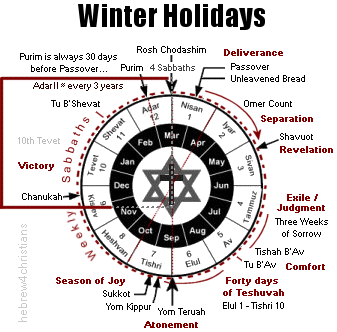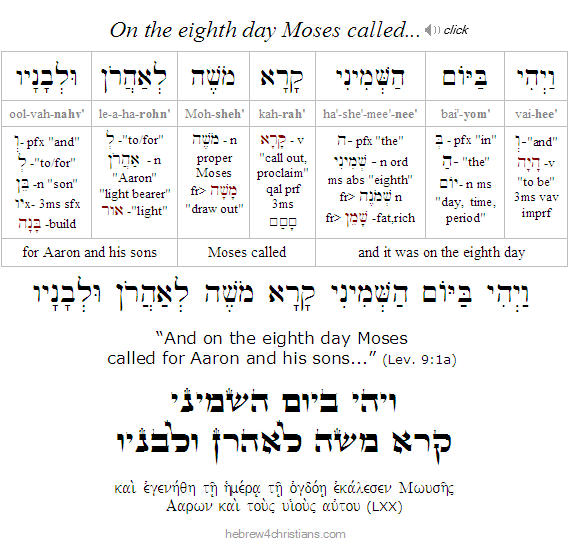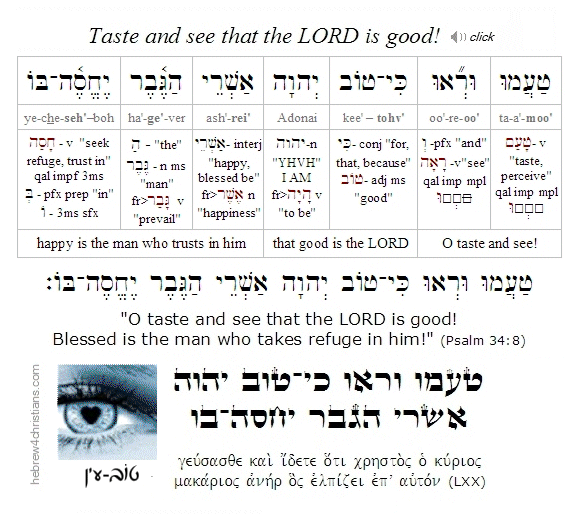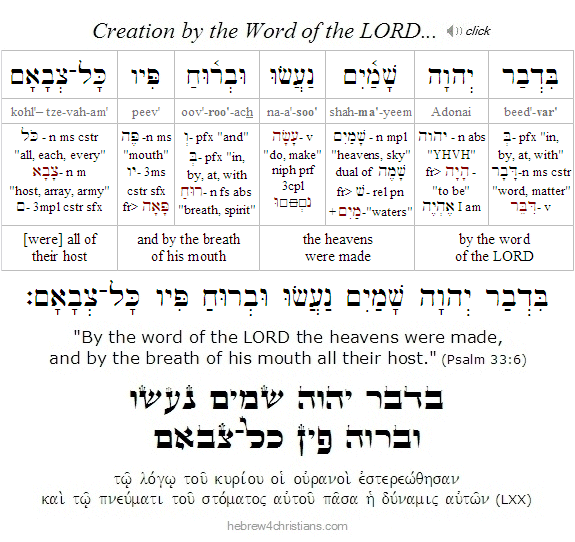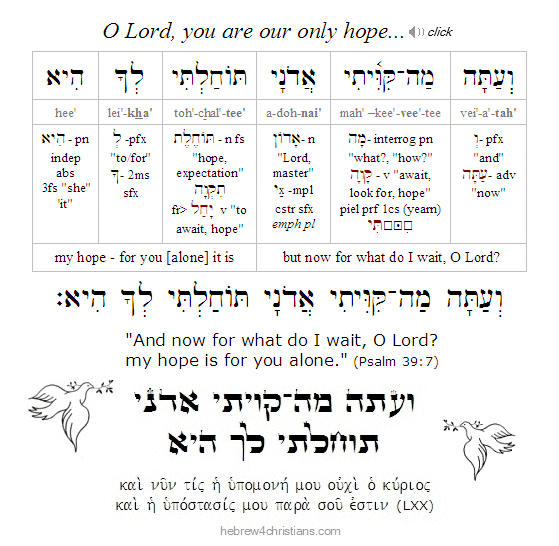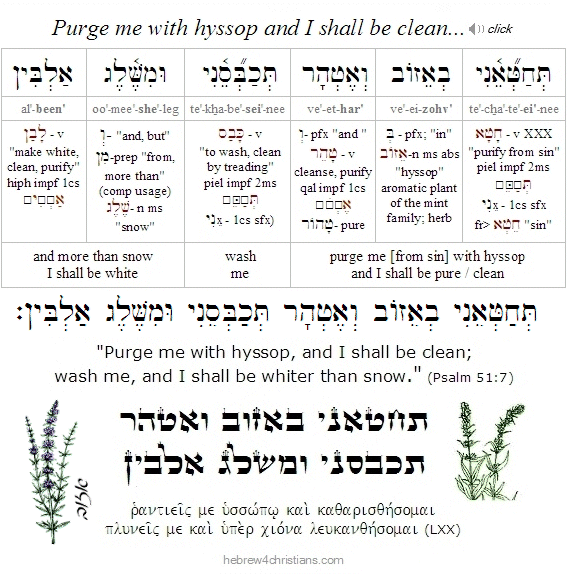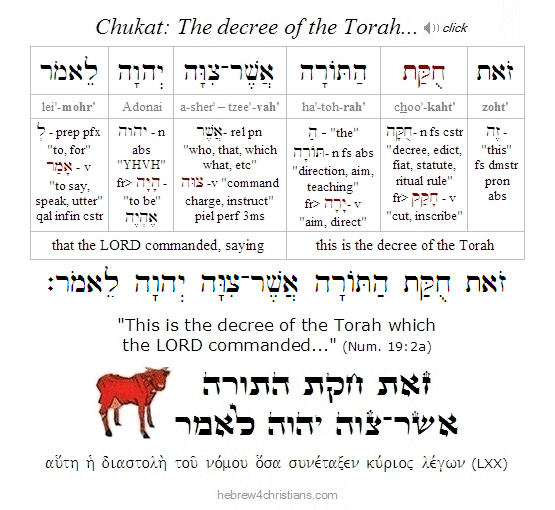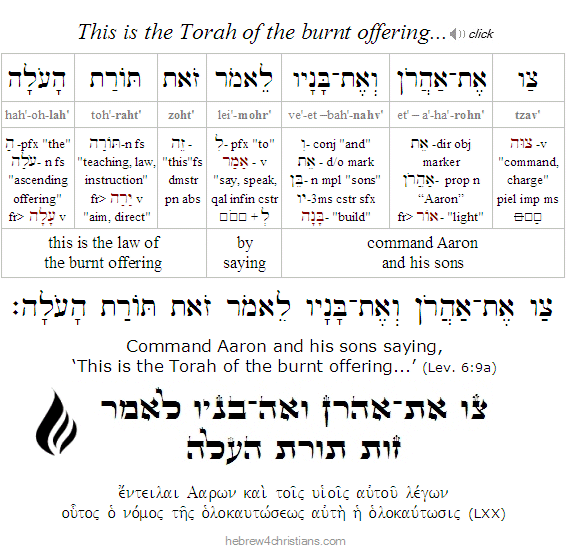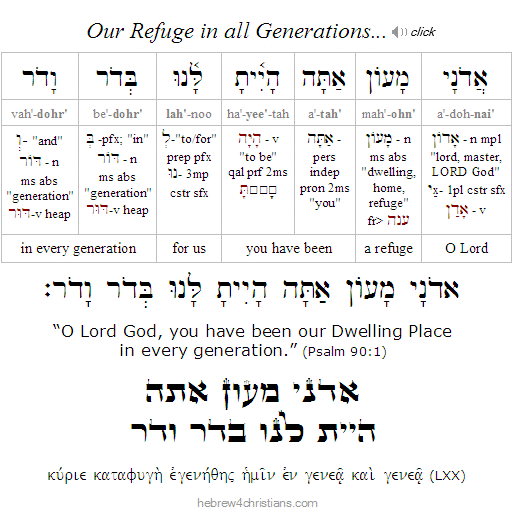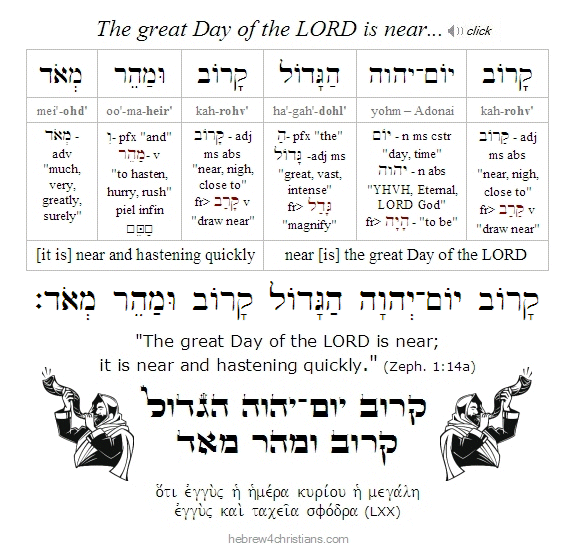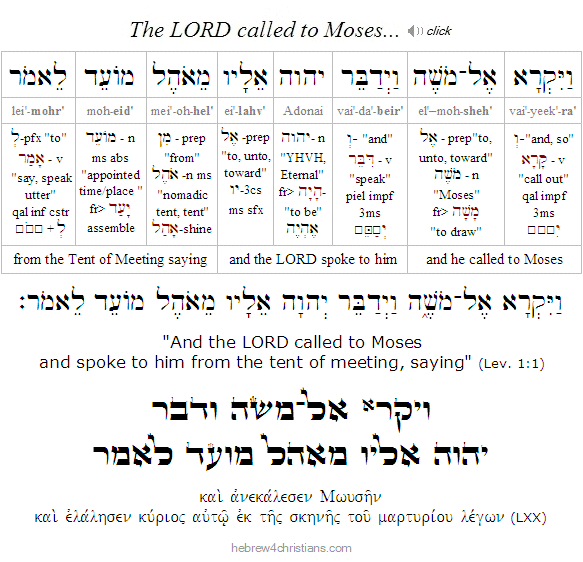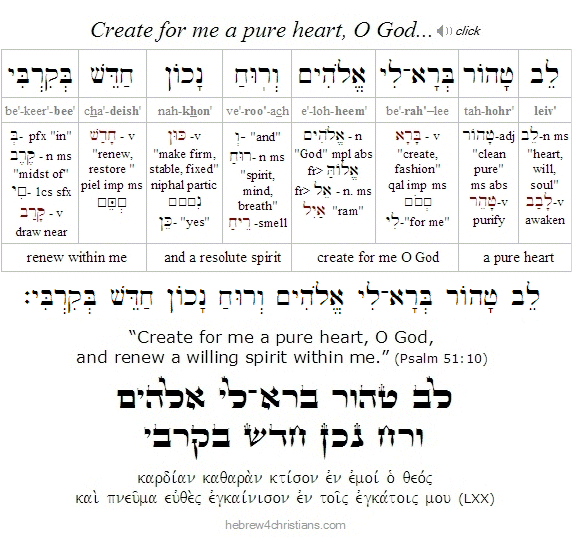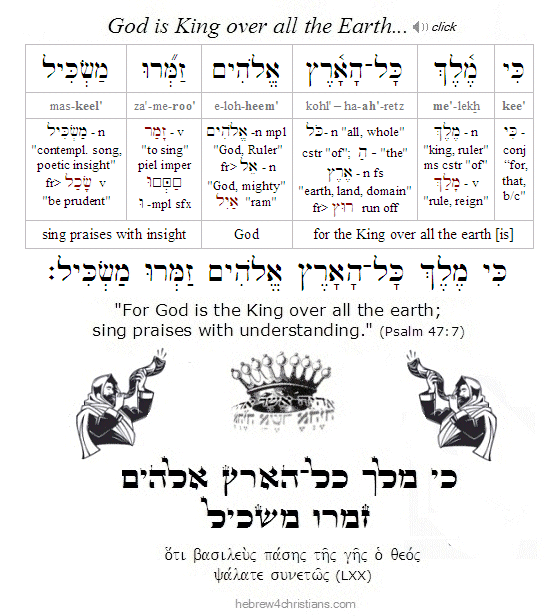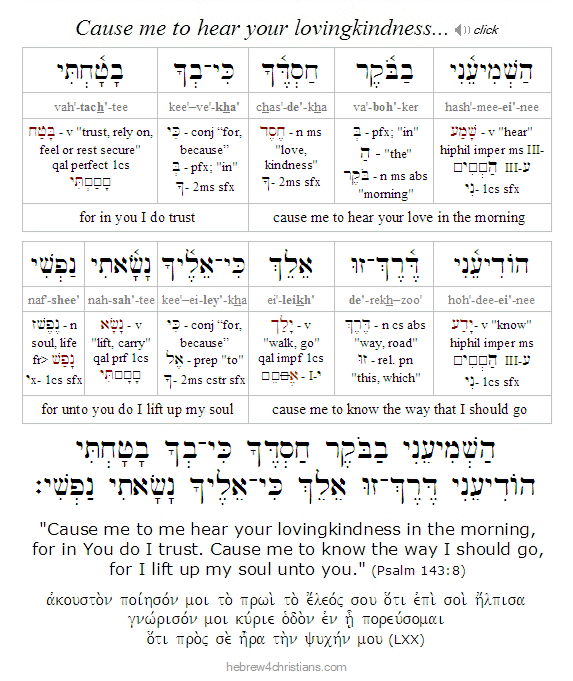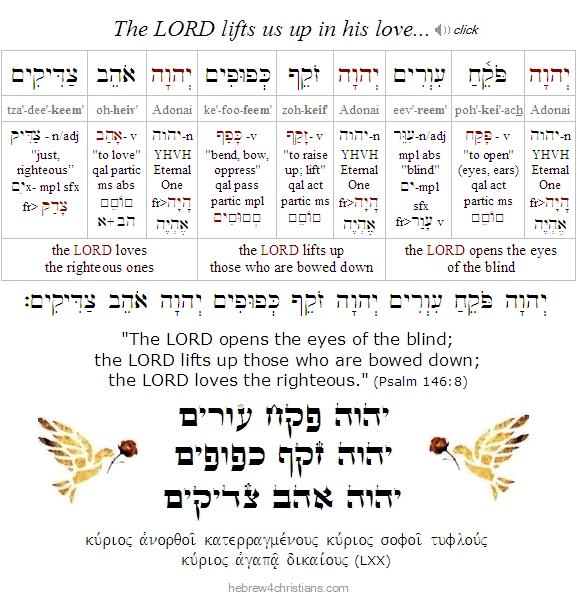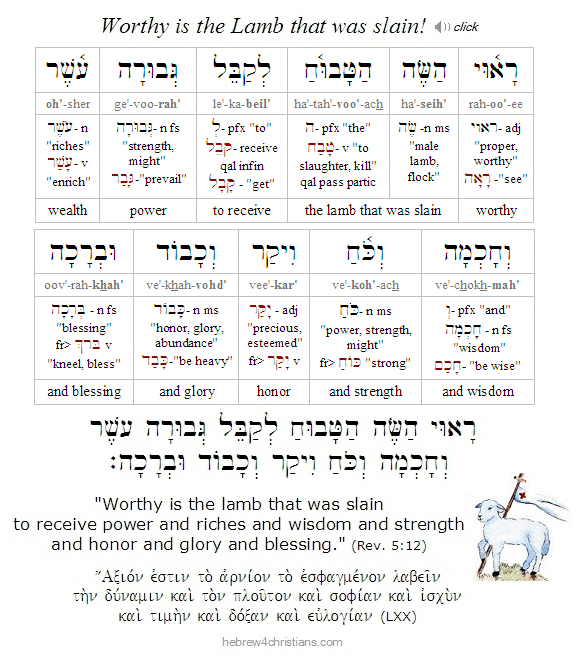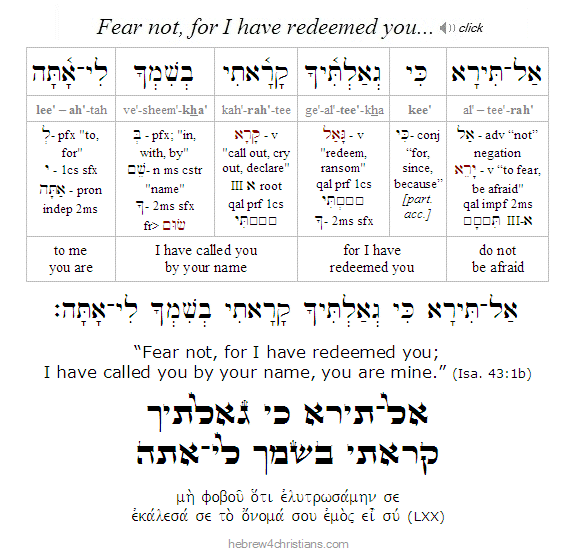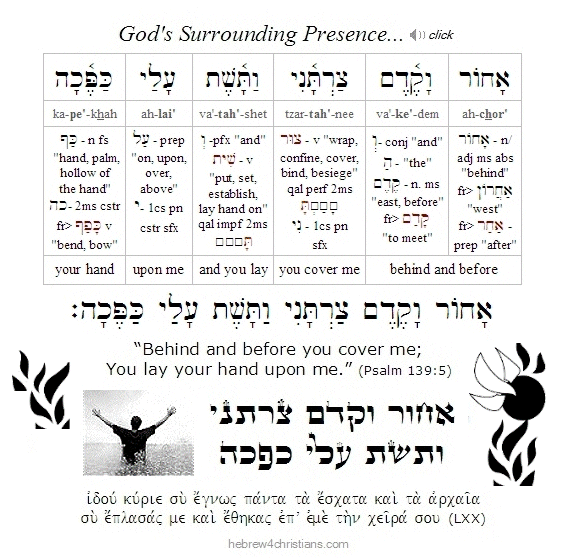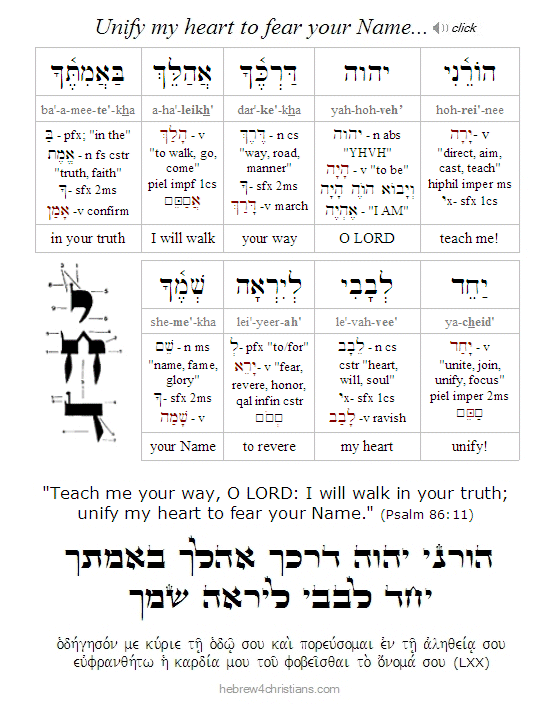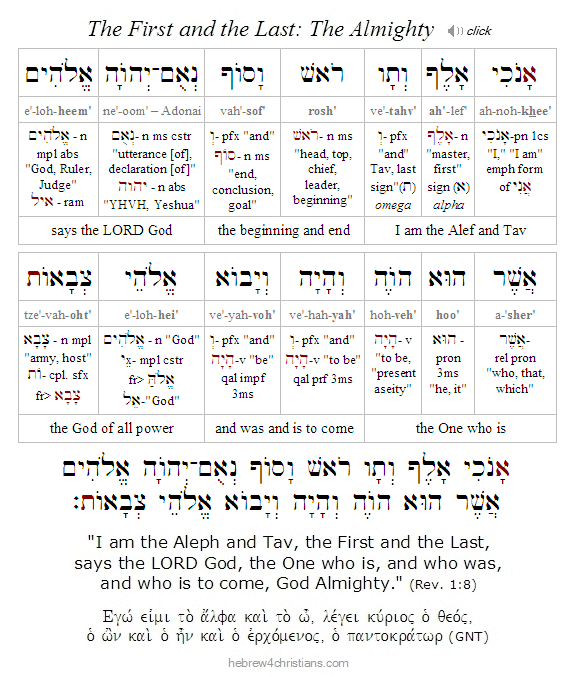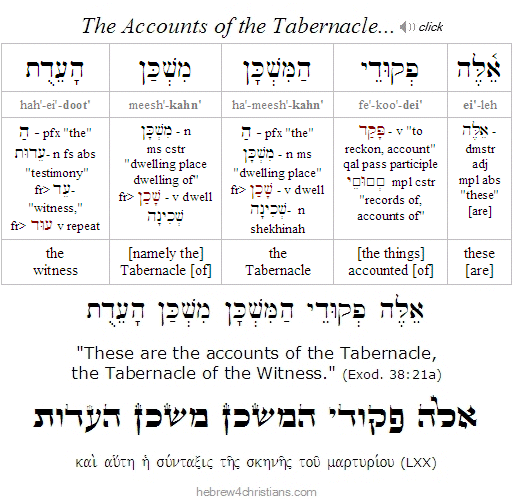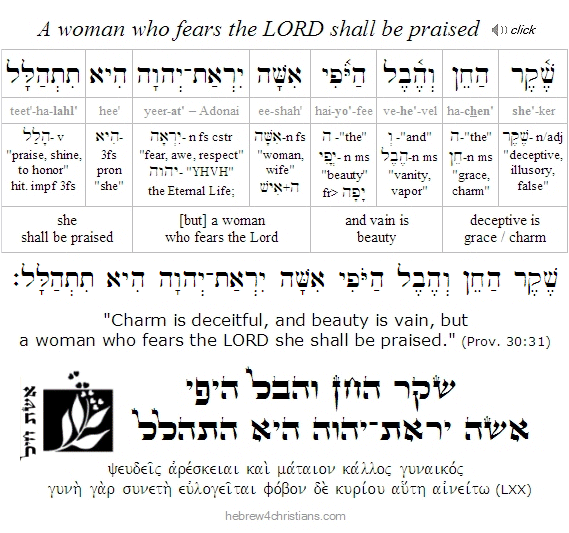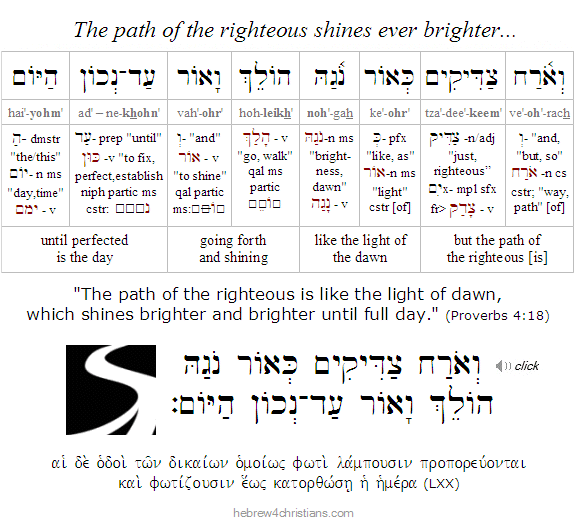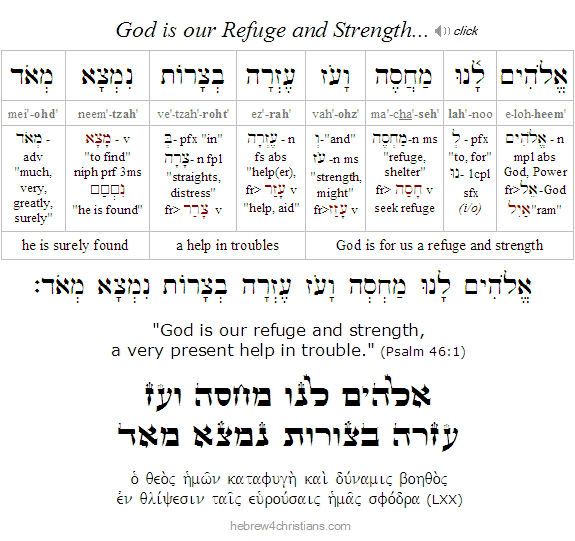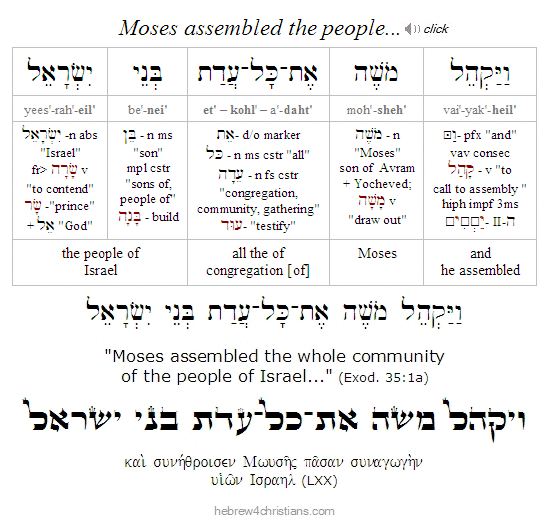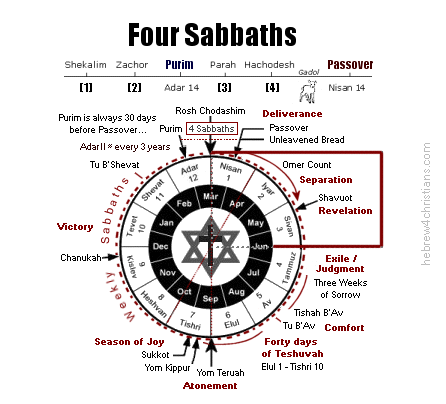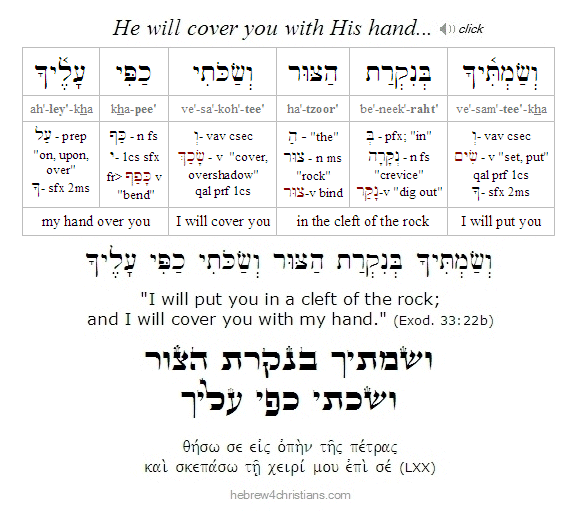|
Jewish Holiday Calendar
For March 2024 site updates, please scroll past this entry....
The winter holidays (חגי החורף) remember special times when God acted on behalf of His people so that they would triumph over their enemies, and therefore they prophetically picture the final victory in the world to come.
The Winter Holidays:
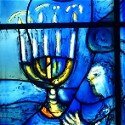
Note that in accordance with tradition, the following holiday dates begin at sundown:
- Month of Tevet (Fri., Dec. 3rd [eve] - Sun. Jan. 2nd [day])
- Month of Shevat (Sun. Jan. 2nd [eve] - Mon. Jan. 31st [day])
- Month of Adar I (Mon. Jan. 31st [eve]) - Wed. March 2nd [day])
- Month of Adar II (Wed. March 2nd [eve]) - Fri. April 1st [day])
 |
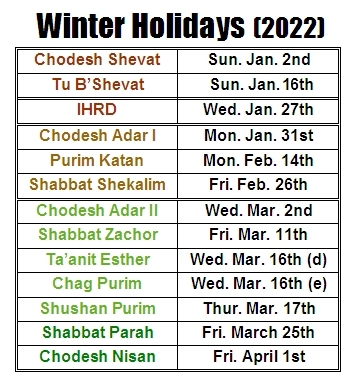 |
Note: Some calendars will list the first day of a holiday without indicating that the holiday actually begins sundown the night before. For more information see the Calendar pages...
March 2024 Updates
Note: If any page content appears to be missing, please refresh the page...
Anticipating Passover:
Shabbat HaChodesh...
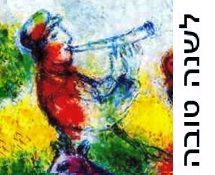
03.31.24 (II Adar 21, 5784) The Biblical New Year begins Mon. April 8th at sundown this year, or Nisan 1 on the Torah's calendar. The LORD set apart Nisan 1 as the "head of the months" of the calendar, called "Rosh Chodashim," which begins the yearly calendar itself (see Exod. 12:1-2). This may seem a bit odd to you since most people regard January 1st as "New Year's Day," though remember that the world runs on a "clock" that operates under assumptions that are different than those revealed in the Scriptures....
The "wisdom of this world" (σοφία τοῦ κόσμου τούτου) is the prevailing cultural spirit that suppresses the reality of God's Presence and truth. Such "wisdom" is regarded as foolishness before God, and God has promised to "seize the so-called wise in their own craftiness" (1 Cor. 3:19). The life of faith, on the other hand, sees what is invisible. Faith (emunah) apprehends "the substance (ὑπόστασις) of things hoped for, the assurance (ἔλεγχος, conviction, "correction," i.e., hokhachah: הוכחה) of things not seen" (Heb 11:1). As the Scripture says, the heart of faith "looks not to the things seen but to the things unseen; for the things that are seen are transient, but the things that are unseen are eternal" (2 Cor. 4:18).
The Sabbath that immediately precedes (and sometimes falls on) the Biblical New Year is called Shabbat HaChodesh (שבת החודש), the "Sabbath of the Month" (of Nisan). This Sabbath is significant because it marks the start of the month of Redemption (i.e., the first month called Nisan) which God called "the beginning of months" (i.e., Rosh Chodashim). We honor this event by reading an additional passage from the Torah concerning the sanctification of the new moon (Exod. 12:1-20), and we spiritually prepare for this month by studying about Passover and the coming spring holidays:
 |
The commandment to sanctify the first new moon of the year (i.e., Rosh Chodashim) reveals that it is our responsibility to sanctify (i.e., observe) Biblical time in general. In other words, when we observe "the beginning of months," we are acknowledging that time itself is rooted in the Biblical calendar with its divinely inspired cycle of festivals (see Psalm 104:19).
Passover in two weeks!
Note that this year the Biblical New Year begins on Mon. April 8th at sundown, and therefore Passover begins exactly TWO weeks later, Mon. April 22nd at sundown:
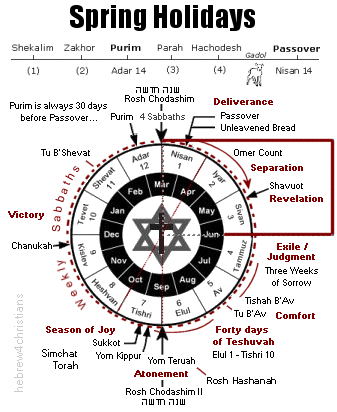 |
Originally Rosh Chodashim was simply called the "first month" because it marked the month of the Exodus and the other months were named in relation to it, similar to the days of the week in the Hebrew calendar (i.e., the first day, the second day...). Later it was called Chodesh Ha-Aviv (חודש חביב) - "the springtime month" (because the calendar is reset in the spring) and later still as Nisan (ניסן), to recall God's faithfulness after the Babylonian Exile (Neh. 2:1; Esther 3:7). So important is this month that the Jewish sage Rabbi Moshe ben Nachman (Ramban) wrote regarding the commandment to observe Rosh Chodashim:
"The verses (Exod. 12:1-2) mean that this month should be counted first, and beginning with it, the count should proceed to the second, the third, and so on, till the end of the sequence with the twelfth month. In this way, this month should be a commemoration of the Great Miracle (i.e., our Redemption), and every time we mention the months, the Miracle will be alluded to. It is for that reason that the months do not have names in the Torah, but rather they are identified by number."
The word Nisan might come from either the word nitzan (ניצן), meaning "bud" (Song 2:12), or the word nissim (ניסים) meaning "miracles," both of which suggest physical and spiritual resurrection in our lives. Others think the word comes from the verb nus (נוּס), meaning "to flee," both in relation to Israel's flight from Egypt and Egypt's flight from Israel (i.e., when the pursuing Egyptian cavalry fled (נָסִים) before the sea closed upon them (Exod. 14:25, 27). We also see this usage in the verse: "The wicked flee (נָסוּ) when no one pursues, but the righteous are bold as a lion" (Prov. 28:1). The devil's power is found in the lie. If he can make you afraid, you will not think clearly. Establishing your faith in the truth will embolden you to deal with the lies and distortions that are intended to enslave you in fear. As Yeshua said, the truth will set you free (John 8:32).
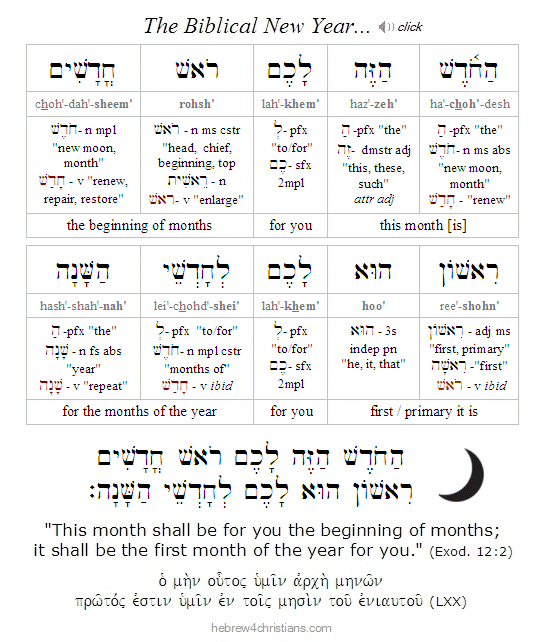 |
The new moon of Nisan is the most significant of the "new moons" of the Jewish calendar since it initiates the first month of the Biblical Calendar - and therefore represents the Biblical "New Year's Day." Of all the various Rosh Chodesh celebrations, then, Rosh Chodesh Nisan is foundational, since it presents the starting point for the cycle of the yearly festivals (mo'edim) that reveal prophetic truths about the LORD God of Israel and His beloved Son, Yeshua the Messiah, blessed be He.
יְהִי רָצוֹן מִלְּפָנֶיךָ יהוה אֱלהֵינוּ
וֵאלהֵי אֲבוֹתֵינוּ
שֶׁתְּחַדֵּשׁ עָלֵינוּ שָׁנָה טוֹבָה וּמְתוּקָה
בַּאֲדנֵינוּ יֵשׁוּעַ הַמָּשִׁיחַ אמן
ye·hee · rah·tzon · meel'·fah·ne'·kha · Adonai · E·loh·hey'·noo
ve·loh·hei · a·voh·tey'·noo
she'·te·cha·desh · ah·leiy'·noo · shah·nah · toh·vah · oo·me·too·kah
ba·a·doh·ney'·noo · Ye·shoo'·a · ha'·mah·shee'·ach [ah·mein]

"May it be your will, LORD our God
and God of our fathers,
that you renew for us a good and sweet year
in our Lord Yeshua the Messiah." [Amen]

Download Study Card
Addendum:
Again, there are two main new years: one in Spring, called Rosh Chodashim, and one in the Fall, called Teruah, or "Rosh hashanah." Both dates, Nisan 1 (spring) and Tishri 1 (fall) divide the calendar into two mirroring halves of each other.
God is prophetically working with the Jewish people and Israel, and therefore we follow the worldwide Jewish calendar because all prophetic events regarding eschatology have to do with Israel and the Jewish people. The LORD has unfinished business with the Jewish people, and he is returning to Jerusalem to establish Zion and fulfill the promises given to the Hebrew prophets of Israel. Amen!
This week's Torah:
Parashat Shemini - פרשת שמיני
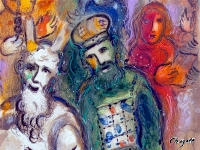
03.31.24 (II Adar 21, 5784) Shavuah tov, chaverim! This week's Torah reading, called parashat Shemini ("eighth"), continues the account of the seven-day ordination ceremony for the priests (as described earlier in Parashat Tzav). During each of these "seven days of consecration" Moses served as the first High Priest of Israel by offering sacrifices and training Aaron and his sons (i.e., the kohanim or priests) regarding their duties at the mishkan (i.e., "Tabernacle"). On the eighth day however, (i.e., Nisan 1), and just before the anniversary of the Passover, Aaron and his sons began their official responsibilities as Israel's priests. In the midst of the dedication, however, tragedy struck as Aaron's sons Nadav and Abihu took it upon themselves to make their own offering before the Holy of Holies of the tent. Since this was not the prescribed means of offering sacrifice, God considered the incense offered to be "strange fire" (esh zarah) and both sons were tragically consumed by fire before the LORD (Heb. 10:29,31). Aaron was required to remaine silent as his sons' bodies were removed by his cousins, and Moses then warned Aaron's two remaining sons, Eleazar and Ithamar, not to mourn during this sacred occasion.
The portion ends with a list of which animals, birds, fish and insects are permitted or forbidden as food, which subsequently provided the framework for Jewish dietary law (i.e., kosher law). The Israelites were permitted to eat any mammal that has both a split hoof and chews its cud (Lev. 11:3). Likewise, only fish that have both scales and fins were to be regarded as kosher. A list of acceptable (i.e., non-predatory) birds was given, along with the commandment not to eat any insects unless they have a pair of jointed legs used for leaping. The dietary laws were intended to sanctify the Israelites by separating them for holiness: "For I am the LORD your God. Consecrate yourselves therefore, and be holy, for I am holy."
Providentially considered, it is no coincidence that the inauguration of the Sanctuary is directly connected to the Passover, since the daily sacrifice of the Lamb (i.e., korban tamid: קָרְבָּן תָּמִיד) served as an ongoing memorial of the Exodus from Egypt (יציאת מצרים) -- and indeed all the laws of sacrifice (תורת קרבנות) form the central teaching of the Torah itself. Reflect upon the fact that the central sacrifice of the Mishkan (i.e., "Tabernacle") was that of a defect-free lamb offered every evening and morning upon the altar in the outer court, along with matzah and a wine offering, signifying the Passover Lamb of God given sacrifice for us. This is called "God's Food" in the Torah (Exod. 29:38-42; Num. 28:4-10; John 1:29).
The Life is in His Blood...
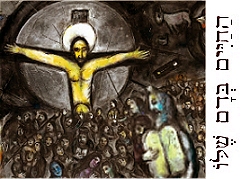
[ The following is related to our Torah reading this week, parashat Tzav... ]
03.29.24 (II Adar 19, 5784) Our Torah portion this week, parashat Tzav, describes various types of sacrifices (korbanot) that were to be offered at the Mishkan. These include the olah (עֹלָה), or whole burnt offering, the minchah (מִנְחָה), or grain offering, the chatat (חַטָּאת), or sin offering, the asham (אָשָׁם), or guilt offering, the shelamim (שְׁלָמִים), or peace offerings, and the todah (תּוֹדָה), or the thank offering (Lev. 7:37-38). In addition, prohibitions regarding eating fat (חֶלֶב) and consuming blood (דָּם) are also given.
Sacrificial blood was to be meticulously controlled, only to be shed through ritual slaughter or "shechitah" (שְׁחִיטָה) at the Mishkan, and carefully collected and sprinkled upon the altar according to prescribed rituals (Lev. 17:1-7). It was forbidden to offer sacrifices in any other place or using any other methods, such as upon a hilltop under the night sky or through pagan mystery rites. Moreover, the consumption of both fat and blood was strictly prohibited: "Whoever eats of the fat of an animal (חֵלֶב מִן־הַבְּהֵמָה) of which a food offering may be made to the LORD shall be cut off from his people. Moreover, you shall eat no blood whatever, whether of fowl or of animal, in any of your dwelling places. Whoever eats any blood, that person shall be cut off from his people" (Lev. 7:25-27).
Since "soul of the flesh" (i.e., nefesh ha'basar: נֶפֶשׁ הַבָּשָׂר) is in its blood, it is regarded as sacred, and the one that eats it is regarded as a "soul eater" who shall be cut off from his people" (נִכְרְתָה הַנֶּפֶשׁ הָאֹכֶלֶת מֵעַמֶּיהָ) The Hebrew word "karet" (כָּרַת) means to be "cut off" from the people of God, a form of "excision" or social ostracism, though some of the sages have said that it literally meant invocation of the judgment of death. For example, Rashi said being "cut off" meant that the person's days would be shortened and that his offspring would die off. A crime that is undetected and never prosecuted also invokes karet judgment, which is a form of punishment meted out by God.
The sages said that while the fat that covers the liver, the kidneys, and the stomach -- called "chelev" (חֶלֶב) -- is prohibited, other animal fat, called "shuman" (שׁוּמָן), may be eaten or used for other purposes (Lev. 3:3; Exod. 29:13). Chelev was sacrificially offered to God from the beginning, when Abel offered the firstlings of his flock and their "fat portions" (Gen. 4:4). Some of the sages have suggested that the prohibition against eating fat was given because it represents the pride, indulgence, and haughtiness of the wicked, as it says in Psalm 17:10, "They are enclosed in their own fat; with their mouth they speak arrogance," and therefore it must be placed on the altar because glory only belongs to the LORD (Psalm 93:1; Jer. 9:24).
The blood, on the other hand, is understood to be the carrier of the soul of the animal (נִשְׁמַת החיה), and therefore it was forbidden to consume or "incorporate" it into the body made in the image of God. This is to "eat the soul," as mentioned above. The law against consuming blood was given from the beginning, before the Sinai revelation, as God judged Cain for shedding the blood of his brother (Gen. 4:10), and God Noah was later instructed about the sanctity of blood as the instrumentality of life and was therefore forbidden from eating it (Gen. 9:4). The blood is the vital principle of the soul, the means of life itself, and therefore it is sacred. It belongs to God alone. Therefore manslaughter is one of the fundamental commandments God gave to Noah as well (Gen. 9:5-6). These earlier prohibitions were repeated in the Mishkan's sacrificial system, and they were later ratified by the disciples of Yeshua at the time of the First Council in Jerusalem regarding Gentile observance of the law (Acts 15:13-21).
The sanctity of blood is at the heart of the idea of "sacrifice" (i.e., zevach: זֶבַח), and therefore it is never to be regarded as "profane" or common. It is the divine "elixir" of life, the soul of the flesh. "I will set my face against that person who eats blood and will cut him off from among his people. For the life of the flesh (נֶפֶשׁ הַבָּשָׂר) is in the blood, and I have given it for you on the altar to make atonement (i.e, kapparah: כַּפָּרָה) for your souls, for it is the blood that makes atonement by the life" (Lev. 17:10-11). Blood is the vital essence of life, and its separation from the flesh results in death. In matters of sacrificial atonement (כָּפָרָת זֶבַח), or korban (כָּפָרָת קָרְבָּן), however, the blood is sacred and reserved for use exclusively upon God's altar. This is an essential point that ultimately points to Yeshua's vicarious death on behalf of the sinner. It is the essence of the "life-for-life" gospel message itself.
In light of the foregoing discussion, however, we may wonder what Yeshua meant when he said, "Truly, truly, I say to you, unless you eat the flesh of the Son of Man and drink his blood, you have no life in you. Whoever feeds on my flesh and drinks my blood has eternal life, and I will raise him up on the last day" (John 6:53-54). Was Yeshua being deliberately provocative by saying something shocking, or was he pointing to a deeper truth about the meaning of his mission? Let's take some time to walk through this...
Remember the basic interpretative principle that "a text without a context is a pretext," which implies that the meaning of a particular passage must be understood from the larger literary environment that determines its sense. When and in what circumstances Yeshua had said these words, then, will help us to better understand what he was saying. And since these words are found in the sixth chapter of the Gospel of John, to get a sense of the context for this particular passage we need to back up and quickly review the five preceding chapters.
The first chapter of John is a prologue that declares the miracle of the incarnation of Messiah, and declares that Yeshua is none other than the eternal God in the flesh (John 1:1-3). He is the "True Light" that has come into the world, the only begotten son ("ben yachid") of the Father (John 1:14, 18), the promised Savior of Israel and indeed of the whole world. He is prophetically attested to be the appointed Lamb of God who takes away the sins of the world.
Following this majestic prologue, testimony is given of the miracles and words of Yeshua. In chapter 2 we read about a wedding party in Cana where Yeshua turned water into wine, revealing His glory. Afterward he began his public ministry by going to Jerusalem and driving out merchants from the Temple, declaring that his body was the true Temple of God (John 2:21). The fame of Yeshua grew as performed various miracles and many believed in him.
In chapter 3, a prominent leader of the Pharisees named Nicodemus heard of the miracles of Yeshua and ventured to visit him at night. Yeshua wasted no time by explaining to him that he needed to "born again" in order to see the Kingdom of God. He explained to Nicodemus that he needed to get past his "natural biases" and to think in spiritual terms. "That which is born of the flesh is flesh, and that which is born of the Spirit is spirit, so do not marvel that I said that you must be born again" (John 3:6-7). He further explained that just as Moses lifted up the serpent in the desert to save those plagued with death, so the Son of Man would be lifted up, so that all who believe in Him would not perish but have everlasting life. Everyone who looks to the Son and believes in him shall find eternal life (John 3:14-16).
In Chapter 4 Yeshua encountered a "Samaritan" woman at the well of Jacob and revealed himself as the source of "Living Water" (i.e., mayim chaim: מַיִם חַיִּים) and the Messiah of Israel (משיח ישראל). After disabusing her cultural beliefs, Yeshua told her that salvation comes from the Jews, and he reminded her that those who worship God must do so "in spirit and truth." The woman was so impressed she went back to her town, testifying about Yeshua, and many Samaritans came to believe in him. The chapter concludes with Yeshua performing a second miracle in Galilee, healing a royal official's son, which resulted in his household coming to faith.
In chapter 5 Yeshua healed a paralytic man at the Bethesda mikveh pool on the Sabbath day, resulting in a "religious" conflict with the Jewish leaders who then conspired that he should be put to death (John 5:16-18). Yeshua defended his action by declaring his unity with the Father as therefore was exercising his authority to give life and to make divine judgment. He then proclaimed that whoever hears his message and believes that God sent him has eternal life; that he will not come into judgment, but has passed from death to life (John 5:24). He rebuked the spurious religious leaders: "You search the Scriptures, for in them you think you have eternal life; but it is these very Scriptures that testify of me," and he further said "if you believed Moses, you would believe me; for he wrote of me" (John 5:39, 47).
Now after reviewing some of the general context, we come to chapter 6, where Yeshua taught that he is the "Bread of Life" (לֶחֶם הַחַיִּים) and made the astounding claim that "unless you eat the flesh of the Son of Man and drink his blood, you have no life in you" (John 6:53). Note that the chapter begins with Yeshua crossing over from Galilee to the eastern side of the lake as a great multitude of people followed after him, hoping to be healed or perhaps to witness a miracle. Yeshua then went into the high country there and sat with his disciples. The text says it was near the time of the Passover so perhaps many of the crowd were pilgrims for the festival (John 6:4). When Yeshua saw the gathering crowd, however, he rhetorically asked Philip, one of his disciples, where they could buy bread to feed all the people. After saying that he could only find five barley loaves and two fish, Yeshua instructed his disciples to have the people sit down, and after reciting the blessing, he distributed the loaves and fish to the disciples who then gave them to the people, and the food supply miraculously multiplied until everyone had eaten their full.
Once the crowd realized that a great miracle had happened, they clamored to take Yeshua by force to make him king, but Yeshua departed to the mountain alone, and the disciples later left by boat to return to Capernaum without him. A storm arose, however, and the disciples were in jeopardy. Suddenly they saw Yeshua walking on the water approaching them. When they received him into the ship, the vessel immediately came to the land where they had been heading. The following day the crowd caught up with Yeshua and they asked why he had left. Yeshua replied saying "you seek me, not because you saw signs, but because you ate your fill of the loaves. Do not work for food that spoils, but for food that endures to eternal life, which the Son of Man will give you" (John 6:26-27). This is the spiritual food (אוכל רוחני) that comes from believing in Yeshua; this food is given through the work of faith (John 6:28-29).
As we read this it becomes apparent that the crowd could not fathom what Yeshua was saying, despite having previously witnessed his miracle of feeding 5,000 people, so they brazenly asked for yet another sign to validate his message. After all, Moses gave the people manna from heaven, so why shouldn't Yeshua do so as well?
Yeshua replied by first correcting their thinking. Moses had not given the bread from heaven, but God did, and that is meant by "the bread from heaven," and then he identified himself as the true bread from heaven (הַלֶּחֶם הָאֲמִתִּי מִן הַשָּׁמַיִם), "Living Bread" (לֶחֶם הַחַיִּים) that imparts spiritual and eternal life (John 6:35-36). Note also that when Yeshua said "I am the bread of life" he was using the "ehyeh" Name of God (אֶהְיֶה), the "I AM" utterance of God's revelation to Moses (Exod. 3:14). For Yeshua, true bread from heaven is his flesh (לֶחֶם מִבְּשָׂרוֹ) which he gives for the life of the world (John 6:51), which restates the famous message of the crucifixion given earlier in the gospel: "For God so loved the world that He gave his only Son, that whoever believes in him would not perish but have everlasting life" (John 3:16).
Yeshua's message to the crowd was an earnest appeal to have faith. The one who believes in Him has eternal life, and this corresponds to "eating the Bread of Life," that is, partaking of the spiritual food (i.e., truth) that Yeshua gives. As St. Augustine of Hippo once said: "For to believe in Him is to eat the living bread; he that believes eats; he is sated invisibly."
"I am the living bread which came down from heaven. If anyone eats of this bread, he will live forever; and the bread that I shall give is My flesh, which I shall give for the life of the world" (John 6:51). It may be wondered why Yeshua switched the metaphor from eating manna to eating his flesh, and why he (more shockingly) spoke of drinking his blood, which was utterly forbidden in the Torah (Lev. 7:25-27). Yeshua continued: "Most assuredly, I say to you, unless you eat the flesh of the Son of Man and drink His blood, you have no life in you. Whoever eats my flesh and drinks my blood has eternal life (חַיֵּי עוֹלָם), and I will raise him up at the last day. For my flesh is real food (מַאֲכָל אֲמִתִּי), and my blood is read drink" (מַשְׁקֶה אֲמִתִּי). Now are these words of hyperbole meant to shock the people into engaging his message, or was Yeshua using a deeper symbolism to make his point? The language here is indeed figurative, as we have seen, and therefore we need to find a spiritual application to Yeshua's teaching.
At this point a few things seem clear. First, we find eternal life by being in a faith-relationship with Yeshua. Because he took on human flesh and shed (i.e., gave) his blood for us, we are given divine life as we partake of his gift. Based on this (and numerous other Scriptures), the result of believing in him is the same as "eating his flesh and drinking his blood," that is, participating in or joining his life. Second, Yeshua was clearly using metaphorical and spiritual language, and forgetting this will bring confusion. Regarding those who were offended at his teaching, he said: "It is the spirit that gives life (הָרוּחַ הִיא הַמְחַיָּה); the flesh is of no help at all. The words that I have spoken to you are spirit and life" (John 6:63). Upon hearing this, some who seemed to be Yeshua's disciples could not make the step of faith to see beyond the offence here and they therefore decided to no longer follow him. Yeshua then asked his twelve disciples whether they too wanted to go away. Peter then confessed: "Lord, to whom can we go? You have the words of eternal life. We have come to believe and know that you are the Holy One of God" (John 6:67-69).
If you will not eat the flesh and drink the blood of Yeshua, you have no life in you, or, using the "logical contrapositive" we can validly rephrase this by saying, if you have life, then you will eat and drink the life of the Lord. To eat Yeshua's flesh and blood means to utterly depend upon him; it means trusting him for your life and destiny itself. Remembering the Lord's sacrifice for us - whether through weekly kiddush (communion) or during the Passover Seder - is to "feed on him" through the heart of faith. Amen. Yeshua is the answer for our hunger for life. As he promised: "I am the bread of life. Whoever comes to me shall never hunger; and whoever believes in me shall never thirst" (John 6:35).
During his last Passover Seder with his disciples before his death, Yeshua identified the broken matzah (i.e., yachatz bread) with his body, and the Cup of Redemption (i.e., kos ha'geulah) with his shed blood to signify the new covenant with God (Matt. 26:26-28). This is the basis of our "communion" with the Lord, and this is perhaps the key to understanding the distinction between the Torah's prohibition of consuming blood and Yeshua's commandment to do so. For the Mishkan and its ordinances were a "pattern" or "shadow" of something yet to come, namely, the incarnation of Yeshua as Immanuel (עִמָּנוּ אֵל), "God with us," who would substantiate the true meaning of the sacrifices through his avodah (priestly service). The physical "tent of meeting" became his flesh and blood to dwell among us.
The very first time the word "blood" (דָם) occurs in the Scriptures concerns the death of Abel, the son of Adam and Eve who was murdered by his brother Cain. After Abel's blood was shed, the LORD confronted Cain and said, "What have you done? The voice of your brother's blood is crying to me from the ground" (Gen. 4:10). Since blood is the carrier of life, it bears the energy and vitality of life: it has its own spiritual "voice." Likewise, the blood of Yeshua (דַּם ישׁוע), the true Lamb of God who died upon the cross, "speaks" on our behalf in intercession, and reverses the power of death by creating a barrier that death can no longer cross, since the death of the sacrificial victim "exchanges" the merit and power of life.
Unlike the blood of Abel that "cries out" for justice, the blood of Yeshua cries out for mercy (Heb. 12:24). Putting our trust in the provision of God's sacrifice causes His wrath (or righteous judgment) to pass over while simultaneously extending love to the sinner.... This is the essential message of the gospel itself, that we have atonement through the sacrificial death, burial, and resurrection of Yeshua our Savior, the great Lamb of God (שׂה האלהים). As Yeshua said, "I tell you the solemn truth, the one who hears my message and believes the One who sent me has eternal life (חַיֵּי עוֹלָם) and will not be condemned, but has passed over (i.e., μετά + βαίνω, lit., "crossed over" [עָבַר]) from death to life" (John 5:24). Just as God's judgment passes over from life to death on my behalf; so His love passes over from death to life on my behalf... The medium for this exchange is the body and blood of Yeshua, and this is the deeper meaning of eating his flesh and drinking his blood. The life of God is in His blood.
The metaphor of eating his flesh and drinking his blood is paradigmatic of Yeshua's entire ministry and message. It is a climactic summary. His words will seem paradoxical and even blasphemous to those who regard him as a merely human teacher, but they force the issue of faith regarding the efficacy of his atoning sacrifice for us. Yeshua pointed to his flesh and blood sacrifice on the cross to be the means of life - a message anathema to human pride.
Whenever you eat or drink something, you take it in, you receive it, and in a sense it becomes a part of you. Eating Yeshua's flesh means receiving his presence as being "for you," that is, given on your behalf. It is to partake of his presence as the source of your life. Drinking Yeshua's blood means sharing the power of his life, receiving it as life-giving spiritual energy. "For the life of the flesh (נֶפֶשׁ הַבָּשָׂר) is in the blood, and I have given it for you on the altar to make atonement (כַּפָּרָה) for your souls, for it is the blood that makes atonement by the life" (Lev. 17:10-11). We have life because of the blood of Yeshua was given on our behalf. Hallelujah! Let us rejoice in our Savior Yeshua! The life of God is in His blood...
Hebrew Lesson
Psalm 34:8 reading (click for audio):
Note: I wrote this post in a bit of a rush. It seems like there is never enough time to cover everything in the weekly Torah portion, especially during holiday season! If you detect any typos, etc., -- thank you for your patience. Shabbat shalom. - John
Word Became Flesh...

[ The following is related to our Torah reading this week, parashat Tzav.... ]
03.29.24 (II Adar 19, 5784) Our Torah portion this week (i.e., Tzav) begins, "The Eternal (יהוה) spoke to Moses" (Lev. 6:8), which paradoxically refers to God as if He is a man... Theologians sometimes call this sort of language "anthropomorphism," though it clearly anticipates the great Incarnation itself, when the Timeless and Infinite One became embodied in time and space in the person of Yeshua. Indeed Yeshua is called the "Word of God" who became flesh and "tabernacled" in our midst (John 1:1,14). "All things were made by Him and without Him was not anything made that was made" (John 1:3). And just as the Angel of the LORD (מַלְאַךְ יְהוָה) mediates the Divine Presence to the heavenly host, so Yeshua mediates the Divine Presence to humanity as the "Son of Man" (בֶּן־הָאָדָם). "For the Eternal One who said, 'Let light shine out of darkness,' has shone in our hearts to give the light of the knowledge of His glory in the face of Yeshua the Messiah" (2 Cor. 4:6).
In the Book of Hebrews we read that "in these last days God has spoken to us ἡμῖν ἐν υἱῷ," which literally means God speaks in the language "of Son" (Heb. 1:2). The Eternal speaks as the One who emptied Himself to become one of us, who clothed himself in our humanity, so that he could touch us, empathize with us, and to ultimately die for our atonement as the "Lamb of God."
Hebrew Lesson
Psalm 33:6 Hebrew reading (click):
Passion's Inner Fire...
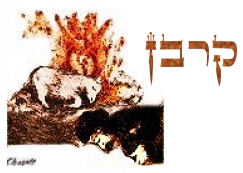
[ The following is related to our Torah reading this week, parashat Tzav. Please read the Torah portion to find your place here... ]
03.29.24 (II Adar 19, 5784) "This is the law for the burnt offering (olah): it is what ascends on the hearth of the altar all night long, until morning..." (Lev. 6:9). In a Sefer Torah (i.e., handwritten Torah scroll), the Hebrew word for "hearth," or the floor of the altar's fireplace, is mokdah (מוֹקְדָה), traditionally written by the scribes using a miniature letter Mem (מ). The Kotzker Rebbe comments that since the altar symbolizes inner life, the smaller Mem teaches that the fire in one's soul should be understated - that it should burn within as an steady inner passion - not with flash, ostentation, or flamboyance. People sometimes get confused and think that passion for God means hype, loud music, ostentatious rituals, and so on, though it was steady "inner fire" that moved Yeshua to remain focused to endure the cross.
Hebrew Lesson
Psalm 39:7 Hebrew (click):
Dear friends, the Lord has not taken us this far only to abandon us now... He has solemnly promised never to leave nor forsake us (Deut. 31:8; Isa. 41:10; Heb. 13:5). There is wonderful joy ahead, even though you have to endure many trials for a little while (1 Pet. 1:6). Therefore let your heart of faith give thanks to the LORD, for His love and mercy endure forever. Shalom and every blessing be yours in Yeshua...
The Humility of Truth...
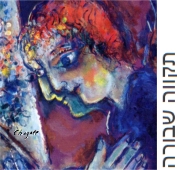
03.28.24 (II Adar 18, 5784) An honest person is invariably a humble person, since honesty compels the heart to confess the truth that it is quite often ignorant, incapable of understanding even the simplest matters of life, and entirely powerless to heal itself... People may argue over words, concepts, and abstractions, inflating their opinions above even the Reality they purport to define, but the humble soul acknowledges that he doesn't really know much about anything... And if "all the efforts of the human mind cannot exhaust the essence of a single fly," then how is it that people get puffed up and proud regarding their supposed knowledge of life itself? It is far better to approach life in deep reverence, wonder, love, and childlike trust than to profess your dogma based on pride and illusions...
To a visitor who described himself as a seeker after Truth the sage said, "If what you seek is Truth, there is one thing you must have above all else." "I know," said the man, "an overwhelming passion for it." "No," the sage replied, "rather an unremitting readiness to admit you may be wrong."
Ours is an age marked by suspicion, arrogance and severely impaired thinking. Gone are the days of respectful dialog and the use of intelligence and logic. The self-styled deconstructionists of today are emotionally incontinent solipsists who are so self-absorbed that they cannot tolerate any dissent from their own narrative and perspective. They are lost to themselves because they lack self-transcendence. In general the so-called "intellectuals" today have nothing to offer other than despair, anger, and veiled threats of violence.
Sadly the postmodern derangement syndrome has affected even established disciplines such as medicine and science, where opinion has been politicized and dogmatized for the sake of economic interests (i.e., worldly power). Be careful of those who think they have all the answers; beware of those who think they know better than others what is best for them! As C.S. Lewis forewarned: "Of all tyrannies, a tyranny sincerely exercised for the good of its victims may be the most oppressive....Those who torment us for our own good will torment us without end for they do so with the approval of their own conscience. To be "cured" against one's will and cured of states which we may not regard as disease is to be put on a level of those who have not yet reached the age of reason or those who never will; to be classed with infants, imbeciles, and domestic animals" (God in the Dock).
It has been wisely said that "education is the process of turning cocksure ignorance into thoughtful uncertainty." Intellectual humility means admitting to the humbling reality that we all have biases and blind spots and therefore we may be mistaken. Such humility is an intellectual mark of grace, since it is willing to allow others their own perspectives while we work through our own convictions and truth claims. The difference between a real scientist and a fraud is that the real scientist will question his or her conclusions and be tentative in declaring the implications of his research, whereas the fraudulent scientist will irrationally demand that his or her ideas be accepted without question.
"Into this pond were flushed the ashes of some four million people. And that was not done by gas. It was done by arrogance, it was done by dogma, it was done by ignorance. When people believe that they have absolute knowledge, with no test in reality, this is how they behave. This is what men do when they aspire to the knowledge of gods." Science is a very human form of knowledge. We are always at the brink of the known; we always feel forward for what is to be hoped. Every judgment in science stands on the edge of error and is personal. Science is a tribute to what we can know although we are fallible. In the end, the words were said by Oliver Cromwell: "I beseech you in the bowels of Christ: Think it possible you may be mistaken." (Jacob Bronowski)
We all walk by faith, but faith (by definition) implies that we do not have all the answers in front of our eyes. "We see through a glass darkly," and that means we should respect the deep complexity that is bound up in all things, and furthermore that we should acknowledge that we are still learning, still growing, still seeking the truth for our lives. Those who refuse to concede their own fundamental ignorance regarding most things in life are fooling themselves. "God opposes the proud, but gives grace to the humble" (James 4:6; Prov. 3:34).
Let me add that regarding matters of faith we cherish the truth of revelation and regard it of utmost concern, but this means knowing from a place of real humility, for what do we truly know of the unseen world and of the heavenly power? You may profess perfect doctrine and yet exist untruthfully, whereas you might not have perfect doctrine, but exist truthfully. The devil knows how to quote Scripture, and often does so, but is a devil still. We must follow the path of peace, even if that requires that we "overlook" some of our doctrinal convictions for the sake of love. I don't mean we should throw away our principles, God forbid, but we rather hold them with an inward passion that is at the same time willing to be overlooked, to suffer, to be misunderstood, and even to be mistreated by others. The key here is not to indulge in self-pity or resentment, which does ud no good. And above all we ask God for divine wisdom. God is faithful and true; if we ask Him for bread, he won't give us a stone (Luke 11:11).
Hebrew Lesson
Proverbs 3:34 reading (click):
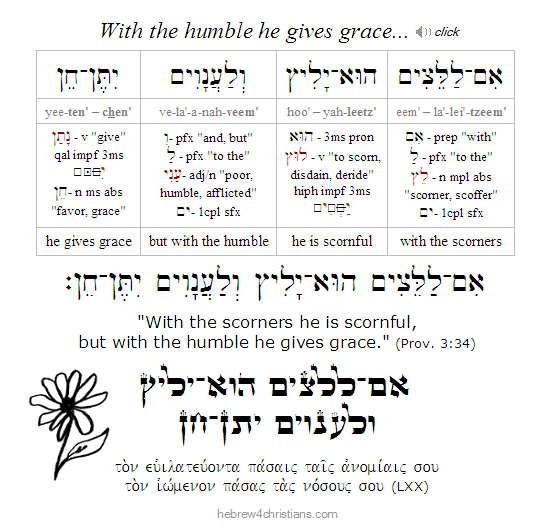 |
Personal note: I have been very distracted by various troubles lately and I humbly ask for your prayers. I am also working on a new article on the parasha that I hope to post sometime later today. Shalom and love to you my dear friends. - John
The Tenth Red Heifer...
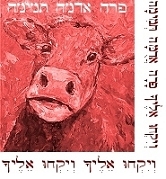
[ This coming Shabbat is called "Shabbat Parah," the Sabbath of the [red] Cow." Besides reading the regular Torah reading (i.e., Tzav), we read about the mysterious red heifer sacrifice.... ]
03.27.24 (II Adar 17, 5784) Longstanding Jewish tradition says there were nine Red Heifers (parot hadumot) offered so far on behalf of the Jewish people. The first was offered by Moses and Eleazar; the second by Ezra the Scribe; two more were offered by Simon the Righteous and another two by Yochanan the High Priest; a seventh was offered by the prophet Elijah; the eighth by Hanamel the Egyptian, and the ninth by Yishmael the son of Piabi (15-16 AD). The tradition says that the tenth (and final) Red Heifer will be burned by the Messiah at the time of the rebuilding of the future Temple (Mishnah, Parah 3:5).
Many well-meaning Christians get excited over occasional reports that a new Red Heifer has been born, understanding this to be a sign from God that the time to rebuild the Jewish Temple is at hand. But should a Red Heifer be found and later sacrificed, how should we regard this -- especially in light of the Brit Chadashah and its clear teaching that Yeshua is the substance of the what the shadow of the Red Heifer represents?
It is important to remember that the red heifer that will be used for the Third Temple (i.e., the "Tribulation Temple") is of prophetic interest but of no real consequence, since Yeshua is the Substance of the Red Heifer who cleanses us from the impurity of death... Yeshua will indeed establish the Temple of Ezekiel's vision during the Millennial Kingdom after His return in glory, but that is not to be confused with the Third Temple of acharit ha'yamim ("end of days").
For more information about the Red Heifer sacrifice, see the "Gospel of the Red Cow" article as well as the "Tenth Red Heifer" page.
Hebrew Lesson
Psalm 51:7 reading (click):
Substance of Hope...
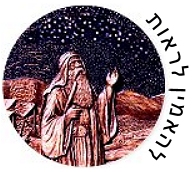
03.27.24 (II Adar 17, 5784) "Faith is the foundation (i.e., ὑπόστασις: the "substance," reality, underlying essence, etc.) of hope, the conviction of the unseen... Without faith it is impossible to please God, for whoever would draw near must believe that God exists and rewards (μισθαποδότης) those who seek him" (Heb. 11:1,6).
Note that God is pleased when we seek his presence, that is, when we when we look past the ephemera and ambiguity of the phenomenal world for the truth about spiritual reality (2 Cor. 4:18). For our part, faith resolves to confession (ὁμολογέω), that is, aligning our perspective and focus to agree with the revelation and message of divine truth and verbally declaring our conviction. We must say that we believe, and affirm it with all our heart (Rom. 10:9). As it says, "I will make Your faithfulness known with my mouth" (Psalm 89:1).
When you encounter tribulation, or experience some crisis of faith, reaffirm aloud: "I believe in God's promise..." Physically expressing your faith is itself an act of faith, and this encourages your soul to trust in God's healing reward even in the present struggle or darkness. "Seek the LORD and His strength; ask for His Presence at all times" (Psalm 105:4).
Hebrew Lesson
Psalm 105:4 Hebrew reading (click):
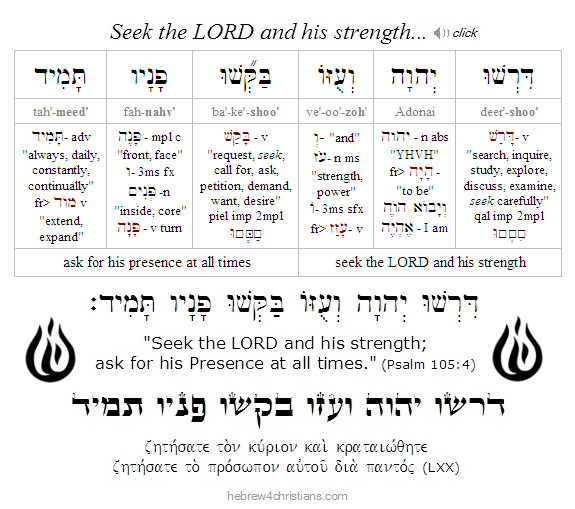 |
Your Reason for Being...
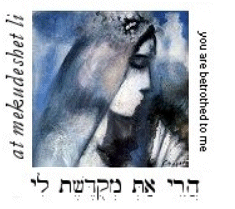
03.27.24 (II Adar 17, 5784) From our Torah reading for this week (i.e., parashat Tzav) we read: "This is the thing that the LORD commanded you to do, so that the glory of the LORD may appear to you: Draw near to the altar and offer your sin offering and your burnt offering and make atonement for yourself" (Lev. 9:6-7).
In this connection, have you considered why you were born into this world? What is your purpose, destiny, and end? The Torah states that you were personally created by Almighty God, who breathed out the breath of life (נִשְׁמַת חַיִּים) into you, and then redeemed your life so you could know the glory of God and spiritual reality. As it is written: "Worthy are you, our Lord and God, to receive glory and honor and power, for you created all things, and by your desire they existed and were created" (Rev. 4:11).
God creates all things for his glory and purposes, which indeed is the first blessing recited over the bride and groom in a traditional Jewish wedding: בָּרוּךְ אַתָּה יְהוָה אֱלהֵינוּ מֶלֶךְ הָעוֹלם שֶׁהַכּל בָּרָא לִכְבוֹדו / "Blessed are you Lord our God king of the universe, who has created all things for his glory." The purpose of life is to know and love God, to walk in His light and truth, and to glorify his compassion and grace forever...
At a traditional Jewish wedding the groom places the ring on his bride's finger and says: Harei, at mekudeshet li: "Behold, you are betrothed to me." Love and holiness are interconnected, since the beloved is set apart as sacred and treasured. May God help us see the wonder of His love for our lives: "Do not be conformed to the passions of your former ignorance, but as he who called you is holy, you also be holy in all your conduct, since it is written, "You shall be holy, for I am holy" (1 Pet. 1:14-16). Amen, the essence of holiness is God's love...
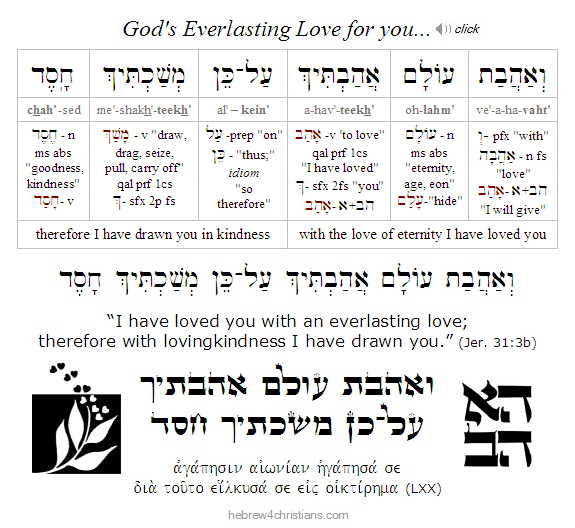 |
Expelling the Darkness...
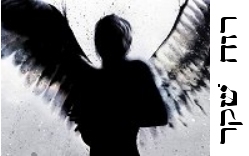
[ "For our struggle is against spiritual forces of evil..." Eph. 6:12 ]
03.26.24 (II Adar 16, 5784) Human life is a battleground of forces, and each person is engaged in a spiritual war for the healing of their soul. Often we are not willing to enter the battle until we have been sufficiently wounded by our own sins: many of us have to become "sick of being sick" until we are ready to seriously engage the underlying issues...
The battle is not optional and there is no place of neutrality or indifference. We must learn to deal with our own inner struggle against evil. Before we can help others to be free, however, we must be free ourselves, and that means learning how to expel the darkness hidden within our own hearts and to walk in God's light. Deliverance means being set free from that which "possesses" us, and that includes the demonic strongholds of fear, anger, envy, lust, and so on. Overmastering impulses can lead the soul to dark thoughts, self-alienation, shame -- a tenuous existence of subjugation and pain. The way of deliverance is to "name the demon," that is, to challenge the ground it claims and to exercise divine authority over our hearts. Above all this means being honest about our struggle and taking a decisive stand against our own oppression... Fighting the "good fight of faith" means caring enough to be healed...
We can only face the demonic if we are willing to be honest with ourselves, for without genuine honesty we cannot see our condition. "A little leaven leavens the whole lump" (Gal. 5:9). We must be willing to confess that there is much within us that remains unhealed, and that we are often unmindful of what really motivates our behavior. Even those things we might suppose as good - our religion or our self-control, for example - can possess us in ways that bring harm to ourselves and others....
When Yeshua expelled the demonic, the afflicted soul was given inner peace and put into their "right mind" (Mark 5:15). In other words, deliverance from madness is linked to God's healing influence in our lives: "For God has not given us a spirit of fear, but of power, and of love, and of a sound (safe) mind" (2 Tim. 1:7). Note that the word translated "safe" comes from the verb sodzo (σῴζω), meaning to be healed from destructive inner conflict. A delivered person has "inner balance" and is not easily overthrown by his conscious (or unconscious) passions. Such a person is grounded in reality: he knows who he is, what he needs, and is realistic about what he can and can't do. His soul is not divided but rather unified, centered, and focused. He is consciously present and accepts life without resistance.
Yeshua gives us "authority" over the demonic to heal (Luke 9:1). The Greek word translated authority is "eksousia" (ἐξουσία), a compound formed from the preposition ek- (ἐκ), meaning "out of," and the noun ousia (ουσία), meaning "being" or substance, thereby suggesting power over physical and spiritual reality. Another way to understand the word, however, is to see it as the ability to see beyond the realm of the transient abide within the realm of the Eternal. The Father represents the unseen, the infinite, the supreme providential and transcendental aspects of the One true God, just as the Son represents the seen, the finite, the suffering and immanent aspects of God... They are One (similarly the Holy Spirit is the Spirit of God, and therefore is One with God). Yeshua was entirely submitted to the will of the Father, which means he was able to let go and trust in the all-encompassing Divine Presence. His life was grounded in his relationship with the Eternal: "He that has seen me has seen the Father" (John 14:9). Since Yeshua lived in complete unity or "oneness" with God, he was completely centered and fully conscious of his identity as God's Son. His authority came from being properly aligned or related to God the Father, that is, ultimate reality, which enabled him to be a vessel or conduit for the expression of God in the world.
The Scriptures state: "Yield yourselves to God; take a stand against the devil and he will flee from you" (James 4:7). We first ground ourselves in what is real - surrendering and accepting the given moment - and then we decisively refuse to be taken captive by our imagination, fear, lust, etc. When we turn to the light the darkness will be expelled (John 1:5). Let's choose life and therefore live (Deut. 30:19); let's take our stand against the powers of hell; let's repudiate our fears and "spiritually slay" whatever seeks to drive and control us. May our hearts grow quiet before the Divine Presence and abide in peace...
Hebrew Lesson
Joel 2:32a Hebrew reading (click):
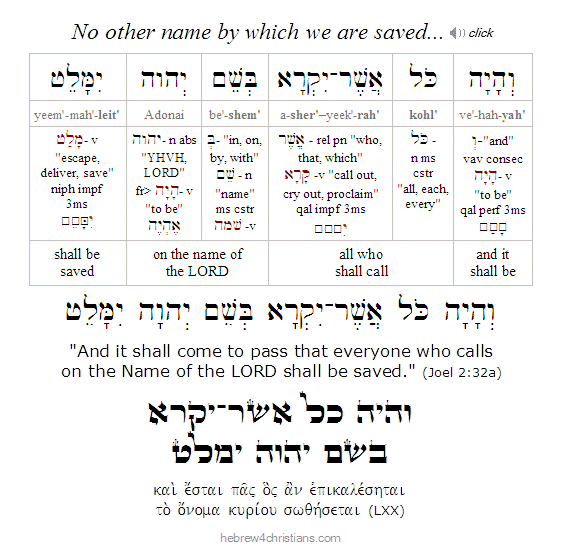 |
The Torah of Faith...
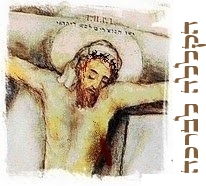
03.25.24 (II Adar 15, 5784) Regarding the intensely existential question of living by faith, Soren Kierkegaard once wrote, "The easiness of Christianity is distinguished by one thing only: by the difficulty. Thus the Master's yoke it easy and its burden light -- for the person who has cast off all his burdens, all of them, the burdens of hope and of fear and of despondency and of despair -- yet it is difficult." Soren here undoubtedly speaks in ironic understatement. Casting off all your burdens - categorically every last one of them - is more than difficult, but simply impossible apart from the miracle of God's intervention within your heart. Ultimately the miracle that changes you is that you come to truly believe (John 16:31).
Sins can be like great possessions that are difficult to give up. Among other things, we must forgive ("give away") our sins (both our own and those against us), and that means trusting God enough to bear our wounds for us. Forgiveness allows us to move on with our lives by letting go of the pain of the past (2 Cor. 5:16). It is seemingly "easy" to understand this, but it is difficult, nay it is impossible, to truly live it.
The message of the cross is scandalous to human pride because it reveals that it is impossible to save ourselves. This is the great stumbling block: to meaningfully confess the truth of our inner loss. We trust Yeshua's finished work performed on our behalf -- the miracle -- and have no confidence in our own supposed works of righteousness (John 6:29).
Nevertheless, because with God all things are possible, and in light of the miracle of salvation, the Torah of Yeshua (תּוֹרַת יֵשׁוּעַ), does include some commandments, including the following:
- "Thou shalt believe thou are my beloved - entirely accepted and entirely forgiven."
- "Thou shalt forget the shame of thy past."
- "Thou shalt stop thinking of your sin but rather of My great remedy for you."
- "Thou shalt let me carry your woundedness far away, yea, to the bottom of the sea."
- "Thou shalt live in My love and be filled with its spirit."
- "Thou shalt believe your end will be good, and that love is stronger than justice."
- "Thou shalt fear nothing but that which causes you to lose hope in My love."
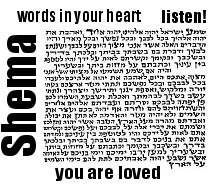 |
The difficulty, I repeat, is to genuinely believe that the love's miracle is for you - and that therefore you really are a "new creation" in the Messiah (2 Cor. 5:17). The reason this is difficult is because we are still living in an "already-not-yet" place of exile, the "two-souled" state of being that only is able to "see through a glass darkly." We are trusting in God, yet we must "work out" our own salvation with fear and trembling (Phil. 2:12). But notice that we "work out" what God has already "worked in," since it is "God who works in you both to will and to do His good pleasure" (Phil. 2:13). Please do not miss this - God first works His love into our hearts, and then we are able to express that in works of love... From start to finish, only genuine faith in Yeshua performs the "work of God" (John 6:28-29), and never our own ludicrous efforts of affecting self-righteousness (Titus 3:5). If you are lacking in the fruit of the Spirit (i.e., the works of God), then the right approach is to turn around and confess your faithlessness: "Lord, I believe; help Thou my unbelief..." (Mark 9:24). Our LORD is near to the brokenhearted and saves the crushed in spirit (Psalm 34:18).
Some people might argue that you must "deny yourself" and "die to yourself" to exercise genuine faith, and while it is indeed true that "unless a seed falls to the ground and dies, it abides alone" (John 12:24), we must remember that the Seed is Yeshua and the power of His Spirit sown in the heart of faith. "Taking up the cross" therefore means so identifying with Yeshua that you are "in union" with his sacrificial death offered up on your behalf. God imparts a new spiritual nature (i.e., heart and spirit) to the one that trusts in Him, an operation of the Spirit that is more manifest than the sun that shines in the clear noonday sky... Taking up the cross is therefore the confession that Yeshua's sacrifice is all-sufficient and therefore all that remains is to continue to trust in his finished work (John 6:29). We are sanctified in exactly the same way we are justified -- by trusting in the miracle of God. Remember, all the imperatives of Scripture are addressed to the "new man" that has been brought to life by God's grace. We are able to obey when we yield to the Torah of the Spirit of Life (תוֹרַת רוּחַ הַחַיִּים) in the Messiah, which is to say, when we are trusting in Yeshua to do and to be all that we will ever need. We do not "die to ourselves" by means of our own efforts, but instead rest in the peace of Yeshua's sacrificial death (and resurrection) for us.
Hebrew Lesson
Psalm 55:22 reading (click):
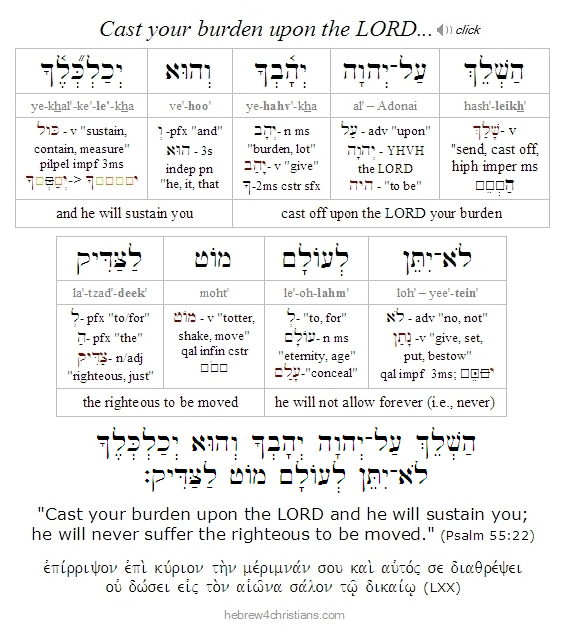 |
Note that the seven (inferred) commandments above are derived from various Scriptures. See Isa. 54:8; Jer. 31:3; Isa 54:4; Jer. 31:34; Heb. 8:12; Isa. 41:10; 45:22; Rom. 4:25; Psalm 103:10-14; John 14:1,27; Mic. 7:19; Isa. 38:17; John 14:21; 15:5,10; Gal. 5:22-23; 1 Cor. 13; 1 John 3:1; Rom. 8:28-39; Psalm 89:14; 85:10; Luke 11:42; 1 John 4:18, etc.).
Affirming the Light...
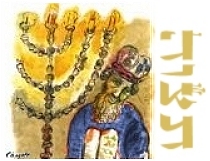
[ "O house of Jacob, come and let us walk In the light of the LORD" - Isaiah 2:5 ]
03.25.24 (II Adar 15, 5784) From our Torah for this week (i.e., Tzav) we read: "The fire on the altar shall be kept burning on it; it shall not be extinguished" (Lev. 6:12). The sages say do not read "burning on it" but rather "burning in him" (בּוֹ), referring to the heart of the priest. And where the Hebrew text says "it (i.e., the fire) shall not be extinguished" (i.e., לא תכבה), read instead "extinguish (תִכְבֶּה) the negative (לא)" by trusting in God's promise for our good, despite any temporary setbacks or apparent failures.
The Holy Spirit imparts the fire of faith that fills our hearts with hope, affirming with "tongues of fire" words of life and light that vanquish darkness. As it is written: "Light dawns in the darkness for the upright; He is gracious, full of compassion, and righteous." (Psalm 112:4).
זָרַח בַּחשֶׁךְ אוֹר לַיְשָׁרִים
חַנּוּן וְרַחוּם וְצַדִּיק
zah·rach · ba·choh'·shekh · ohr · lai·shah·reem
cha·noon · ve·ra·choom · ve·tza·deek

"Light dawns in the darkness for the upright;
He is gracious, full of compassion, and righteous."
(Psalm 112:4)
Download Study Card

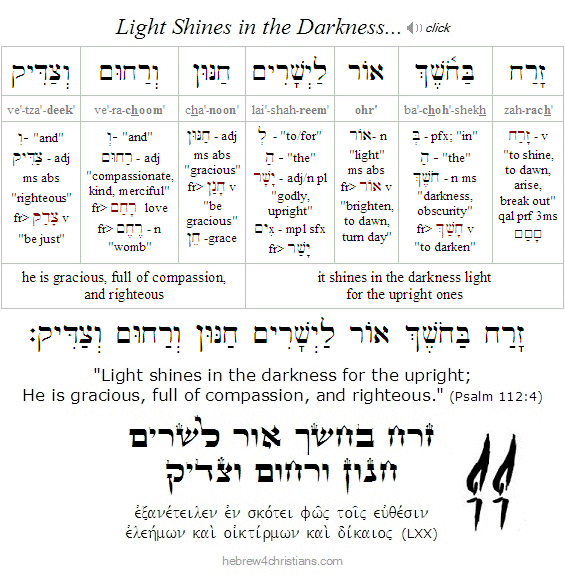
Spiritually speaking, the first step is to find hope... The Divine Light is seen by means of the eye of faith (עין האמונה), and therefore we find strength by trusting in God's Presence, even though we cannot presently see Him (2 Cor. 4:18; 5:7). "Trust in the LORD with all your heart, and do not lean on your own understanding. Know Him in all your ways, and He will straighten your paths. Be not wise in your own eyes; fear the LORD, and turn away from evil" (Prov. 3:5-7). Wait on the LORD and He will strengthen your heart....
We must keep courage, remain steady as we fight the good fight of faith. As it is written, "The LORD is my light and my salvation; whom shall I fear? The LORD is the stronghold of my life; of whom shall I be afraid? When evil men attack me to devour my flesh, when my adversaries and enemies attack me, they totter and fall. Even if an army is deployed against me, I do not fear; even if war is rises against me, I remain full of trust" (Psalm 27:1-3).
The Midrash says, "The Holy One Himself, as it were, made light for the upright. Thus it says, "The LORD is my light and my salvation" (Psalm 27:1) and "When I sit in darkness, the LORD will be a light to me" (Micah 7:8). While I sit in darkness in this world, during these latter days before the promised return of Yeshua, when troubles may afflict me and lawlessness may abound – then God's light will shine brighter still, for the LORD is gracious to all who put their hope in Him, and this favor and love will be manifest for me.
Let us affirm our confidence: The darkness of this world forever is swept back before the overmastering radiance and power of Yeshua, the King of Glory, the Root and Descendant of David, and the Bright Morning Star (Rev. 22:16). Those who believe in Him are given the "light of life" that overcomes the darkness of this world (John 8:12).
 |
Sabbath of the "Red Cow"

[ This coming Shabbat is called "Shabbat Parah," the Sabbath of the [red] Cow." Besides reading the regular Torah reading (i.e., Tzav), we read about the mysterious red heifer sacrifice.... ]
03.25.24 (II Adar 15, 5784) The Sabbath that immediately follows Purim is called Shabbat Parah - the "Sabbath of the [red] Cow." In traditional synagogue services, two Torah scrolls will be removed from the ark, and from the first scroll will be read the Torah portion for the week (e.g., Ki Tisa), and from the second will be read the chapter regarding the laws of the sacrifice of the "Red Heifer" (Num. 19:1-22). The early sages decided to recite the laws of the Red Heifer at this time to recall the remedy of the sin of the Golden Calf, and to remind the people to purify themselves before coming to Jerusalem for the pilgrimage festival of Passover. It is thought that since the sprinkling of the "waters of separation" cleanses from the uncleanness of death, reading this portion will help prepare our hearts for the time of Passover when we celebrate deliverance from death.
The Red Heifer offering is considered a paradox to most Jewish thinkers, though it can be seen as a revelation of the Yeshua our Messiah. The paradox is that the one who offers this sacrifice becomes ritually impure, while the sprinkling of the ashes is used to make people clean... The ritual is considered chok within the Jewish tradition, meaning that it makes no rational sense. The Talmud states that of all the 613 commandments given in the Torah, even King Solomon with all his wisdom could not fathom this decee. However, the sacrifice of Yeshua the Messiah can be understood as the fulfillment of the symbolism of the parah adumah. Both were entirely rare and without defect (sin); both were sacrificed "outside the camp"; both made the one who offered the sacrifice unclean but made the one who was sprinkled by it clean; and finally, both sacrifices cleanse people for priestly service.
The parah adumah had to be a perfect specimen that was completely red, "without blemish, in which there is no defect (mum)." The rabbis interpreted "without blemish" as referring to the color, that is, without having so much as a single white or black hair. This is the only sacrifice in the Torah where the color of the animal is explicitly required. Moreover, the parah adumah was never to have had a yoke upon it, meaning that it must never have been used for any profane purposes.
Unlike all other sacrifices offered at the altar, the parah adumah was taken outside the camp and there slaughtered before the priest, who then took some of its blood and sprinkled it seven times before the Mishkan (thereby designating it as a purification offering). [During the Second Temple period, the High Priest performed this ceremony facing the Temple while atop the Mount of Olives.] Then the red heifer would be burned in its entirety: its hide, flesh, blood, and even dung were to be burned (unlike other Levitical korbanot). Unlike other offerings, all the blood of the sacrifice was to be burned in the fire.
Hyssop, scarlet yarn, and a cedar stick would then be thrown upon the burning parah adumah (these same items were used to cleanse from tzara'at, skin disease). In other words, the blood was assimilated into the ashes of the sacrifice, which were then gathered and mixed with water to create the "water of separation" (mei niddah) for the Israelite community. Note that the word "separation" (niddah) refers to menstrual impurity and harkens to Zech. 13:1: "On that day there shall be a fountain opened for the house of David and the inhabitants of Jerusalem, to cleanse them from sin and from niddah."
Anyone (or anything) that came into contact with a corpse (the embodiment of sin and death) was required to be purified using the mei niddah. The purification procedure took seven days, using stalks of hyssop dipped into the water and shaken over the ritually defiled person on the third day and then again on the seventh day. After the second sprinkling, the person undergoing the purification process would be immersed in a mikvah and then be unclean until the following evening.
According to Jewish tradition, the Red Heifer sacrifice was to atone for the sin of the Golden Calf, though the Torah itself does not make this association. The LORD Yeshua, our High Priest of the New Covenant, is the perfect fulfillment of the Parah Adumah, since he was completely without sin or defect (2 Cor 5:21; John 8:46); he was sacrificed outside the camp (Heb 13:13); he made himself sin for us (2 Cor 5:21); his sprinkling makes us clean (1 Pet 1:2; Heb 12:24; Rev 1:5); and the "water of separation" that his sacrifice created is the means by which we are made clean from the impurity of sin (Eph 5:25-6; Heb 10:22).
Hebrew Lesson
Num. 19:2a Hebrew (click):
Note: The red heifer to be used for the Third Temple (i.e., the false "Tribulation Temple") is of prophetic interest but of no real consequence... Yeshua will establish the Fourth Temple of Ezekiel's vision during the Millennial Kingdom after His return in glory.
For more information about the Red Heifer sacrifice, see the "Gospel of the Red Cow" article as well as the "Tenth Red Heifer" page.
Ordained by the Lamb:
Parashat Tzav - פרשת צו
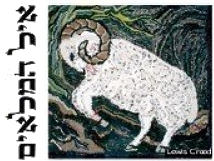
03.24.24 (II Adar 14, 5784) Shavuah tov, chaverim! Our Torah reading for the Sabbath immediately following the holiday of Purim is called parashat Tzav, where we learn how the first priests of Israel were consecrated for service by the blood of the lamb. First Aaron and his sons were washed with water, arrayed in priestly garments, and anointed with holy oil. During this ordination ceremony, a sin offering and burnt offering were offered on their behalf, and then a special "ram of ordination" (i.e., eil hamilu'im: איל המלאים, lit. "ram of abundance [מָלֵא]") was slaughtered. Some of this ram's blood was applied to the right ear, right thumb, and big toe of the Aaron and his sons (a picture of Yeshua as our suffering High Priest), and the rest of the blood was dashed upon the sides of the altar. After its slaughter, Moses took some unleavened bread and put it in the hands of the priests to perform tenufah (a wave offering) before the altar (a picture of the resurrection).
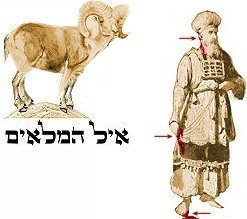 |
As followers of Yeshua, we too have been anointed with the blood from the "Ordained Lamb" -- Yeshua as our Kohen Gadol of the better covenant (Heb. 8:6). And we too have been anointed with the sacred shemen (oil) that symbolizes the presence and aroma of the LORD in our lives. As followers of Yeshua we are therefore truly "...a chosen race, a royal priesthood, a holy nation, a people for his own possession, that you may proclaim the excellencies of him who called you out of darkness into his marvelous light" (1 Peter 2:9). As Yeshua said: "You did not choose me, but I chose you and appointed you that you should go and bear fruit and that your fruit should abide, so that whatever you ask the Father in my name, he may give it to you" (John 15:16). May the God of Israel be pleased to help you serve Him in the truth...
Our Refuge in all Generations...
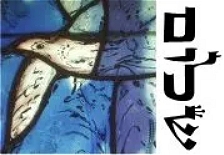
03.22.24 (II Adar 12, 5784) Don't let worry blind you to God's ongoing care; don't live as those without faith. You have a place in your Father's heart; you have a share in his house above. See the Lord as your Dwelling Place "in all generations"; behold his unchanging glory despite the fleeting shadows of this world.
We must first look to the Eternal to rightly see the finite; we must look upward before we look downward. As we contemplate God's Eternality and power, we realize the wonder and sanctity of our short time here. The Eternal is our refuge, our "dwelling place," in all generations, and that means in the present generation as well, on the other side of fleeting appearances of this world. When we pray to God as Avinu She-bashamayim, "Our Father in Heaven," we are calling to the One who (ש) is in the midst of the waters (מים) of Life.
The psalmist says (Psalm 118:17): "I shall not die but live." In order to live you must give yourself to death, but when you have done so, you discover that you are not to die, but live. "Giving yourself to death" means surrendering to God's will, accepting the yoke of heaven, and trusting in His governing "flow" over all of creation. This is the deeper meaning of "baptism" as we are immersed into God's care for us. Yeshua gives us abundant life.
The bloom of every flower is by eternal purpose, and not one common sparrow is forgotten by your Heavenly Father (Luke 12:6). God's irresistible providence comprehends and orders all things, from the realm of the subatomic to the cosmic motions of the heavenly bodies. The Lord is the Center of reality: "All things were created by Him, and for Him, and in Him all things hold together" (Col. 1:16-17). In light of this, Blaise Pascal asked, "What is left for us but to unite our will to that of God himself, to will in him, with him, and for him the thing that he has eternally willed in us and for us." In other words, what else can we do but learn to trust, accept, and to say "yes" to life – even if at times we may feel like strangers in exile... All our days are ordained; recorded in God's scroll. Therefore may God "teach us to number our days to get a heart of wisdom" (Psalm 90:12). So don't lose heart, friend; He who cares for you is a Good Shepherd, and you shall dwell in the house of the LORD forever.
Shabbat shalom, Purim Sameach, and love to you all...
Hebrew Lesson
Psalm 90:1 reading (click):
The Gospel of Leviticus...
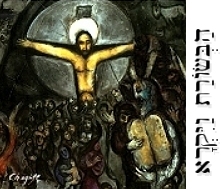
[ The following is related our Torah reading for this week, parashat Vayikra... ]
03.22.24 (II Adar 12, 5784) From a "macro" or high-level view, we can understand the book of Leviticus to provide a spiritual map that points the way to connect with God. It was written to speak to our need and desire to enter into the holy space of his reconciliation...
Recall that the book of Genesis explains our origin, the fall of our souls into sin and our subsequent alienation from God. It also foretold of the coming Redeemer who would heal us from our fallen estate and establish the kingdom of God upon the earth.
The book of Exodus further reveals the LORD as our Deliverer who saves us from bondage to olam hashkerim (עוֹלָם הַשְׁקְרִים), the false world, and who then graciously leads us to freedom by awakening our souls to divine truth.
The Exodus from Egypt (יציאת מצרים) serves as a parable of the salvation experience (Rom. 15:4; 1 Cor. 10:11). First, faith in God's promise is expressed by sheltering under the blood of the lamb of God as a "passover" sacrifice (as it was with Abel's offering), and through it we are delivered from the plague and curse of death. We are then graciously led by the Spirit of God through the waters into newness of life when we begin our journey to our true homeland. We begin to understand the covenant promise to be God's people. The revelation at Sinai pulls back the curtain of the phenomenal world to disclose the underlying and overarching spiritual reality. Hearing the divine voice imprints us with God-consciousness. We are awed and overwhelmed with the divine presence and desire to enshrine it within our hearts forever.
The building of the Mishkan (Tabernacle) "reifies" the vision to create a habitation of the divine Presence. It embodies our gratitude to God. As Solomon later said as he dedicated the Temple in Jerusalem, however: "Will God indeed dwell on the earth? Behold, heaven and the heaven of heavens cannot contain You. How much less this Temple which I have built! Yet regard the prayer of Your servant and his supplication, O Lord my God, and listen to the cry and the prayer which Your servant is praying before You today" (1 Kings 8:27-28). Nevertheless, the desire to know God to be present calls for a sacred place to be made within the heart...
And this is what the book of Leviticus, or Vayikra, is really about: hearing the call of God to draw near to Him. Therefore the Mishkan was structured with inner chambers or "gateways" that led ever closer to the throne of God himself. We come to the first gate by faith: the Curtain of the courtyard is opened and we enter. We see the outer altar where the Lamb of God was continually offered, reminding us of the original sacrifice and promise given at Eden. We wash ourselves at the basin and enter the Holy Place where we behold the divine light of the Menorah. We eat of the "bread of Presence" (לֶחֶם פָּנִים) and offer prayer at the golden Altar of Incense. At the appointed time, we reverently open the veil to enter the Holy of Holies, appealing to the blood offered on our behalf to make atonement for breaking God's heart. In a cloud of smoke we descry the blood sprinkled seven times over the broken tablets stored in the sacred Ark. We confess the Name of the LORD and sense His blessing and acceptance...
The great lesson of Vayikra is that God delivers us so that we can know his heart. And this is the message of the Cross of Messiah as well -- the great Altar of God, the Tabernacle "made without hands," where Yeshua entered the Holy of Holies to offer up his blood in intercession for our brokenness (Heb. 9:11-12). Amen, and may His Name forever be praised.
Hebrew Lesson
Psalm 26:8 reading (click):
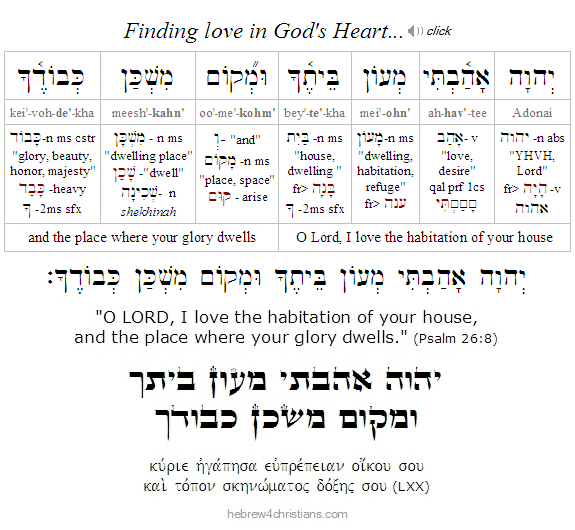 |
Purim and Deliverance...
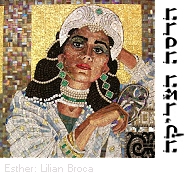
03.21.24 (II Adar 11, 5784) Do you remember this scene from the Fiddler on the Roof? A young man named Labish approaches the dear and wise old Rabbi and asks him, "Is there a proper blessing for the Czar?" Everyone is astounded at the idea. A blessing for the czar? The gentle Rabbi responds that indeed there is indeed a proper blessing for the czar: "May God bless and keep the Czar -- far away from us!" (Amen!)
The holiday of Purim is one of the most joyful of the Jewish year. We remember that long ago, in the city of Shushan (in ancient Persia), a wicked political sycophant named Haman attempted to blame the Jews for being different and to initiate a pogram for their extermination. The Jews were saved through the intervention of a queen named Esther (Hadassah) and her cousin Mordechai, both of whom were providentially enabled by God to overturn the evil decree of the King of Persia (the story is told in the Book of Esther). Throughout the centuries, in various places, many others have likewise tried to destroy the Jewish people, but none has succeeded. עַם יִשְׂרָאֵל חַי / am Yisrael chai: "The people of Israel live!" God's sovereign hand works all things together for good, even if at times things appear bleak and desperate (Rom. 8:28).
Hebrew Lesson
Psalm 31:4 reading (click for audio):
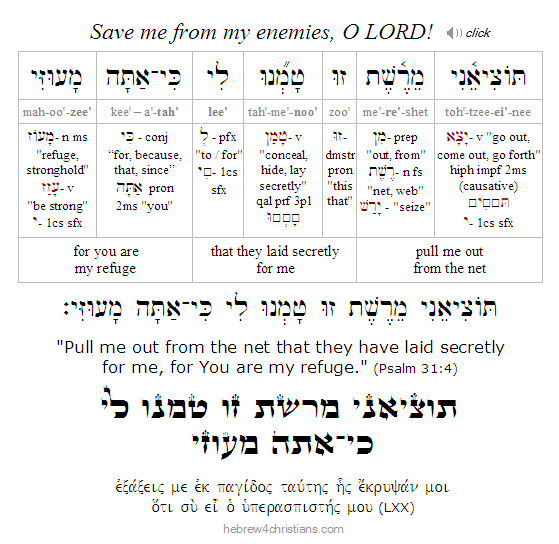 |
The name Purim (פּוּרִים) refers to the "lots" (i.e., dice) that Haman used to determine the "best day" to carry out their nefarious plan (there is irony regarding the word, however, since the word "pur" (פּוּר) also can refer to being "crushed" or "brought to nothing"). Haman's dice rolled "Adar 13," but since the Jews were delivered on the following day, the holiday is celebrated on the 14th of Adar. In other words, Adar 14 was ironically transformed from a day of potential tragedy and grief into a time of great rejoicing! (In Israel, Purim is observed a day later still (i.e., on Adar 15th) and is called Shushan Purim, since the deliverance of the Jews of Shushan did not occur until the 15th.) Among other things, the delicious irony of the Book of Esther reveals that there is no "chance" in God's universe, since He is the Master of the universe and supervises all it outcomes - even the "roll of the dice" (Prov. 16:33).
During the festive holiday of Purim it has become customary to dress up in costume and listen to the Book of Esther (i.e., megillat Esther, מְגִלָּת אֶסְתֵּר, or "the megillah") recited from the Hebrew scroll (before we hear the Megillah read, we recite three Purim blessings). Some people will dress as the noble Mordechai, others as the foolish king Ahashuerus, others as Esther, and so on. Part of the fun is that we are told that it's very important that we hear every word recited clearly, so we must keep very quiet as the story is being read. However, whenever we hear the name "Haman," we whirl groggers (ra'ashanim), blow whistles, stamp our feet, and make such a commotion that we can't hear his name. This is the only time we are encouraged to be boisterous when the Scriptures are being read.
After reading the Megillah, many communities put on their own "purimspiel" (Purim play) to reenact the dramatic story, with children dressed up as the characters of the play... Others put on "Purim puppet shows" at this time. It is a time of merrymaking and fun. Later we eat a festive meal (called a seudah, סְעֻדָּה) and enjoy three-cornered pastries called oznei Haman (אָזְנֵי הָמָן), or "Haman's Ears," for dessert (legend says that Haman's ears were twisted and triangular in shape). In Yiddish, these are called a hamantaschen (המן־טאַשן) and are often filled with prunes, chopped nuts, apricots, apples, cherries, chocolate, and so on. Eating Haman's Ears fit the delicious irony recounted in the Book of Esther....
 |
Purim Haggadol Prophecy...
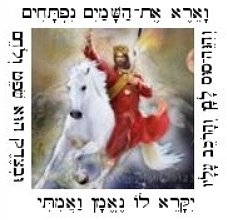
[ The holiday of Purim occurs Saturday, March 23rd at sundown this year... ]
03.21.24 (II Adar 11, 5784) Both Chanukah and Purim are holidays that celebrate God's victory over the forces of darkness... Just as the prophet Daniel foresaw the events of Chanukah, that is, the rise of "Epihpanes," the "Messiah of Evil" who will one day attempt to "assimilate" all of humanity into a "New World Order" (Dan. 9:27, 2 Thess. 2:3; Rev. 13:7-9, etc.), so Purim foretells how this wicked one will attempt to destroy the Jewish people during the End of Days (אַחֲרִית הַיָּמִים), though he will be destroyed by his own wicked devices. The Midrash Esther says that Purim, unlike many of the other holidays, will be celebrated even after the final redemption after the End of Days. This is because the story of Purim -- i.e., God's covenantal faithfulness and defense of His people -- will be magnified in the deliverance that leads to the establishment of the Messianic Kingdom upon the earth. Indeed, the Second Coming of the Messiah will be regarded as the final fulfillment of Purim! So while it is a often seen as time of unbridled celebration in Israel (ad lo yoda), the holiday of Purim has a very sober prophetic message that foretells the glorious end of this age.
Here is a vision of the coming "Purim haGadol," the great deliverance to come:
"Then I saw heaven opened, and behold, a white horse! The one sitting on it is called Faithful and True (נֶאֱמָן וְיָשָׁר), and in righteousness he judges and makes war. His eyes are like a flame of fire, and on his head are many diadems, and he has a Name written that no one knows but himself. He is clothed in a robe dipped in blood, and the Name by which he is called is the Word of God (דְּבַר הָאֱלהִים). And the armies of heaven, arrayed in fine linen, white and pure, were following him on white horses. From His mouth comes a sharp sword with which to strike down the nations, and He will rule them with a rod of iron. And He will tread the winepress of the fierce fury of the wrath of God, the Ruler over All (παντοκράτωρ), the LORD God Almighty (יְהוָה אֱלהֵי צְבָאוֹת). On his robe and on his thigh he has a Name written, the King of kings (מֶלֶךְ הַמְּלָכִים) and the Lord of lords (אֲדנֵי הָאֲדנִים). And with the breath of his lips He will slay the wicked" (Rev. 19:11-16).
May that day come speedily, and in our time... Amen.
Hebrew Lesson
Zeph. 1:41a reading (click):
HAPPY PURIM CHAVERIM!
During this Purim 5784, let us remember the nation of Israel in our prayers, and let us trust in God's providential hand in our lives -- that He will work all things together for the good of his people -- and that like wicked Haman, the enemy of our souls will likewise meet his fate, and then finally shall all our mourning be turned into dancing! Amen.
Sacrifice and Holiness...
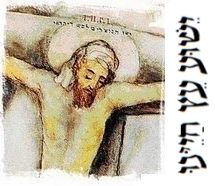
[ The following is related our Torah reading for this week, parashat Vayikra... ]
03.21.24 (II Adar 11, 5784) The book of Vayikra (i.e., Leviticus) presents two "overarching" themes. The first concerns the system of sacrifices (i.e., korbanot: קָרְבָּנוֹת) that were to be arranged in the Mishkan (and later, at the Temple). These include the daily sacrifice of the lamb (קָרְבַּן תָּמִיד), sacrifices for guilt and sin, thanksgiving offerings, and so on. The culmination of the sacrificial system, however, was expressed by the elaborate Yom Kippur service that was performed to obtain "kapparah" (כַּפָּרָה), or atonement on behalf of the people.
The second overarching theme of the book of Vayikra concerns matters of personal holiness (i.e., kedushah: קְּדוּשָׁה), including laws regarding what is "clean" (i.e., tahor: טָהוֹר) and "unclean" (i.e., tamei: טָמֵא) in matters of diet, sexual relations, personal health, and so on. In addition, holiness is connected with social relationships, such as the duty to honor parents, to give tzedakah to the needy, and to refrain from doing any harm to others. Indeed, the Ten Commandments are restated in Vayikra beginning with the words "You shall be holy, for I the LORD your God am holy" (Lev. 19:1-2). Note, incidentally, that the order of the commandments appears differently in Leviticus 19 than what is written in Exodus chapter 20 (and also in Deuteronomy chapter 5), and that additional commandments are listed there as well.
These two major themes - sacrifice and holiness - are connected, though perhaps not in the way you might immediately think. Many people suppose the sacrifices were given as a ritual means of obtaining pardon for sin, but this is an oversimplification. The Hebrew prophets did not add or subtract from the laws given at Sinai, though they sometimes criticized the people for offering sacrifices without the desire to obey God's law. The sacrifices themselves were not the problem, but they were ineffectual apart from genuine teshuvah (see 1 Sam. 15:22-31; Hos. 6:6; Matt. 12:7; Prov. 21:3; Isa. 1:11. Micah 6:6, Jer. 7:22).
The point here is that offering sacrifice apart from a heart of obedience is meaningless mummery and ostentation, since the moral law of God was given first to the people and only afterward were the sacrifices described to Moses in the vision of the altar at Sinai. But it is obedience to God that imparts virtue to sacrifice, as the cross of Yeshua exemplifies.
The idea of sacrifice predates the giving of the law given at Sinai, of course, and goes back to the primordial Garden of Eden itself where God offered up the lamb for Adam and Eve's transgression (Gen. 3:21). This set the pattern, and later Adam brought sacrifice, as did Cain, Abel, Noah, Shem, Abraham, Isaac, Jacob, and Moses.
We can learn from the account of Cain and Abel about righteous sacrifice. First note that Abel presented to God a sacrificed lamb - recalling the sacrifice of God and the promise of the redemption to come given to Adam and Eve (Gen. 3:14-15) - whereas Cain offered fruits of the earth. Their respective sacrifices present a study in contrasts, as God "turned to Abel and his offering" but he did not so regard Cain's offering. In a sense Abel (הֶבֶל), whose name comes from "vanity" or "vapor" (הָבַל) "re-presented" God's offering of the lamb that covered the sin of his parents, having faith in the promise of the Redeemer who was to come, whereas Cain (קַיִן) whose name means "to get" or to "take" (קָנָה), simply returned the gift of the fruits of the garden. Now there is of course nothing wrong with offering "first fruits" to God as minchah (מִנְחָה), or a gift, but God was looking for Cain to have faith in his promise. When God saw that Cain felt dejected, He rhetorically asked: "If you do well, will you not be accepted?" which indicates that being accepted is a matter of earnest faith in God, for that is what "doing well" means in the eyes of heaven. The Lord's words to Cain teach us that the basis for offering sacrifice to God is to express faith in his healing love and salvation...
This principle is essential to all true Torah: Those who trust in God's promises find divine favor and blessing, as the LORD said to aged Abraham when he gazed upon the canopy of stars and believed the "impossible" promise that he would become the father of a multitude of people. Yet Abraham trusted God for the miracle: "And he (Abraham) believed in the LORD; and he (the LORD) counted it to him for righteousness" (Gen. 15:6). Abraham believed in God's righteousness -- his blessing, power, and lovingkindness -- that would fulfill the vision, certainly not in his own merit or strength.... This is the very first commandment, after all, namely to believe in the Lord as your Savior, Healer, Blessing, Life, Destiny, and so on. "I AM the LORD your God" (אָנֹכִי יְהוָה אֱלֹהֶיךָ) is the first word of faith (Exod. 20:2).
We have to be careful about what we believe makes us right with God. Do we trust in ourselves or in God for our righteousness? Abel saw the vanity of human effort to attain righteousness, whereas Cain sought to acquire it through his own effort. The Holy Temple was destroyed because false religion offered sacrifices as a way to excuse their sin and consequently to disregard the call to turn to God and live a life of holiness. Walking by faith means understanding the sanctity of life itself, to accept that we are called by God to be set apart to know Him in all our ways (Prov. 3:5-6). Offering a sacrifice as "payment" for sin misses the point. True holiness means being "separated" from the profane to know and love God, but too often religion can serve as a false god that promotes sin by promising forgiveness apart from the need to walk in the obedience of faith. Therefore God said through the prophet Hosea: "I desire goodness and not sacrifice" (Hos. 6:6). "Sacrifice" from a faithless person is nothing less than an abomination to God (Isa. 1:11; Amos 5:21; Prov. 15:8).
The two great themes of sacrifice and holiness are therefore connected by faith in God's promises, and there can be no true sacrifice apart from heartfelt faith. Indeed, this is the ultimate purpose of the sacrifices - to honor God's heart and redeeming love given in Yeshua, the great Lamb of God (John 1:29; 1 Cor. 5:7). The blood of "bulls and goats" could never take away sin, but the sacrifice of God given of his own love for us does, and that is the message of the cross (Heb. 10:4-10). The sacrificial system with the daily offering of the lamb foreshadowed the Substance of the promise fulfilled in Yeshua. It is not our sacrifice that is the focus, but God's sacrifice of Christ given on our behalf, and our only response to this exceedingly precious gift is to offer thanks for God's kindness and mercy. "It is the kindness of God that leads you to repentance" (Rom. 2:4). As it written, "Through Him (i.e., the sacrifice of Yeshua) let us then continually offer up the sacrifice of praise to God, that is, the fruit of lips that confess the truth of his Name" (Heb. 13:15). Amen.
Hebrew Lesson
Psalm 9:10 Hebrew reading (click):
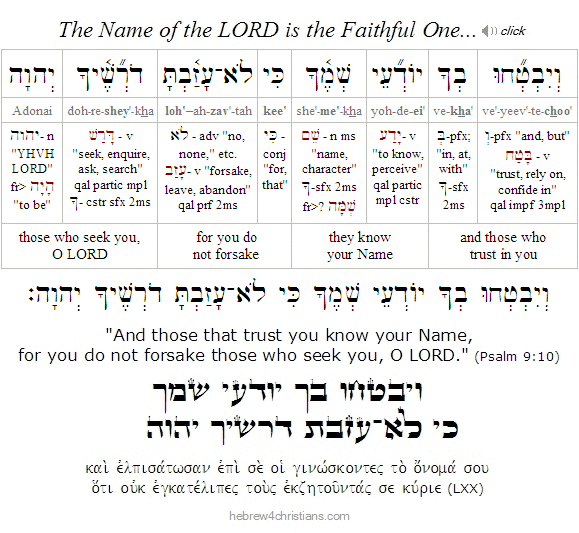 |
Esther and God's Providence...
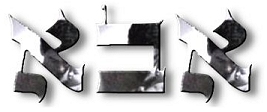
03.20.24 (II Adar 10, 5784) Much is made over the fact that the book of Esther is the only book of the Tanakh that does not explicitly mention the Name of God. However, the idea of God's sovereignty and diivine providence (i.e., hashgachah, הַשׁגָחָה) is clearly implied throughout the entire story. Indeed the sages teach that the message of Purim concerns the kingship of God (ממלכת האל), with the word "the king" (המלך) appearing over 100 times and the word "kingdom" (מלכות) appearing ten times in the scroll. In most cases the word "king" refers to King Achashverosh, though the sages say that when Achashverosh is not explicitly named, it may also refer to the King of the Universe.
The phrase hester panim (הסתר פנים) means "hiding of the face" and is often used when discussing the Book of Esther. In this sense of the term, hester panim is somewhat like the sun on an overcast day: Just because you don't see it doesn't mean it isn't there. God's providential love is at work at all times, whether we perceive it or not. This is suggested in the name of the scroll itself: the phrase Megillat Esther (מגילת אסתר), literally "the Scroll of Esther," can be rearranged to say megallat ha'seter (מגילת הסתר), "the concealed scroll."
In light of this nes nistar (נס נסתר), or "hidden miracle" of the Jew's deliverance, Esther and Mordecai ordained that Purim should be observed as a "day of feasting and merrymaking" and of sending gifts to the poor (Esther 9:22,28). By the way, Purim (פורים) was so named because Haman had cast lots (purim) to determine the day on which to destroy the Jews.
So what does Purim teach us? Well first of all it teaches that the LORD is in control of everything, even if may seem otherwise. Nothing happens apart from God's sovereign will, and therefore everything works together for the ultimate good for those who trust in Him (Rom. 8:28). The term hashgachah pratit (השׁגחה פרטית) refers to God's personal supervision of our lives (hashgachah means "supervision," and pratit means "individual" or "particular"). Since He is the Master of the Universe (אדון עולם), God's supervision and providence reaches to the smallest of details of creation - from subatomic particles to the great motions of the cosmos. God not only calls each star by its own name (Psalm 147:4), but knows each particular lily and sparrow (Matt. 6:28-30, 10:29). Each person created in the likeness of God is therefore under the direct, personal supervision of God Himself -- whether that soul is conscious of that fact or not. As Yeshua said, even the hairs on your head are all numbered (Matt. 10:30). The God of Israel is called אלהי הרוּחת לכל־בּשׂר / Elohei ha-ruchot lekhol-basar: "The God of the spirits of all flesh" (Num. 16:22), and that means He is LORD even over those who vainly attempt to suppress His Presence and reality. Second, Purim teaches that God's plans for Israel will never (ever) fail and that those who disregard Israel in their theology do so at their peril. Third, the story of Esther provides a warning for those tyrants and princes of this world who oppress God's people: Like the false usurper Haman, you are likewise doomed to failure, and the LORD will vindicate all who trust in Him for deliverance.
There is great comfort when we understand that God has complete authority over everything in the universe -- including our ultimate welfare (John 10:27-28). When we pray to the LORD God of Israel, we intuitively understand that He is completely sovereign and Lord over all things... All power, glory, authority, and dominion is His alone, and all that is in the heaven and in the earth is His (1 Chron. 29:11-12). We do not worry that He is somehow incapable of handling our troubles or that He is unable to help us. No, we acknowledge that the God most High (אל עליון) sustains all things by the Word of His power (Col. 1:17). He is "the blessed and only Sovereign, the King of kings (מלך המלכים) and the Lord of lords" (1 Tim. 6:15). Whenever we think clearly in light of the revelation of Scripture, we apprehend the truth about God's sovereign glory and power...
Hebrew Lesson
Proverbs 16:9 reading (click):
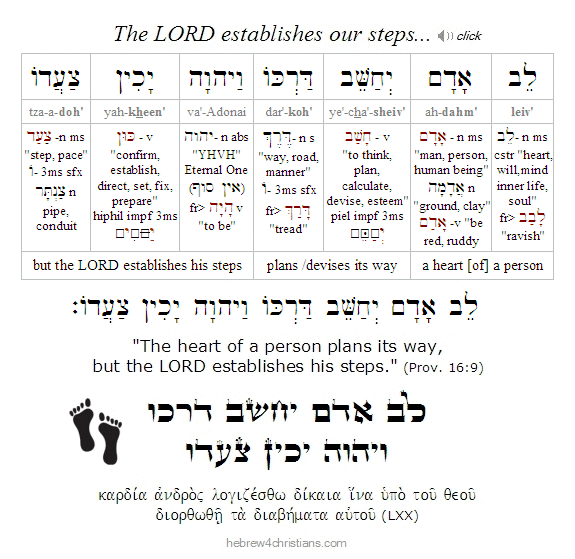 |
Torah of Sacrifices...
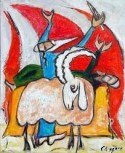
03.19.24 (II Adar 9, 5784) Our Torah portion this week (i.e., Vayikra) begins with the Lord calling out (קָרָא) to Moses to explain the "laws of korbanot" (תורה של קרבנות), or the way the people could pleasingly draw near to him. Note that the root of the word korbanot, often translated as "offerings" or "sacrifices," is karov (קרוב) which means to come close, to enter into, or to approach. The korbanot, or sacrifices, were meant to bring us closer to God, and the central sacrifice at the altar was that of a defect-free male lamb offered daily, called korban tamid (קָרְבַּן תָּמִיד), or the "perpetual sacrifice." Unlike other sacrifices that may be offered at the altar, the korban tamid was continually offered by God Himself in commemoration of the great Passover redemption wherein the blood of the lamb was offered on behalf of Israel. Like the cross of Messiah our Passover (משיח פסח שלנו), God provides the Lamb and by this grace He enables access to the divine presence for blessing and eternal life...
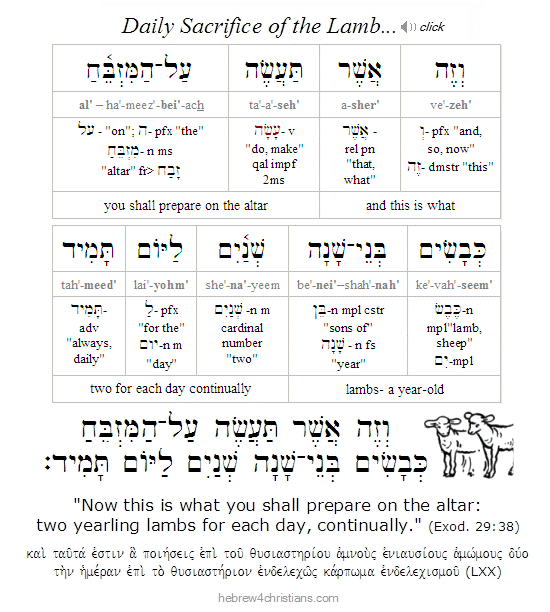 |
Other sacrifices, such as the "chatat" (חטאת) or sin offering, required the offerer to place his hands on the head of the animal, leaning on it will all his might, as he confesses his wrongdoing and expresses his desire to return to God. This procedure is called "semichah" (סמיכה) and the confession is called "vidui" (וִדוּי). Immediately following this the animal is led away to be ritually slaughtered (i.e., shechittah: שחיטה) and the blood was caught in a basin and then dashed upon the altar by the designated kohen (כּוֹהֵן), or priest.
Various other korbanot are mentioned in our reading, including the "olah" (עולה), or "ascending" offering wherein the kosher animal is entirely burned on the altar; the "shelamim" or "peace" offering (קרבן שלמים) given for celebratory events or to give thanks (תודה); the "asham" or guilt offering (קרבן אשאם) which is a type of sin offering that is more serious and involves restitution for wrongdoing. Note that for each of these offerings, if an offerer is too poor to offer an animal for sacrifice, the "minchah" (קרבן מנחה), or prepared flour offering, or the "ohf" (קרבן עוף), a bird (i.e., pigeon or dove) sacrifice was acceptable.
Note that the original Passover sacrifice (קרבן פסח) was not given to the Levitical priesthood as a sin offering, since it preceded Sinai and the giving of the various laws concerning the Mishkan/Temple sacrificial rites. In the same way, Yeshua's sacrifice was directed from Heaven itself by means of the prophetic office of Malki-Tzedek (מַלְכִּי־צֶדֶק) - a higher order of priesthood (Gen. 14:18; Psalm 110:4; Heb. 7). Yeshua both offered Himself up as the "Lamb of God" that causes the wrath of God to (eternally) pass over those who personally trust in Him, and He also offered himself as the "Goat of God" whose blood was sprinkled in the Holy of Holies to cleanse us from sin and give us (everlasting) atonement. (Other metaphors are also given in Scripture, for example, Yeshua offered Himself as a Snake lifted up (John 3:14-15; cp. Num. 21:4-9), as a Red Cow (parah adumah), and so on).
For Yom Kippur (יום הכיפורים), or the "Day of Atonement," two goats were required: one goat was for blood sacrifice in the Holy of Holies (the Goat of the LORD) and the other was used as a "scapegoat" for the sins of the community (the goat of Azazel). The Gospels seem to emphasize the connection between Yeshua as the "Lamb of God who takes away the sins of the world" with Passover/Exodus more than the connection between Yeshua as the "Goat of the LORD" whose blood was sprinkled upon the Mercy Seat with Yom Kippur - though the author of the Book of Hebrews explicitly makes this connection (Heb. 9:11-12; 24-ff).
It may seem like the details of the various sacrifices are tedious and even boring to read, but the deeper truth of what they represent is nothing short of amazing. Yeshua as the "Lamb of God" pictures personal redemption from slavery to Satan and freedom from the wrath of God. This is the greater Passover/Exodus connection. By means of Yeshua's shed blood and broken body, the wrath of God passes over us and we are set free to serve Him.... Yeshua as the "Goat of God" pictures both personal cleansing (i.e., "propitiation" or "expiation" for our sins: the Greek word (ἱλαστήριον) is used in the LXX for the kapporet (Mercy Seat) in the Holy of Holies which was sprinkled with the blood of the sacrifice on Yom Kippur) as well as national teshuvah and cleansing for ethnic Israel at the end of the Great Tribulation period. At that time Yeshua will function as Israel's true High Priest whose sacrifice is applied for Israel's Atonement. This is the Yom Kippur connection.
Hebrew Lesson
Psalm 4:5 Hebrew reading (click):
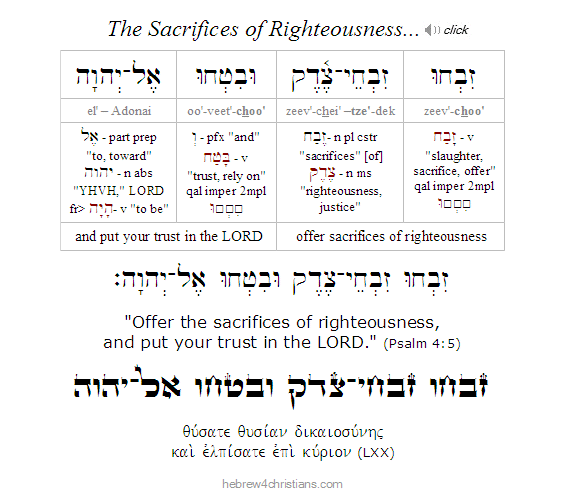 |
Teshuvah and Despair...
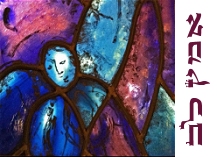
03.19.24 (II Adar 9, 5784) There are moments – dark, gnawing, raw – when you may lose sight of hope, when you might even fear that you have lost your faith – not in God or his promises – but rather in yourself, in your own strength to continue, to stay focused, to keep pressing on "hope against hope..." The remedy here is always the same: to remember that within you – that is, in your flesh - "there is no good thing" and that the miracle of salvation is made secure by God's passion for you, not your own power or desire. "Not by might, nor by power, but by my Spirit, saith the LORD of Hosts."
We don't trust in ourselves nor in the strength of our inner resolve, but solely in the power of God to make the way (John 1:13). We must turn away from ourselves to regain the message of God's unfailing love; only when we lose sight of ourselves do we find ourselves. God redeems you from your lost estate and touches you in your uncleanness; He clothes himself in your pain so that you may be clothed in his love. That never changes, despite dark moments, and to that we must always return...
Hebrew Lesson
Isaiah 40:29 reading (click):
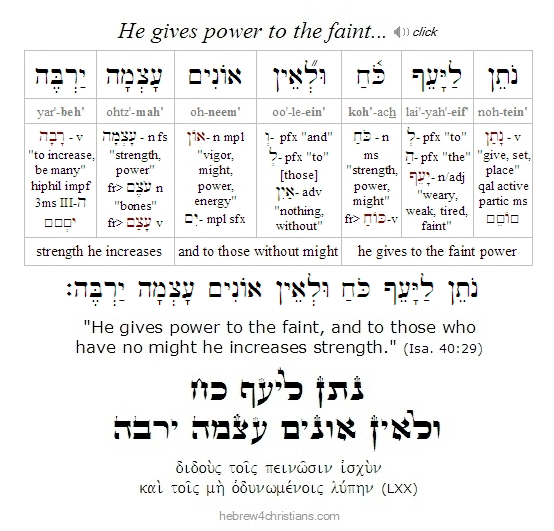 |
Where it says, "I can do all things through Messiah who strengthens me" (Phil 4:13), that includes being healed of the inner pain of your life: your failures, your shame, the ache of rejection, abandonment, and so on. It means being set free from disillusionment, despair, and the oppression of relentless fear. "I can do all things through Messiah" means no longer accepting messages of self-hatred and hopelessness, no longer heeding the malicious whispers that say: "I am of no value," "I am unlovable," "my life is hopeless." No, "I can do all things through Messiah" means learning to be accepted, honored, and esteemed by God; it means opening your heart to God's love and blessing for your life; it means allowing your heart to be made right, to have inner peace... After all, Yeshua's great prayer was that we would know the truth of God's love for us (John 17), and this is the central need our lives. Amen, and may we walk in that love today...
The Centrality of Leviticus...

03.19.24 (II Adar 9, 5784) The Book of Leviticus (i.e., sefer Vayikra: ספר ויקרא) is to the Torah what the Book of Hebrews is to the New Testament. Leviticus is both the physical and spiritual center of the Five Books of Moses and comprises its ritual expression. The sages count 246 of the 613 commandments of the Torah in this book (over 40%), and many of the Talmud's discussions regarding ritual purity and holiness are based on it.
Many Christian readers of the Bible want to skip the Book of Leviticus, however, because they find the detailed description of the Mishkan (Tabernacle) and the various laws of the sacrificial system to be tedious and/or irrelevant for followers of Yeshua. This is unfortunate because in its pages the great sacrificial work of Yeshua is foreshadowed and explained for us. Indeed, without the underlying concepts "seeded" there, various fundamental New Testament teachings concerning the atoning sacrifice of Yeshua for our sins, our justification by faith, and our call to walk in sanctification would not make much sense....
The LORD intended that the sacrificial laws given to the Levitical priests (i.e., kohanim) would foreshadow the coming atoning sacrifice offered by Yeshua, the "Lamb of God slain from the foundation (יְסוֹד) of the world" (1 Pet. 1:19-20, Rev. 13:8). This is why these laws are called torat Kohanim - the "teaching of the priests." This instruction (i.e., torah: תּוֹרָה) was intended for all Israel to understand the need for blood atonement in order to draw near to God (Lev. 17:11). The Levitical system as a whole served as a "type" or "picture" of heavenly realities. Moses received the "pattern" (i.e., tavnit: תַּבְנִית) of the Throne of God on Sinai, but this was a physical copy or "shadow" of the spiritual Reality he beheld in visions. The Mishkan was always intended to be moved into the Promised Land, which King David later established in Zion, the place of the Holy Temple. But it was the sacrificial death of Yeshua that is the focal point and goal of it all: Yeshua is the Substance of all that the sacrifices foreshadowed...
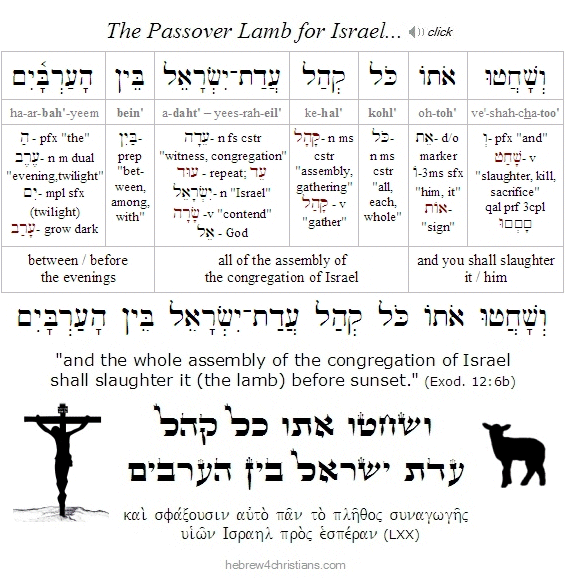 |
Audio Podcast:
Hidden in Plain Sight...
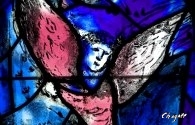
03.18.24 (II Adar 8, 5784) Shalom dear friends. The festival of Purim begins Saturday, March 23rd at sundown this year. During this time we revisit the enigmatic Book of Esther and joyfully recount how God providentially cares for his people...
Although the Name of God is not explicitly mentioned in the Book of Esther, the story is essentially about revelation, that is, the disclosure of God's Presence despite His apparent concealment. The phrase hester panim (הֶסְתֵר פָּנִים) means "hiding of face" and is often used when discussing the divine providence. God's plan is being fulfilled, step-by-step, even if it is hidden within the "natural" world of human beings and their choices (Jer. 10:23; Prov. 21:1). The LORD is Ha'mashgiach (i.e., הַמַּשְׁגִיחַ, the supervisor) of all things - from the motions of subatomic particles to the great events of the cosmos. He not only calls each star by its own name (Psalm 147:4), but knows each particular lily and sparrow (Matt. 6:28-30, 10:29). Indeed, each person is under the direct, personal supervision of God Himself (הַשְׁגָּחָה פְּרָטִית) -- whether he or she is conscious of this or not. As Yeshua said, even the hairs on your head are all numbered (Matt. 10:30).
גָּדוֹל יְהוָה וּמְהֻלָּל מְאד
וְלִגְדֻלָּתוֹ אֵין חֵקֶר
gah·dohl · Adonai · oo·me·hoo·lahl · me·ohd
ve·leeg·doo·lah·toh · ein · chei'·ker

"Great is the LORD, and greatly to be praised,
and his greatness is unsearchable." (Psalm 145:3)
Download Study Card

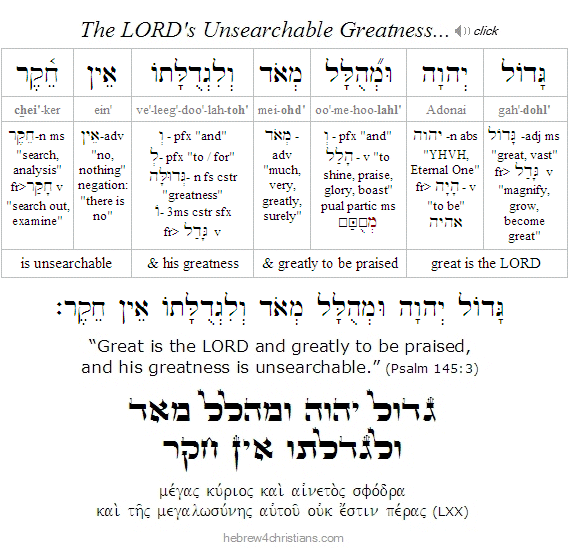
The Apostle Paul taught that God "chose us [εκλεγομαι] in the Messiah before the foundation of the world" (Eph. 1:4). God called you by name -- before He created the very universe itself. "God has chosen you from the beginning for salvation through sanctification by the Spirit and faith in the truth" (2 Thess. 2:13). God loves you with an "everlasting love" (אַהֲבַת עוֹלָם) and with lovingkindness (i.e., chesed, חֶסֶד) draws you to Himself (Jer. 31:3). There is no fear in God's sovereign and irresistible love for your soul (1 John 4:18). "If God is for us, who can be against us?" (Rom. 8:31).
Note: For more on this topic, see "Theology, Paradox, and Purim."
Parables and Revelation...
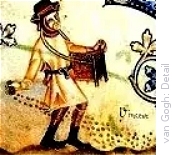
[ The holiday of Purim celebrates God's providential deliverance of his people... ]
03.18.24 (II Adar 8, 5784) Yeshua often used various agricultural images in his parables. For example, he explained that people are known by the "fruits" of their lives (Matt. 7:16-20). He likened the spread of his message in terms of "sowing and reaping" (Matt. 13:3-23) and compared the Kingdom of Heaven to the secret working of a mustard seed (Matt. 13:31-32). Yeshua regarded the world as a "field" for planting with different "types of soil" (Matt. 13:38-43), and warned of the "great harvest" of souls at the end of the age (Luke 10:2; Matt. 13:30). He pointed to signs from a fig tree to indicate the nearness of the prophesied End of Days (Matt. 24:32-33). Yeshua also used the metaphor of a "vine and its branches" to explain how his followers are to be connected to Him (John 15:1-6).
Undoubtedly Yeshua taught in parables because they simultaneously conceal and reveal the truth. A parable obscures the truth to those who don't really want it; just as it reveals the truth to those who do (Luke 8:9-10; Psalm 72:8; Matt. 13:34-35). Since Yeshua's whole life was a parable of sorts - a "disguise" that led to the victory of our deliverance (Phil. 2:7) - it is not surprising that he regularly used "figures of speech" to provoke people to examine their own heart attitude and faith... In this connection note that Yeshua never explained the "mysteries of the kingdom of God" directly to the crowds, nor did He ever pander to the crowd's clamor or interests. His message is always meant for the individual soul who was willing to follow Him -- to the one who had "ears to hear."
Reading the parables can help us take inventory of our lives. For example, whenever we hear the famous "parable of the sower" (Matt. 13:3-23) we are reminded that God is like a farmer who sows seed upon the soil of human hearts (the quality of which may be hard, shallow, choked, or good). If we are honest with ourselves, we will see our own hardness, shallowness, and selfishness in contrast to the fruitfulness marked by the good soil, and this may prompt us to seek God for help. Only the new heart (lev chadash) created by power of God's Spirit can possibly yield the fruit of the Spirit. Yeshua therefore warns us: "Take care then how you hear, for to the one who has, more will be given, and from the one who has not, even what he thinks that he has will be taken away" (Luke 8:18).
Hebrew Lesson
Psalm 78:2 Hebrew with comments (click):
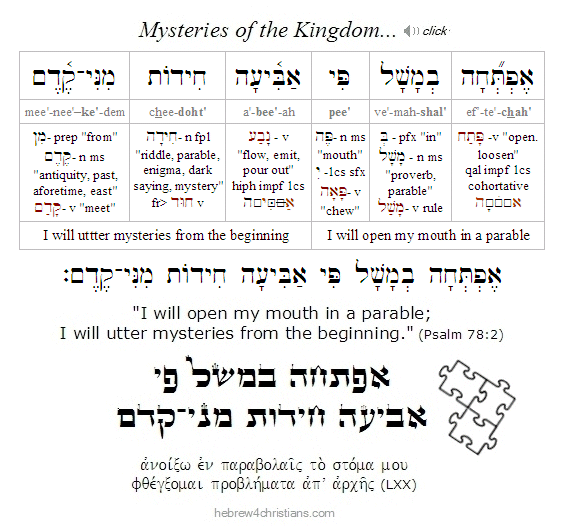 |
With God all things are possible, and the life of God is a miracle that comes from God's own source of Life. It is the fruit of the Spirit, after all, and not the fruit of human effort or moral reformation... Amen and Chag Purim Sameach!
Sabbath of Remembrance...
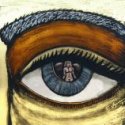
03.18.24 (II Adar 8, 5784) The Sabbath that immediately precedes the festive holiday of Purim is called Shabbat Zakhor (שבת זכור), or the "Sabbath of Remembrance." The maftir (additional reading) instructs us to "remember" (זָכוֹר) how the nation of Amalek attacked the Jews at Rephidim immediately following the Exodus from Egypt (see Exod. 17:8-16). After Israel routed the attack, God told Moses, "Write this as a memorial in a book and recite it in the ears of Joshua, that I will utterly blot out the memory of Amalek from under heaven" (Exod. 17:14). Moses later explained that Amalek did not fight using conventional methods of war but rather attacked and killed the weakest members of Israel, "those who were lagging behind" in the camp (Deut. 25:17-19). This cowardly approach represented the first attack of God's newly redeemed people, a Satanic assault that God vowed never to forget. Amalek therefore embodies satanic forces arrayed against the people of God.
In this connection note that the name "Amalek" (עֲמָלֵק) begins with the letter Ayin (symbolizing the eye) which equals 240 in gematria -- the same value for safek (סָפֵק), the Hebrew word for doubt. Amalek therefore suggests "the eye of doubt," or even "the severed eye" (the Hebrew verb מָלָק means "to chop" or "sever" in reference to the "eye" of Ayin). Amalek therefore represents spiritual blindness as it acts in the world...
The additional Haftarah portion (1 Sam. 15:2-34) we read on this Sabbath speaks of how King Saul later failed to "devote to destruction" the evil tribe of Amalek -- a mistake which cost him the very kingship of Israel. Samuel's rebuke of Saul's compromise is always timely: "Behold, to obey is better than sacrifice, and to listen than the fat of rams.... Because you have rejected the word of the LORD, he has also rejected you from being king" (1 Sam. 15:22-23).
These two readings were selected before the holiday of Purim because Haman was an Agagite (Esther 3:1), i.e., a direct descendant of Agag, the king of Amalek (whom king Saul nearly spared, see 1 Sam. 15:32-33), and we should therefore link the 'wiping-out' of Haman with the 'wiping-out' of Amalek. The spiritual war between the light of God and the darkness of the devil admits of no compromise. For more about this Sabbath, click here.
Hebrew Lesson
Exodus 17:16 reading (with commentary):
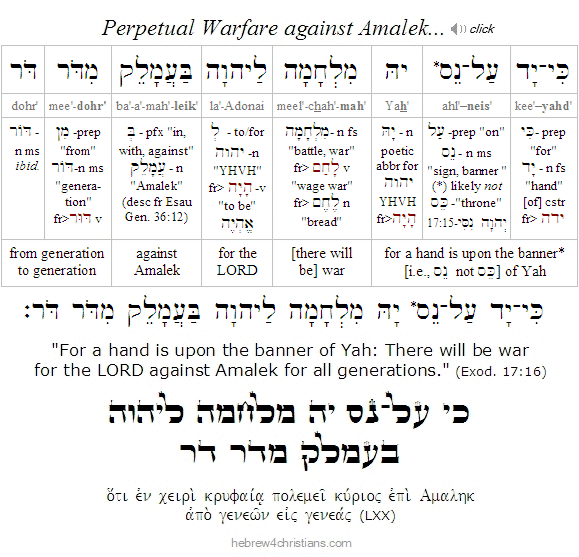 |
The LORD Calls Out - ויקרא

[ This week we begin a new book of Torah, sefer Vayikra (i.e., the book of Leviticus)... ]
03.17.24 (II Adar 7, 5784) Shalom chaverim! Our Torah portion for this week is Vayikra (i.e., וַיִּקְרָא, "and he called"), the very first section from the Book of Leviticus (ספר ויקרא). In Jewish tradition, Leviticus is sometimes called the "Book of Sacrifices" (i.e., sefer ha'zevachim: ספר הזבחים) since it deals largely with the various sacrificial offerings brought to the altar at the Mishkan (i.e., Tabernacle). Indeed, over 40 percent of all the Torah's commandments are found in this central book of the Scriptures, highlighting that blood atonement is essential to the Torah. Moreover, since the revelation of the Tabernacle was the climax of the revelation given at Sinai, the Book of Leviticus reveals its ritual significance, as it is written: "For the life of the flesh is in the blood, and I have given it for you on the altar to make atonement for your souls, for it is the blood that makes atonement (kapparah) by the life" (Lev. 17:11).
Unlike narrative portions of other books of the Torah, the Book of Leviticus begins with the LORD himself "calling out" (i.e., vayikra) to Moses to explain that the way to draw near to Him is by means of atoning sacrifice. It is noteworthy that throughout the book, only the sacred name of the LORD (יהוה) is used in connection with sacrificial offerings, and never the name Elohim (אלוהים). This suggests that sacrificial offerings were given to draw us near to experience God's mercy and compassion rather than to simply appease His anger.... In other words, the Name of the LORD represents salvation (i.e., yeshuah: ישועה) and healing for the sinner, not God's judgment (John 3:17). Indeed, the word korban (קרבן), often translated as "sacrifice" or "offering," comes from a root word karov (קרב) that means to "draw close" or "to come near" (James 4:8). The sinner who approached the LORD trusting in the efficacy of the sacrificial blood shed on his or her behalf would find healing and life...
In this connection we note that the ancient Greek translation of the Torah (called the Septuagint) translated the Hebrew word kapporet (i.e., כפרת, "mercy seat") as hilasterion (ἱλαστήριον), sometimes translated "propitiation." The New Testament picks up this usage in Romans 3:25: "God put forward Yeshua as a propitiation (ἱλαστήριον) through faith in His blood." In other words, the shedding of Yeshua's blood - represented by His Passion upon the cross - was "presented" upon the Heavenly Kapporet, before the very Throne of God Himself for our atoning sacrifice (i.e., kapparah: כפרה) before God.
Holiday Alert: This year the holiday of Purim is celebrated Saturday, March 23th (at sundown), that is, on the 14th of II Adar. For more information see the Purim pages.
Preparing for His Presence...
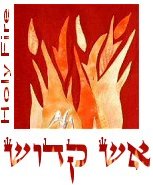
[ The final portion of the Book of Exodus, parashat Pekudei (פְקוּדֵי), leaves us with the challenge to "account" for our lives in relationship to the sanctuary of the Lord. ]
03.17.24 (II Adar 7, 5784) Recall that the materials for the construction of the sanctuary were given by free-will offerings of the heart, and therefore we must begin there - as we present ourselves a "living sacrifice" (i.e., korban chai: יקָרְבָּן חַ) to engage the work of God.
Now some days we may feel a sense of resistance regarding our commission, but when we find grace to believe that we were personally redeemed by God's "mighty hand and outstretched arm" (יָד חֲזָקָה וּבִזְרוֹעַ נְטוּיָה) for the purpose of knowing and serving him, our hearts find will find their resolve. Indeed this is the very point for our lives, the "chief end" and reason for our existence, namely, to glorify God and to love him forever. We first find faith to make a dwelling place within our hearts (i.e., mikdash ha'lev: מִקְדָּשׁ הַלֵב), freely offering our desire to serve the Lord be'khol li'beinu (בְּכֹל לִיבֵּנוּ), with all our hearts...
In this connection we note that even though the people had brought their contributions before the Lord, the actual assembly of the sanctuary (i.e., mishkan: מִשְׁכָּן) occurred three months later, on Nisan 1, the beginning of the month of salvation (חוֹדֶשׁ הַיְשׁוּעָה). This teaches us that we must trust in God's perfect timing and providential plan for our days. It is our job to "show up" and be ready, but it is the work of God's Spirit that makes all the difference (John 6:63; Isa. 26:12). The wise, however, take oil in their vessels to ready their lamps (Matt. 25:4).
Moses was instructed to wait until "Rosh Chodashim" (ראשׁ חֳדָשִׁים), that is, the first day of the month of salvation (i.e., yeshuah: יְשׁוּעָה), because the dwelling place of God centers on his redemptive love given in Messiah (Rev. 5:6). Yeshua is the full expression of the "Lamb of God" motif offered in Scripture - first in the original garden of Eden (Gen. 3:15,21), then again in the sacrifice of Isaac at Moriah (Gen. 22:13), then yet again in Egypt at the time of the Passover redemption (Exod. 12:21-23), and finally in the climactic and decisive sacrifice of Yeshua upon the cross at Golgotha (הַגֻּלְגֹּלֶת), where our sins were forever "rolled away" (Isa. 53; John 1:29; Mark. 15:12; 1 Pet. 1:19, Rev. 5:9, etc.). This is also the time of Yeshua's resurrection from the dead, the advent of God's ultimate redemption and recreation of humanity (1 Cor. 15:20; Acts 26:23). Amen. The dwelling place of God was to be embodied from his own saving work given on our behalf, so that we could dwell within his heart forever.
The place of God is known through the miracle of faith. Like a mustard seed that is sown, the outer shell must first be broken to release the hidden power of divine life, and afterwards it becomes a holy habitation. Note again that such growth occurs over time as the result of God's timing and grace (Mark 4:26-19). We may sometimes feel like we are not where we should be spiritually, but times of waiting and the Torah of endurance are necessary for the revelation to come. We must have faith that God's power is at work beneath the veneer of our passing days. The soil that covers the seed is being prepared to break through to the light....
The Book of Exodus (סֵפֶר שְׁמוֹת) ends prophetically with the Shekhinah Glory of the LORD filling the newly built sanctuary: "For the cloud of the LORD was on the Tabernacle by day, and fire was in it by night, in the sight of all the house of Israel throughout all their journeys." This is a vision of the coming day, chaverim, when we will be with our Lord forever. Amen.
Hebrew Lesson
Isaiah 26:12 Hebrew reading:
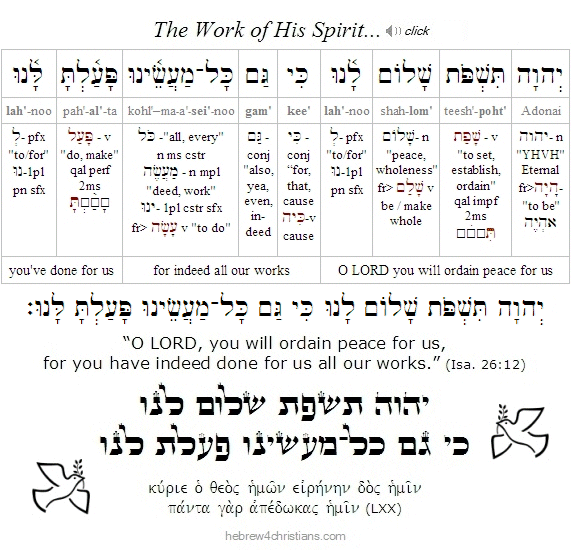 |
Signs and Wonders...
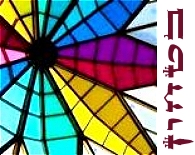
03.15.24 (II Adar 5, 5784) Regarding those who seek the services of "miracle workers," the Kotzker Rebbe is reported to have said, "There are miracles and then there are miracles... Some people regard it as a miracle if God does someone's will; we regard as a miracle if someone does God's will." Amen, a true miracle, and one greater than the splitting of the sea, is that of a transformed heart that loves God and seeks to do God's will. Similarly, some people seek signs of the times and the End of the World, though the true "end of the world" arrives the moment you truly surrender your life to God's care...
Hebrew Lesson
Psalm 51:10 Hebrew reading:
Hiddenness and Disclosure...

03.15.24 (II Adar 5, 5784) The sages extol the importance of the holiday of Purim because it reveals the hidden hand of God, despite his apparent absence in the affairs of this world... On the surface, each turn of the story could be explained naturally, or as simple "coincidence," yet in the end we realize that God was at work behind the scenes, carefully putting together deliverance for God's people.
The eye of faith trusts in God's providential plan, despite appearances to the contrary. Indeed, the phrase hester panim (הֶסְתֵר פָּנִים) means "hiding of the face" and is often used when discussing the Book of Esther. Understood as "hidden providence," hester panim is likened to the sun on an overcast day: Just because you don't see it doesn't mean it isn't there. God's great love is at work at all times, in all affairs of the universe, whether we perceive it or not.
Hebrew Lesson:
Psalm 47:7 Hebrew reading:
Getting reading for Purim...
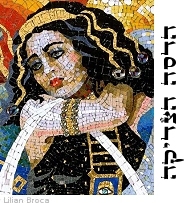
[ The ironically happy holiday of Purim begins Saturday, March 23rd at sundown this year... ]
03.15.24 (II Adar 5, 5784) The Scriptures state that the holiday of Purim "should be remembered and kept throughout every generation, every family, every province, and every city; and that these days of Purim should not fail from among the Jews, nor the memorial of them perish from their seed" (see Esther 9:28). According to Jewish tradition, we remember the miracles of Purim by means of four mitzvot (i.e., blessings): 1) honoring the appointed time as directed by the Scriptures (Esther 9:26-28); 2) performing acts of tzedakah and kindness (Esther 9:22; i.e., misloach manot: מִשְׁלוֹחַ מָנוֹת); 3) hearing the story of Esther read (i.e., Megillat Esther); and 4) enjoying a holiday Purim meal together.
The Midrash Esther says that Purim, unlike many of the other holidays, will be celebrated even after the final redemption after the End of Days. Maimonides says that the Book of Esther will enjoy the same status as the Torah of Moses in the world to come (Mishneh Torah, Megillah). This is because the story of Purim -- i.e., God's covenantal faithfulness and defense of His people -- will be magnified in the deliverance that leads to the establishment of the Messianic Kingdom upon the earth. Indeed, the Second Coming of the Messiah will be regarded as the final fulfillment of Purim (Rev. 19:11-16).
Purim is all about God's irrepressible, invincible, insuperable and sovereign love for His people. Though the wicked seem to sometimes have the upper hand in olam ha-zeh (this present hour), we need not fret or become anxious (Psalm 37:1, Prov. 24:19, Phil. 4:6). God is in control and His love and purposes overrule the counsel of the wicked. He will one day speak to the princes of this dark world in His wrath and terrify them in His fury (Psalm 2:5). God's great vision for Zion, the "City of the Great King," will never fail, friends, nor will His love for those who are trusting in Him. God's sovereign love is our great hope. As King David said, בָּרְכוּ־נָא אֶת־יהוה אֱלהֵיכֶם / Barekhu-na et-Adonai Elohekhem: "Now bless the LORD your God" (1 Chron. 29:20). פּוּרִים שָׂמֵחַ / Purim Sameach: "Happy Purim" chaverim!
Hebrew Lesson
Esther 9:28 reading (click):
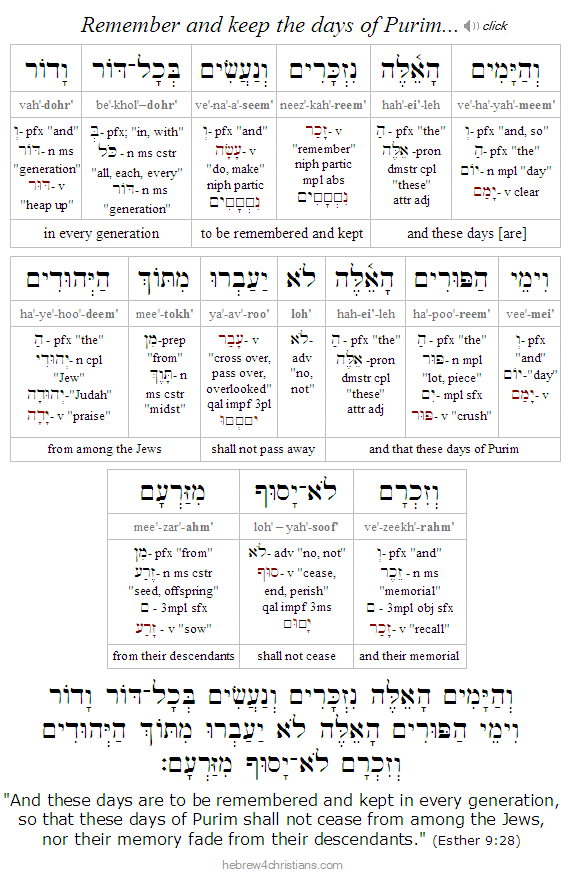 |
For more on this topic see the article: "Should Christians Celebrate Purim?"
Word of Eternal Life (חַיֵּי עוֹלָם)
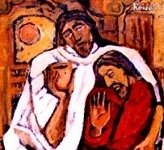
[ "The object of our faith is not the teaching but the Teacher..." - Kierkegaard ]
03.15.24 (II Adar 5, 5784) Yeshua reveals the heart of God to us, teaching us about the meaning of life and death and why we suffer... Most radically, however, he offers us the cure for the sickness of "spiritual death" (i.e., separation from God) by offering the gift of his life for us. Yeshua heals us from alienation and separation from the Eternal by means of spiritual regeneration (Eph. 2:1,5; John 3:3-7). Your relationship with Messiah constitutes eternal life (חַיֵּי עוֹלָם), for it is He who "makes you alive together with him" (i.e., συζωοποιέω, the Greek word here means you are brought into a new realm of existence by participating in the life in Messiah). He offers us daily deliverance from the power of sin by means of the Spirit of Faithfulness (רוּחַ הָאֱמֶת), though we must remain receptive to the message of hope and be transformed by the renewing our minds (Rom. 12:2; Eph. 4:23; Col. 3:10).
We must be careful not to "drift away" from the truth, since that forfeits the integrity of our lives and leads us into darkness and despair: "For what benefit is it for a person to gain the whole world, yet forfeit his life?" (Mark 8:36). Faith is the means or agency of connection with what is real, though we can lose that connection by hardening our hearts and returning to our former illusions (Heb. 3:13). Exile from God is therefore self-imposed; the gates of repentance are always open to those who seek God's compassion; everyone is welcome to find life in the blessing of Messiah (Luke 14:16-23; Luke 15:11-32). Therefore, draw near to God and God will draw near to you. "Let us then with confidence draw near to the throne of grace, that we may receive mercy and find grace to help in time of need" (Heb. 4:16).
Hebrew Lesson
Psalm 18:31 reading (click):
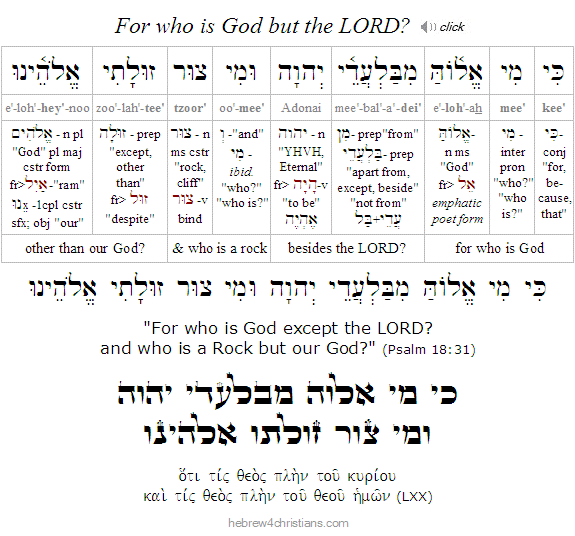 |
Every Prayer Answered...
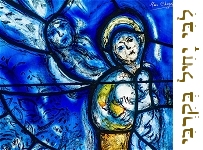
03.15.24 (II Adar 5, 5784) If you have earnestly prayed but are tempted to think that God is not responding, remind yourself that every prayer uttered to God from a heart that trusts in His redemptive love given in Messiah is indeed answered, and not a syllable goes unheeded or will be lost before heaven (Psalm 145:18; Matt. 7:7; Matt. 21:22). Just as we earnestly believe that justice will eventually be manifest and all wrongs fully redressed at the bar of Eternal Judgment -- so we understand that every utterance of the heart of faith finds compassionate response from the heart of heaven. Indeed the essence of teshuvah (return, "repentance") is heartfelt prayer, and therefore when we bring honest words and turn back to accept the truth, God's mercy and compassion are decisively evoked (1 John 1:9). The most important thing is not to lose faith, however, but to believe that God hears you and will indeed answer the cry of your heart. Decide to believe and settle your expectation. Never give up hope. God is faithful; He will do it (1 Thess. 5:24).
King David asked for God's direct and miraculous intervention to heal his soul: "Cause me to me hear your lovingkindness in the morning, for in You do I trust. Cause me to know the way I should go, for I lift up my soul to you" (Psalm 143:8). David's request was that he would be empowered to hear God's loving voice calling to his heart at the start the day, to be assured of God's kindness and favor. Note that the Hebrew verbs used in this verse are both hiphal imperatives, implying that God is the agent or cause of the action. We lift up our heart in expectation, understanding that the LORD alone is the One who is able to draw us near to Him: "You [God] cause me to hear... You [God] cause me to know..."
Hebrew Lesson
Psalm 143:8 Hebrew Reading (click):
Anxious for Nothing...
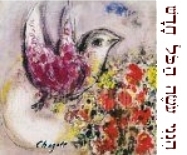
03.14.24 (II Adar 4, 5784) If you are anxious over the latest rumor (or outrage) of the day, remind yourself that there is far more to life than what's going on in this world... "Look up into the heavens. Who created all the stars? He brings them out like an army, one after another, calling each by its name" (Isa. 40:26). The invisible things of Him are "clearly seen" by the eye of faith (Rom. 1:20; Psalm 19:1). Therefore let us refuse to agree with this world's way of seeing and its darkened visions; let us abandon the godless news of this age; and let us take every thought captive to the truth of Messiah. As it says in our Scriptures: "Do not be conformed to this world, but be transformed by the renewal of your mind, that by testing you may discern what is the will of God, what is good and acceptable and perfect" (Rom. 12:2).
Hebrew Lesson
Psalm 146:8 Hebrew reading (click):
התהילה הנסתרת
The Hidden Glory...
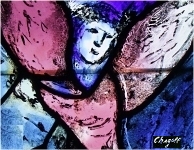
03.14.24 (II Adar 4, 5784) So much depends on how we look at things... Take the Tabernacle, or "Mishkan," for instance. Compared to the glories of the Egyptian pyramids, the Sphinx, the enormous temples at Thebes and other places, the Mishkan must have seemed unimpressive and a bit underwhelming. The Holy Place structure, for instance, measured just 20 x 20 cubits in size - a modest area covered in animal skins and curtains. Inside the tent structure (ohel) was placed the Menorah, the Shulchan (table), and the relatively small Golden Altar used to burn incense. The tent was further divided by a curtain (parochet) that cordoned off the Holy of Holies, a 10 x 10 cubit square section that contained the most sacred ritual object of all, namely, the Ark of the Covenant. All in all the Mishkan seemed to be a rather humble dwelling shrine when compared to the opulent structures of Egypt.
And yet it was here, hidden in plain sight, that the very Shekhinah Glory of the LORD was manifest, and it was here, in the midst of the darkness of the Holy of Holies, that the sacrificial blood was placed over the Ark that held the tablets of the law, representing our atonement in the Messiah. In the midst of the dark cloud, with the plume of incense rising, the High Priest offered up the blood "la'Adonai," designated as the Lord's, to heal us from our separation from his love and truth. And all this was a "pattern" to demonstrate the greater reality of the sacrificial death of Yeshua given on our behalf.
As the Book of Hebrews argues, Yeshua is the High Priest of the New Covenant of God, ordained of after the "order of Malki-Tzedek," the one who bears the office of High Priest not based on the Torah given at Sinai, based as it was on the weakness of the flesh, but by virtue of the power of the everlasting oath and the power of Almighty God (Psalm 110:4). As such Yeshua has made the New Covenant (הַבְּרִית הַחֲדָשָׁה) with those who trust in his sacrificial death offered for their sins. hose who belong to Him have a new altar not based on the temporary provision of the Levitical priesthood (Heb. 7:11; Heb. 13:10). And just as the humble tabernacle disguised the Divine Presence from the eyes of the proud, so the humility of Yeshua our High Priest was hidden. First he was born in obscurity and in poverty. He emptied Himself of regal glory to become "God with us," one who would bear our sorrows. For the cross at Calvary was the Altar by which His sacrificial blood was once and for all offered to secure for us an everlasting atonement (i.e., καταλλαγή, literally place of exchange: "life for life"). The cross of Messiah appears as "foolishness" to the proud eyes of this world, but to those who are saved it is the power of God (1 Cor. 1:18).
Hebrew Lesson
Isaiah 53:4 reading (click):
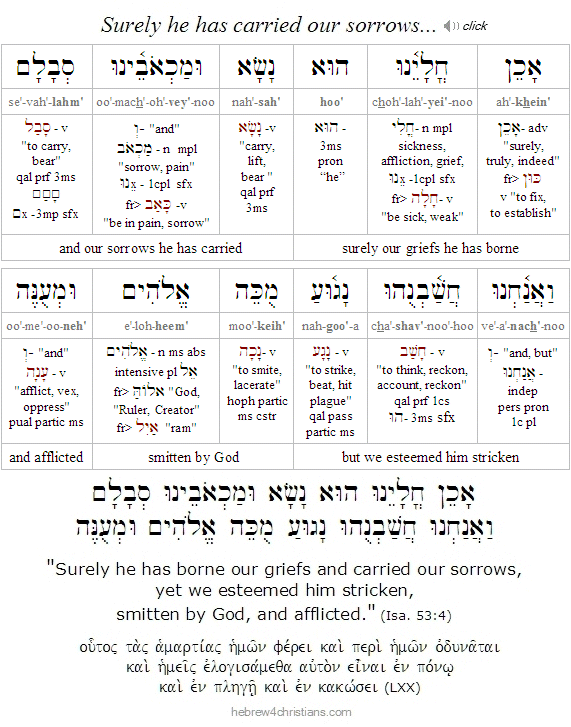 |
Accounting for the Lamb...
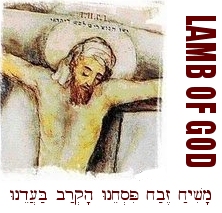
03.13.24 (II Adar 3, 5784) In our Torah portion for this week (i.e., Pekudei) we learn that Moses consecrated the Mishkan (Tabernacle) on Rosh Chodashim, that is, "the first day of the first month of the second year [since the Exodus]" (Exod. 40:17). Note that this date (i.e., Nisan 1) marks the start of the Biblical year and "Chodesh Yeshuah" (חודש הישועה), or the month of the Passover Redemption (Exod. 12:1-12). The Torah's calendar therefore begins with the advent of the Lamb of God (שׂה האלהים), just as the central sacrifice of the Tabernacle was the daily sacrifice (i.e., korban tamid: קרבן תמיד) of a defect-free male lamb offered with unleavened bread and wine. The LORD calls this "My offering, My bread" (see Num. 28:1-8). In other words, the service of the earthly Tabernacle was intended to constantly foreshadow the coming Lamb of God who would be offered within "greater and more perfect Tabernacle (משׁכּן גדוֹל וּמשׁלם) not made with hands" to secure the eternal redemption (פדוּת עוֹלמים) for us (see Heb. 9:11-12).
Hebrew Lesson
Exod. 12:2 reading with comments:
 |
As I've mentioned over the years, the climax of the Torah given at Sinai was the revelation of the Tabernacle. The two tablets of the law, summarizing the Ten Commandments, were stored inside the Ark of the Covenant (ארון ברית יהוה), the innermost place of the Tabernacle, a sacred "three-in-one" box. As such, the ark served as a symbol of kisei ha-kavod (כסא הכבוד), the very Throne of Glory. It stood entirely apart as the only furnishing placed in the Most Holy Place, or the "Holy of Holies" (קודש הקודשים). Upon the cover of the Ark (i.e., the kapporet: הכפורת) were fashioned two cherubim (i.e., angel-like figures) that faced one another (Exod. 25:17-18). According to the Talmud (Succah 5b), each cherub had the face of a child - one boy and one girl - and their wings spread heavenward as their eyes gazed upon the cover (Exod. 25:20). God's voice would be heard only in the midst of innocence, humility, purity, and hope... Each year during the Yom Kippur (יום הכיפורים) ceremony, the High Priest would sprinkle sacrificial blood seven times upon the cover of the Ark of the Covenant to dramatize cleansing from the law's verdict and the atonement of sin that would be secured through the blessing of the Messiah.
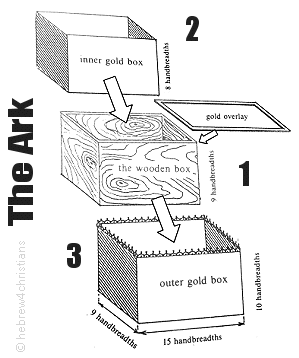 |
"But when the Messiah appeared as the High Priest (הכהן הגדול) of the good things that have come, then through the greater and more perfect tabernacle (not made with hands, that is, not of this creation), he entered once for all into the Most Holy Place (בקדשׁ הקדשׁים), not by means of the blood of goats and calves but by means of His own blood, thus securing for us the eternal redemption" (Heb. 9:11-12). Amen. The Scriptures teach that there is no Passover without accounting for the blood of the Lamb of God!
Hebrew Lesson
Rev. 5:12 Hebrew reading:
The Friend of Sinners...
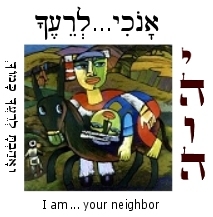
[ "God be praised that it is not because of my worthiness that God loves me. Otherwise, I might at any moment die of fear lest the next moment I cease to be worthy." - SK ]
03.13.24 (II Adar 3, 5784) "The Son of Man came ... and they say, 'Look at him! A glutton and a drunkard, a friend of tax collectors and sinners!'" (Matt. 11:19). People -- and especially the religious people -- were scandalized by Yeshua because he was a "friend of tax collectors and sinners!" Yet what sickness of heart is this, to despise those who are sick? It is a sorrow of heart to realize that religion often creates an "in-group" mentality that attains its status at the expense of the "outsider," the "stranger," the "sinner," and so on... The prayer of the self-righteous is always: 'God, I thank you that I am not like other people: extortionists, unrighteous people, adulterers – or even like this tax collector" (Luke 18:11).
The religious leaders of Yeshua's day were offended because he "welcomed sinners" and enjoyed eating meals with them (Luke 15:2). We can almost hear their disapproving whispers and their dismissive accusations: "How could a good Jew behave like this? Does he not understand the call to personal holiness? Does he not know the Torah of "clean" and "unclean"? If a man is known by the company he keeps, we know enough about Yeshua to know that he's not truly pious..." And to this very day the self-righteous find offensive the idea that God welcomes the sinful, the needy, the broken, the despised, and the "outsider" into His presence... As Yeshua said, "those who are well have no need of a physician," and indeed offering them God's cure will always be regarded as a kind of poison...
We greatly rejoice that God indeed is the friend of sinners; He is the Good Shepherd who seeks and saves the lost. Thank the Lord that he comes not for the "righteous" but for those who are brokenhearted, for those mortally wounded by their own sin... Any so-called theology or religion that repudiates or minimizes God's love for the sinful, the needy, the broken, is little more than a shrine to human pride and vanity... On the contrary: the heart of the Compassionate One always welcomes a sinner who sincerely turns to Him.
Hebrew Lesson
Psalm 23:3 reading (click):
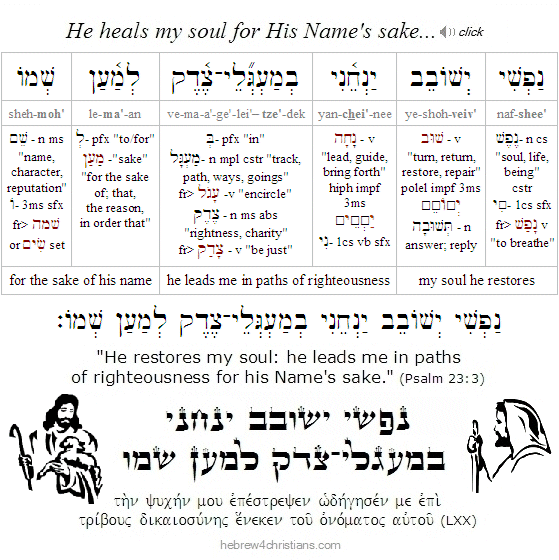 |
Choosing to Belong...
Taking the Exodus Story to Heart
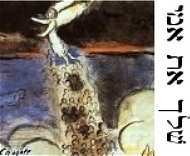
[ The following is related to our Torah reading this week, parashat Pekudei, which is the concluding portion of the great Book of Exodus... ]
03.12.24 (II Adar 2, 5784) The theme of the Book of Exodus (סֶפֶר שְׁמוֹת) essentially turns on two great events, namely, the deliverance of the Israelites from bondage in Egypt (i.e., yetzi'at Mitzraim: יְצִיאַת מִצְרַיִם) and the subsequent revelation given at Sinai (i.e., mattan Torah: מַתַן תּוֹרָה). Both of these events, however, are grounded in the deeper theme of God's faithful love (chesed ne'eman: חֶסֶד נֶאֱמָן) expressed by the blessing of blood atonement (i.e., kapparat ha'dam: כָּפָרָת הַדָּם). With regard to the former, the blood of lamb (as foreshadowed in Eden) was required to cause death to "pass over" (לִפְסוֹחַ) the houses of the faithful of Israel; with regard to the latter, the sacrificial system represented by the Mishkan (i.e., "Tabernacle") was designed to teach what I call the "korban principle" (i.e., ikaron ha'keravah: עִקָרוֹן הַקרָבָה), that is, that the only way to draw near to God is by means of sacrificial blood offered in exchange for (or in place of) the trusting sinner, as stated in the Torah, "For the life of the flesh is in the blood, and I have given it for you on the altar to make atonement for your souls, for it is the blood that makes atonement by the life" (Lev. 17:11), and likewise in the New Testament we read: "without the shedding of blood there is no forgiveness of sins" (Heb. 9:22).
Jewish tradition tends to regard the giving of the law at Sinai to be the goal of the entire redemptive process, a sort of "return from Exile" to the full stature of God's chosen people. Some of the sages have taken this a step further by saying that God created the very universe so that Israel would accept the law. Such traditions, it should be understood, derive more from rabbinical thinking devised after the destruction of the Second Temple than from the narrative presented in the written Torah itself, since is clear that the climax of the revelation at Sinai was to impart the pattern of the Mishkan (תבנית המשכן) to Moses. In other words, the goal of revelation was not primarily to impart a set of moral or social laws, but rather to accommodate the Divine Presence in the midst of the people. This is not to suggest that the various laws and decrees given to Israel were unimportant, of course, since they reflect the holy character and moral will of God. Nonetheless, it is without question that the Torah was revealed concurrently with the revelation of the Sanctuary itself, and the two cannot be separated apart from "special pleading" and the suppression of the revelation given in the Torah itself... The meticulous account of the Mishkan is given twice in the Torah to emphasize its importance to God. This further explains why Leviticus is the central book of the Torah of Moses. (For more on this, see "The Eight Aliyot of Moses.")
As we consider these things, however, it is important to realize that underlying the events surrounding deliverance and revelation is something even more fundamental, namely, the great theme of faith (אֱמוּנָה). This theme is our response to God's redemptive love. God's love is the question, and our response - our teshuvah - is the answer. The great command is always to "choose life!" We must chose to turn away from the darkness to behold the Light... Jewish tradition states there were many Jews who perished in Egypt during the Plague of Darkness because they refused to believe in God's love. Likewise, the revelation at Sinai failed to transform the hearts of many Jews because they despaired of finding hope.
As glorious as the redemption and revelation was, then, there was something even more foundational that gave "inward life" to God's gracious intervention. You must first believe that God loves you and regards you as worthy of His love; you must "accept that you are accepted." It is your faith that brings you near... This is the "Cinderella Story" of Exodus.
These themes of the Book of Exodus - and really of the Bible itself - will mean little to you unless you willingly identify with the calling of the Jewish people, and that implies that you reckon yourself as worth saving... You must see yourself as the recipient of divine affection and love. After all, without this as a first step, how will you make the rest of the journey? This is similar to the First Commandment revealed at Sinai: "I AM the LORD your God, who brought you out of the land of Egypt..." Notice that the statement, "I AM the LORD your God" (אנכי יהוה אלהיך) was uttered in the second person singular, rather than in the plural. In other words, you (personally) must be willing to accept the love of the LORD into your heart, since the rest of the Torah is merely commentary to this step of faith. Therefore the Book of Exodus is called Shemot (שְׁמוֹת), "names," because it sees every person as worthy of God's redeeming love and revelation. "For God so loved the world..." (John 3:16).
The midrash says that only one out of five of the children of Israel made it out of Egypt; some say one out of fifty, and some say one out of five hundred (see Mechilta). As Yeshua said: "Many are called, but few are chosen" (Matt. 22:14). Those who directly experienced God's deliverance in Egypt first of all believed they were redeemable people. Before anything else they made a decision to receive hope within their hearts. The blood of the original Passover lamb was a smeared as sign of their faith that God would accept them. We also must begin here. This is the start of the journey. We step out by faith, leaving behind the familiar - including the dark familiarity of our sin and shame - and venture out into the unknown. We venture out in hope because we trust the promises of God (הַבְטָחוֹת יהוה).
The journey of faith (מַסָע הַאֱמוּנָה) is marked with testing (בְּדִיקַת אֱמוּנָה). Being called out of the world leads you into the desert places. Faith is not something static, like a church creed or theology handbook. There are stony places, dangers, and difficulties that attend the way. We move out from "walled cities" into tents, traveling as "strangers and sojourners" on our way to a promised heavenly city. Therefore the Scriptures state that "by faith Abraham went to live in the land of promise, as in a foreign land, living in tents with Isaac and Jacob, heirs with him of the same promise. For he was looking forward to the city that has foundations, whose designer and builder is God" (Heb. 11:9-10). The way back home is the same for all who "cross over" from this world to the next. It is the way of hope, trust, and surrender.
The story of divine deliverance is not the story of "other people"; it is not a story told in the "third person." You must choose to belong. Again, your faith draws you near. That is why the sages teach: b'chol dor vador - in each and every generation an individual should look upon him or herself as if he or she (personally) had left Egypt. It's not enough to recall, in some abstract sense, the deliverance of the Jewish people in ancient Egypt, but each Jew is responsible to personally view Passover as a time to commemorate their own personal deliverance from the bondage of Pharaoh. The same must be said regarding Shavuot. Each person should consider himself as having personally received revelation at Sinai. The altar of the Mishkan was set up for you to draw near to God - you, not some people who lived long ago... This is why non-Jews who turn to the God of Israel by putting their trust in the Messiah are regarded equal members in the covenants and promises given to ethnic Israel. It is a brit milah (בְּרִית מִילָה) - literally, a "covenant of the word" - that makes us partakers of the covenantal blessings given to Abraham (Eph. 2:12-19; Gal. 3:7; Col. 2:11, etc.).
The narratives of the Book of Exodus, like other narratives of the Torah, often function as parables of faith (i.e., mishlei emunah: מִשְׁלֵי אֱמוּנָה). "The deeds of the fathers are signs for the children." Signs of what? Of the coming Messiah, as Yeshua Himself attested and the apostles likewise affirmed (John 5:46; Luke 24:27;44; Matt. 13:52; 2 Tim. 3:14-17). The Mishkan (i.e., "Tabernacle") itself was a metaphor of God's redemption (גְּאוּלַת יהוה) embodied in Yeshua. The Mercy Seat (kapporet) represented the Throne of God (Heb. 4:16; 2 Ki. 19:15) where propitiation for our sins was made (Rom. 3:25). Indeed, the word Mishkan (מִשְׁכָּן) is related to the word mashkon (מַשׁכּוֹן), a pledge or "promise on loan." The Tabernacle functioned as a "loan" to Israel until the Messiah came to establish the true Temple (הַאֲמִיתִי הַמִּקְדַשׁ) by means of His atoning sacrifice (Gal. 3:19). The law (ספר הברית) is called a "schoolmaster" meant to lead to the Messiah and His Kingdom rule (Gal. 3:23-26). The glory of the Torah of Moses was destined to fade away (2 Cor. 3:3-11), just as its ritual center (i.e., the Tabernacle/Temple) was a shadow (צֵל הַמִצִיאוֹת) to be replaced by the greater priesthood of the Messiah (כְּהוּנָת הַמָּשִׁיחַ; see Heb. 10:1; 13:10). "Now we are released from the law, having died to that which held us captive, so that we serve in the new way of the Spirit (הַדֶּרֶך הַחֲדָשָׁה שֶׁל הָרוּחַ) and not in the old way of the written code (Rom. 7:6). Yeshua is the Goal of salvation (מְטָרָת הַיְשׁוּעָה) and the "Goel" (i.e., גּאֵל, Redeemer) from the curse of the law... "For the law made nothing perfect, but on the other hand, a better hope is introduced, and that is how we draw near to God" (Heb. 7:19). When the veil is taken away, Yeshua appears on every page of Scripture... (For more on this, see "Why then the Law?," and "Paul's Midrash of the Veil").
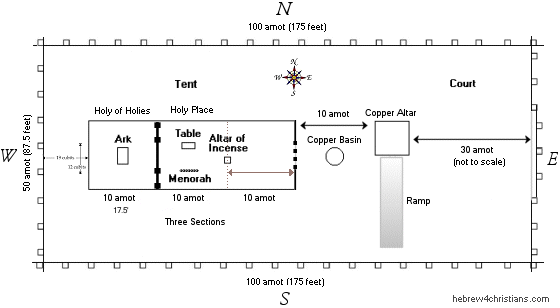 |
Outside the Mishkan, beyond the outer court, are the raw, "natural" experiences of life. This is the realm of the carnal flesh and the "dust to dust, ashes to ashes" despair of olam ha'mavet (עוֹלָם הַמָּוֶת). Genuine spiritual life (חיים רוחניים) is found when you come in through the gate (בְּדֶּרֶך הַשָׁעָר). You must understand that the gate is there for you to pass through. The cross of Yeshua is the altar where He died for you, personally, for your atonement with the Father (מִזְבֵּחַ הַכָּפָּרָה). His blood was presented between the outstretched wings of the cherubim so that you could come before God "panim el panim," that is, personally, "as a man speaks to his friend" (Heb. 4:16). Your faith bridges the gap between the Holy of Holies of the Cross (הַקֹדֶשׁ הַקֳּדָשִׁים שֶׁל הַצְּלָב) and the sanctuary of your heart...
Hebrew Lesson
Isa. 43:1b Hebrew reading:
Breath of your Life...
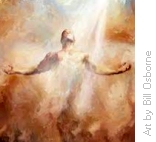
03.12.24 (II Adar 2, 5784) "And the LORD God formed man of the dust of the ground, and he breathed into his nostrils the breath of life (i.e., nishmat chayim: נִשְׁמַת חַיִּים); and man became a living being" (Gen. 2:7). We learn from this verse that man's neshamah (soul) comes from the very breath of God. Just as the body returns to dust, so the neshamah returns to God. The neshamah - not the body - is what is essential to our being, and that is why the sages regard the day of one's death as better than the day of one's birth (Eccl. 7:1). The Apostle Paul also regarded the godly discipline of the soul to be of greater value than discipline of the body: "For bodily exercise profits a little, but godliness (חֲסִידוּת) is profitable for all things, having promise of the life that now is and of that which is to come" (1 Tim. 4:8).
The 613 commandments of the Torah are distilled to the principle: "A righteous person finds life through faith" (Hab. 2:4), which means that education of our soul in matters of faith is the essential task of our life in this world, and indeed, it is education for eternity!
Hebrew Lesson
Psalm 4:5 reading (click for audio):
 |
Thoughts on this week's parashah:
Seeing the Good...

[ "According to your faith be it done unto you..." ]
03.12.24 (II Adar 2, 5784) We are instructed to see small miracles, everyday "signs and wonders..." The sages say that a verse from our Torah portion (i.e., parashat Pekudei) suggests that everyone is obliged to recite at least 100 blessings a day: "... a hundred sockets for a hundred talents of silver, one talent per socket" (Exod. 38:27). The Gerer Rebbe comments, "Just as hundred sockets served as the foundation for the sanctuary, so daily blessings represent the soul's foundation in holiness."
In Jewish thinking, we "bless" God by offering our thanks, and thereby consciousness of life is sanctified. The Hebrew term for gratitude is hakarat tovah (הַכָּרַת טוֹבָה), a phrase that means "recognizing the good." The heart looks through the eye, and therefore how we choose to see is a spiritual decision: "If your eye is "single" (i.e., ἁπλοῦς, sincere, focused)," Yeshua said, "your whole body will be filled with light" (Matt. 6:22). When we see rightly, we will behold the radiance of God pervading our way, even in the midst of our mundane affairs (Isa. 6:3). A grateful heart is awake to God's Presence in the little things of life, those small miracles and glories that constantly surround us. And just as the manna would taste according to the gratitude of the person eating, so it is with the inner vision of truth: The good eye of faith sees hundreds of reasons to bless God for the precious gift of life. God is "enthroned among the blessings of His people" (Psalm 22:3).
The sages warn that in the case of doubt, however, one should not make a blessing that invokes God's Name, since doing so violates the commandment not to lift up the Name of the LORD for vain reasons. Ironically enough, those who make an "idol" out of the Name of God are lifting up the name in vain! It is preferable not to pray than to do so insincerely or without heart.... On the other hand, surely God invites our requests, and therefore a prayer offered be'emunah shelemah, with complete faith, will be heard in heaven. As it is written in the New Testament: "And this is the confidence (i.e., παρρησία, freedom to speak honestly) that we have with him, that if we ask anything according to his will he heeds us. And if we know that he heeds us in whatever we ask, we know that we presently have the requests that we have asked of him" (1 John 5:14-15).
If you want to see blessing, then you must open your eyes. The "commandment" here is more of a mitzvah, that is, an opportunity to connect with God's heart -- to become alive and awake! The idea is that you "get to" see the miracle, not that "you must" see it. It is always a choice to believe (Col. 3:15).
Hebrew Lesson
Prov. 11:27 Hebrew reading:
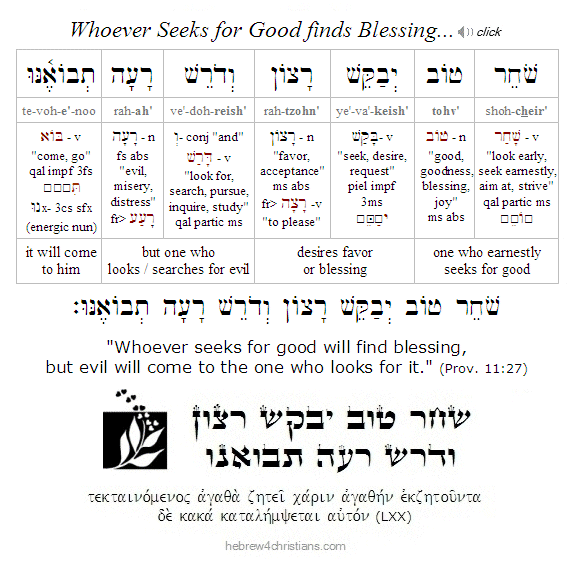 |
Knowing Life in God...
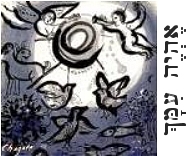
03.11.24 (II Adar 1, 5784) The name of the Lord is YHVH (יהוה), which comes from a root word meaning existence (i.e., hayah: היה, to be). It is this name that gives existence to creation, as it says, "in him all things hold together" (τὰ πάντα ἐν αὐτῷ συνέστηκεν; Col. 1:17) and by his power "all things are carried" (φέρων τε τὰ πάντα; Heb. 1:3).
In God we "live and move and have our being" (Acts 17:28) and "from him and through him and to him are all things" (Rom. 11:36). Some people think of "eternal life" as unending life or immortality of the soul, but eternal life (i.e., chayei olam: חַיֵּי עוֹלָם) transcends the idea of time and is centered in relation to the Living God, right now, wherever we are... Therefore Yeshua says to his followers, "Live in me and I will live in you" (John 15:4). We need not fear death, then, because we partake in the overcoming life of God given in Yeshua: there is no ultimate separation from his love. We have the "now" covenant with our Lord forever!
When we live in Messiah our true life is "concealed" and we pass over from the temporal world of shadows to the world of reality, from fear to comfort, from darkness to light. We "lose our life in order to find it" (Luke 17:33). The walk of faith surrenders all that this life may promise for the sake of finding true life in God.
Hebrew Lesson
Psalm 139:5 Hebrew reading (click):
Finding Purity of Heart...
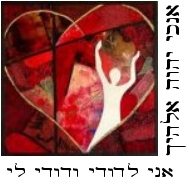
03.11.24 (II Adar 1, 5784) "Who shall ascend to the hill of the LORD? or who shall stand in his holy place? The one who has clean hands and a pure heart, who does not lift up his soul to vanity (לא־נָשָׂא לַשָּׁוְא) and who does not swear deceitfully" (Psalm 24:3-4).
Yeshua expounded: "Blessed are the pure in heart, for they shall see God'" (Matt. 5:8). The Greek word translated "pure" is katharos (καθαρός), sometimes used describe the cleansing of a wound (catharsis), or to describe the unalloyed quality of a substance revealed through refining fire (the corresponding Hebrew word for the "pure of heart" (בַּר־לֵבָב), used in Psalm 24:4, comes from a root (בָּרַר) that likewise means to purify by fire). Metaphorically, then, purity of heart refers to separation from the profane - singleness of vision, wholeheartedness, passion, and focused desire for the sacred. As the Beatitudes reveal (Matt. 5:3-8), only those who are impoverished in spirit, who mourn over themselves and hunger for God's mercy, are refined by their struggle to see God (the Greek text implies these will see God now – with inward vision – and in the world to come). Because the pure in heart use ayin tovah, the good eye, they walk "in the light, as He is in the light" (Matt. 6:22).
When we are undivided in heart, the Spirit imparts to us a hidden wisdom (1 Cor. 2:6-7) and we are able to discern hidden realities that others do not see (1 Cor. 2:14). As we center our affections on Yeshua, we become unified, made whole, and healed of our inner conflicts. We see the Lord both in this world, through his effects, and then panim el panim (פָּנִים אֶל־פָּנִים), "face to face," in the world to come. Our hope purifies us for the coming day of full disclosure (1 John 3:2-3; Heb. 12:14).
Hebrew Lesson
Psalm 86:11 reading (click):
The heart is a miracle, an "engine" that distributes life, and the heartbeat is a great mystery, inexplicably pulsing with energy, contracting the muscles, pumping blood.. The pulse of the heart, then, is the "center of the center" of a person's physical life... If we are impure of heart, we will be inwardly divided, unfocused, fragmented, filled with destabilizing anxiety, envy, anger, and so on. More tragically, because we seek to escape ourselves, we will be devoid of a true center, without a focal point or abiding purpose, and therefore we will be lost to ourselves, wandering and without rest....
Note: I decided to pronounce the sacred name YHVH in this post. For more information about the phonetics of the Name of the LORD (YHVH) see: The Sacred Name YHVH.
The Beginning and End...

03.10.24 (I Adar 30, 5784) The concluding portion of the Book of Exodus (i.e., Pekudei) provides details about the construction of the "Tabernacle" (i.e., mishkan: מִשְׁכָּן) and its furnishings as well as the special clothing of the priests. At the very end of the portion we read, וַיְכַל משֶׁה אֶת־הַמְּלָאכָה / "and Moses finished all the work" (Exod. 40:33), a phrase that has the same gematria (numeric value) as bereshit (בְּרֵאשִׁית, "in the beginning"), the very first word of the Torah (Gen. 1:1). This suggests that the very creation of the universe was for the sake of the building of the Altar of God, and by extension, for the sake of the sacrificial love of God to be demonstrated to all of creation....
The Talmud states, "All the world was created for the Messiah" (Sanhedrin 98b) and indeed, Yeshua is called "the Lamb slain from the foundation of the world" in the New Testament (Rev. 13:8; 1 Pet. 1:18-20; Eph. 1:4; 2 Tim. 1:9). "All things were created by Him (i.e., Yeshua), and for Him" and in Him all things consist (συνεστηκεν, lit. "stick together") (Col. 1:16-17). Creation therefore begins and ends with the redemptive love of God as manifested in the Person of Yeshua our Moshia, the great Lamb of God... He is the Center of Creation - the Aleph and Tav - the Beginning and the End (Isa. 44:6; Rev. 1:17).
Some of the Jewish sages said that "the seal of God is truth," since the final letters of the three words that conclude the account of creation -- bara Elohim la'asot ("God created to do" [Gen. 2:3]) -- spell the word for truth (i.e., emet: אֱמֶת):
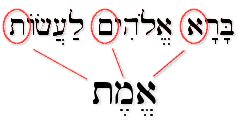 |
The idea that God created the world "to do" implies that He had finished all His work of creation (and redemption) after the sixth day (Heb. 4:3), which is yet another way of saying that Yeshua is the Lamb slain from the foundation of the world. Salvation is not an afterthought or "plan B" of God's purpose for creation. "Before Abraham was, I AM." Our LORD Yeshua always is the Way, and the Truth, and the Life for us (John 14:6).
Hebrew Lesson
Rev. 1:8 Hebrew reading:
Glory Fills the Temple
Parashat Pekudei...

[ "There is a God-shaped hole in the life of every man..." ]
03.10.24 (I Adar 30, 5784) Chodesh tov, talmidim, and thank God for another opportunity to study Torah and the precious truths of the Lord... Our Torah reading for this week is called parashat Pekudei, which is the concluding portion of the Book of Exodus (i.e., ספר שמות). It begins with Moses' accounting of (פקודי) all the materials that were donated for the construction of the Mishkan (i.e., Tabernacle). After Moses recorded the inventory of the building materials and furnishings, he carefully checked the special priestly garments. After all the work was confirmed to be in complete accordance with the LORD's instructions, Moses blessed the people. The LORD then commanded Moses to assemble the Mishkan on "the first month in the second year [from the date of the Exodus], on the first day of the month" (i.e., on Nisan 1, or Rosh Chodashim, Exod. 40:17).
Once the Tabernacle was completed and all its vessels were accounted for and inspected, Moses anointed all its components with the sacred anointing oil, called shemen ha-mishchah (note that the word "mishchah" (מִשְׁחָה) comes from the same root as "Messiah" (מָשִׁיחַ), indicating that the Mishkan (i.e., Tabernacle) would foreshadow God's plan of redemption given in Yeshua). Moses then formally initiated Aaron and his four sons into the priesthood, marking their hands and feet with sacrificial blood and "waving them" before the Lord to picture resurrection. God's Presence - manifest as the Shekhinah Cloud of Glory – then filled the Holy of Holies in the Tent of Meeting.
At the end of the portion we read, וַיְכַל משֶׁה אֶת־הַמְּלָאכָה / "Moses finished all the work" (Exod. 40:33), a phrase that has the same gematria (numeric value) as bereshit (בְּרֵאשִׁית, "in the beginning"), the very first word of the Torah (Gen. 1:1). This suggests that the creation of the universe was for the sake of the building of the Tabernacle, and by extension, for the sake of the sacrificial love of God to be demonstrated to all of creation. The Talmud states, "All the world was created for the Messiah" (Sanhedrin 98b) and indeed, Yeshua is called "the Lamb slain from the foundation of the world" in the New Testament (Rev. 13:8; 1 Pet. 1:18-20; Eph. 1:4; 2 Tim. 1:9).
The Presence of the Glory of God that descended from Sinai upon the newly dedicated Mishkan represented a climactic moment for the fledgling nation, since the Sin of the Golden Calf had jeopardized whether the God would indeed dwell within the midst of the camp of Israel... Recall that it was only after Moses had returned from Sinai bearing the second set of Tablets (on Yom Kippur) that the glow of the LORD's redeeming love radiated from his face, and new hope was given to Israel (prefiguring the New Covenant). The King of Glory would accompany the people from Sinai to the Promised Land! (The narrative continues in the Book of Numbers, beginning exactly one month after the Mishkan was assembled.)
Sanctity and the Sabbath...
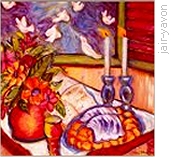
[ The Sabbath is a "sign" (אוֹת) of faith in the heart of a Jew... (Exod. 31:17). ]
03.08.24 (I Adar 28, 5784) Our Torah portion this week (i.e., Vayakhel) begins this way: "And Moses assembled (וַיַּקְהֵל מֹשֶׁה) all the congregation of the people of Israel and said to them, "These are the things that the LORD has commanded you to do. Six days work shall be done, but on the seventh day you shall have a Sabbath of solemn rest (שַׁבַּת שַׁבָּתוֹן), holy to the LORD..." (Exod. 35:1-2). The prohibition to abstain from profane activities on the Sabbath day was intended to set apart God's people as his own treasured possession (Deut. 5:14-15). The sages further note here that this commandment refers not only to the commandment to keep the Sabbath day, but also refers to our duty to work as well...
Indeed the idea of the holiness of the Sabbath day finds its structure and meaning as an oasis within the context of doing work (melachah), setting itself apart from the profane, to both signify the sacredness of the realm of "being" over "doing," but also to consecrate our "doing" as a matter of service before God.
Practically speaking this means that we will be yashar (honest, upright) about how we use of time, and particularly so about how we work at our jobs or do what is expected of us. We are to "redeem the time" by honoring the Lord with the sacred gift of our lives. O Lord, teach us to number our days aright so that we attain a heart of wisdom" (Psalm 90:12). Amen.
Hebrew Lesson
Psalm 90:12 reading (click):
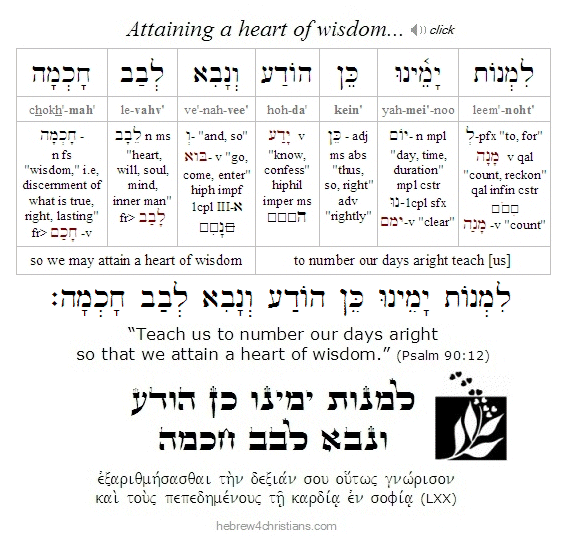 |
Presence and Peace...
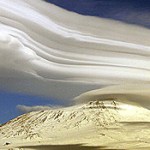
03.08.24 (I Adar 28, 5784) The name YHVH (יהוה) means "God is Present" (תָּמִיד בְּכל מָקוֹם) and "God is always near" (תָּמִיד לְיַד) - as close as your own heart. The LORD is near, even should you feel lost and far away.... We can attune ourselves to hear God's "still, small voice" (קוֹל דְּמָמָה דַקָּה) when we are quieted, not when we are surrounded by the crowd and its cheers or its murmurings. God cannot be found in noise and restlessness, much less in the fear-mongering and noise of this world. "God is the friend of silence. See how nature - trees, flowers, grass- grows in silence; see the stars, the moon and the sun, how they move in silence... We need silence to be able to touch souls." For thus said the Lord GOD, the Holy One of Israel, "In returning and rest you shall be saved (בְּשׁוּבָה וָנַחַת תִּוָּשֵׁעוּן); in quietness and in trust (בּהַשְׁקֵט וּבְבִטְחָה תִּהְיֶה גְּבוּרַתְכֶם) shall be your strength" (Isa. 30:15).
"Be still and know (הַרְפּוּ וּדְעוּ) that I am God, I will be exalted among the nations, I will be exalted in the earth." Note that the Hebrew verb translated "be still" (i.e., rapha: רָפָה) means to let go, to stop striving, to relinquish control, and to surrender your life and indeed the fate of the world to the care of God... "Being still" means finding serenity and inner peace by completely trusting in God's providential plans for good... As it says in our Torah: hityatzevu u'reu et yeshuat Adonai (הִתְיַצְבוּ וּרְאוּ אֶת־יְשׁוּעַת יְהוָה): "Stand firm and see the salvation (i.e., Yeshua) of God" (Exod. 14:13). As Blaise Pascal said, "All men's miseries derive from not being able to sit quietly in a room alone." This is because many people cannot live with themselves and seek escape; they therefore are compelled to seek release through the buzz and noise of what lies outside of themselves.... God is not the author of confusion: We experience the Spirit of God by receiving heavenly peace: "Stop your striving and know that I am God."
One of the Ten Commandments is to rest in the LORD your God (Exod. 20:8-11), which is a picture of the "set table" the LORD provides for us as his children. The deepest principle of Sabbath is that we are set free from our striving and can open our hearts to God's gracious love... "Salvation is of the LORD," and we rest in the what the Lord has done for us. "If you call the Sabbath a delight; if you honor it, then you shall take delight in the LORD, and I will make you ride on the heights of the earth; I will feed you with the heritage of Jacob your father, for the mouth of the LORD has spoken" (Isa. 58:13-14).
Hebrew Lesson
Psalm 46:10 reading (click for audio):
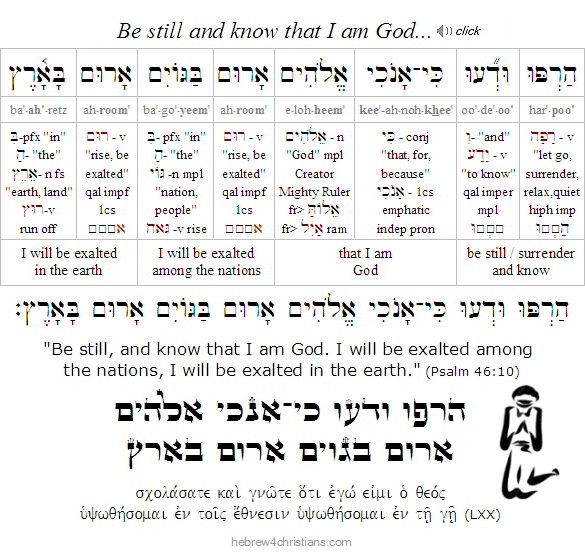 |
Life from the Dead...
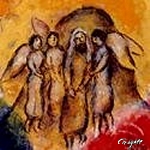
03.07.24 (I Adar 27, 5784) When Yeshua told his students to "raise the dead" (Matt. 10:8), he meant to bring life to the dying souls of others - to give them comfort, hope, and life-giving, resurrection power... As the parable of the "Prodigal Son" teaches, the father's heart longs to receive those who have wasted their lives and failed miserably (Luke 15:11-32). The person who genuinely turns to God, even after a lifetime of failure and sin, may be able to experience a deeper sense of God's grace than someone who unthinkingly obeyed the rules for purposes of self protection. This is the reversal of parable: the younger son finds acceptance whereas the older son finds himself struggling... If you are a returning son, the memory of your wasted life can help you to remain honest about your teshuvah; if you are a "dutiful son," the grace of the father can help you learn to accept yourself.
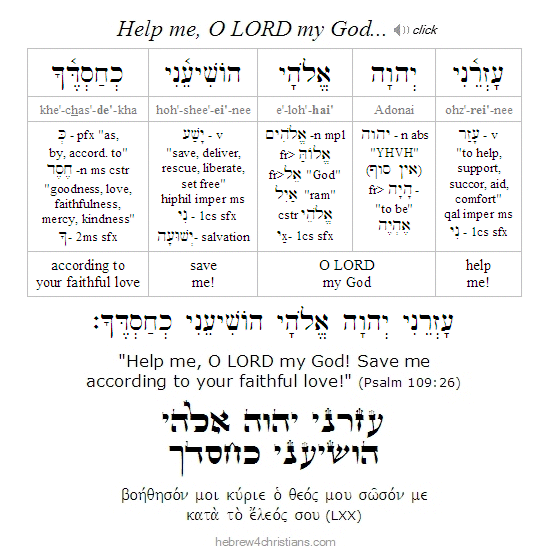 |
Note: Some people have sought to correct me about this post, supposing that I am saying the "resurrection" is only metaphorical or a matter of faith. I hope it is apparent to those of you familiar with my teaching over the last 25 years, however, that I am not a heretic that denies the physical (bodily) resurrection from the dead or who regards the miracles of the Lord as simply "metaphors," and so on. I will say, however, that it is not normative for followers of Yeshua to literally raise people from the dead, since these sorts of signs were given for the generation of Messiah's first coming, something like the special dispensation of miracles that accompanied Moses during the time of the redemption in Egypt... There are real miracles, but they come from the hand of God according to His good pleasure and purposes. Shalom.
Seeing your Redeemed Face...
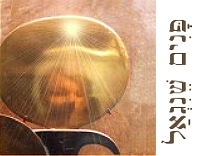
"And he (i.e., Betzalel) made the large basin of bronze and its pedestal of bronze from the mirrors of the women who served at the entrance of the tent of meeting" (Exod. 38:8).
03.07.24 (I Adar 27, 5784) At the entrance of the Mishkan (i.e., "Tabernacle") a copper "laver" (i.e., wash basin or cistern) was built, the place where we wash and prepare ourselves to come before the Divine Presence (Exod. 30:18). The Torah says the basin was made from the mirrors of women who offered them to help build the sanctuary (see Exod. 38:8). Spiritually understood, the mirror was transformed from a place where we encounter our own appearance to a place where we encounter God. Instead of focusing on our superficial face – how it looks and how we esteem ourselves, we now see ourselves in light of God's love, with our former self-image "sacrificed" or surrendered for the gift of a deeper self (2 Cor. 5:16). This is the "new self" cleansed by the Word of God, reflecting back the radiance of His Presence, as it says: "put on the new self (הָאָדָם הֶחָדָשׁ) created after the likeness of God in true righteousness and holiness" (Eph. 4:24).
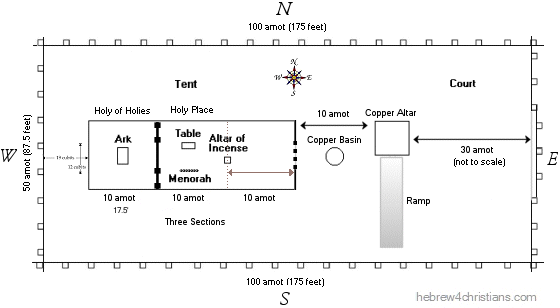 |
The "sacrificed mirror" represents turning to face reality, to see ourselves as God see us... Because of Yeshua, we have access to the inner heart of God (Heb. 4:16). Know who you are in Messiah: "And we all, with unveiled face, beholding the glory of the Lord, are being transformed into the same image from one degree of glory to another. For this comes from the Lord who is the Spirit" (2 Cor. 3:18).
Hebrew Lesson
Proverbs 31:30 reading (click for audio):
The Path of the Righteous...
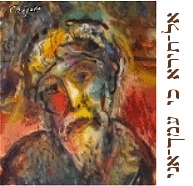
03.06.24 (I Adar 26, 5784) Each of us has been created by God for a sacred purpose. There is a deep reason why you were born. This explains why we sometimes feel lost and alone in this life. Our discontent, the fracture we sense both within and around us, our sorrows, suffering, and inevitable losses, all of it together, presents a "message" to our souls, a "basso profundo" groan of the heart, a visceral yearning for healing, for eternal life, for heaven... God has created us for himself, yet we find no lasting peace apart from him (Eccl. 3:11). Or as Augustine of Hippo famously put it: "Thou hast made us for thyself, O Lord, and our heart is restless until it finds its rest in thee" (Confessions). Therefore our Lord cries out to those who are hurting, troubled, and afraid: "Come to me, all who labor and are heavy laden, and I will give you rest. Take my yoke upon you, and learn from me, for I am gentle and lowly in heart, and you will find rest for your souls" (Matt. 11:28-29).
We are called by God to turn and reconnect to our spiritual essence, our identity, our heart. We have to start the journey there, because ultimate reality is intensely personal, being grounded in the "who-ness" of God. It is within the consciousness of our own "I am," our deepest identity as a personal, thinking, and feeling being, and because of that are we able to relate to the person and heart of the great "I AM" of the LORD.
Abram is an exemplar of faith for us; he is called the "father of faith" (Isa. 51:1-2; Rom. 4:16; Gal. 3:29). Abram courageously searched for God in his emptiness, and God graciously answered the cry of his heart. He left everything behind as he journeyed into the realm of promise - regarding himself as someone chosen to know God's blessing and grace. Abram was able to walk by faith because he stopped listening to the voices of the ego - the worldly and unbelieving parts of himself - and therefore was able to hear God's truth.
According to the classical sages, Abram was tested ten times in the course of his life. In the first test, Abraham was asked to "go to a land that I will show you" only to find it a place of famine and trouble. In the last of the tests, Abraham was asked to "go to the land of Moriah, to the place that I will show you," and there to offer up his promised son Isaac as a burnt offering... In each case the temptation was to give up hope in God's promise, since at the time of each test Abram did not know the outcome as a foregone conclusion. Nevertheless Abram walked in faith, in fear and trembling, yet fear contextualized by the deeper strength found in God's love and presence. Abraham had to close his eyes to this world and walk in the darkness of faith to see the divine light that transcends this realm; he had to "believe to see" that God's promise was sure.
So the journey is one of faith and the inner transformation that comes from trusting in God (i.e., bittachon: בִּטָּחוֹן). "Go from your country and your kindred and your father's house to the land that I will show you" is the call of teshuvah - turning away from enslaving habits that deaden our consciousness - and to come alive by believing that which transcends own understanding. The Greek word for repentance, "metanoia" (μετάνοια) describes the process well, since it means going beyond ("meta") the habitual categories of the mind ("nous") to believe and apprehend the miracle of God. Faith discerns the unseen good that is at work behind the realm of appearances. God is the "Father of Lights" who supervises the ebb and flow of creation. He is always working to direct all things according to his purposes and will. This is the "land that I will show you," that is, the realm of blessing and eternal life.
Hebrew Lesson
Proverbs 4:18 reading (click):
The Danger of Drifting...

03.06.24 (I Adar 26, 5784) We are living in an age of peril, and for all the more reason we must "pay more careful attention to what we have heard so that we do not drift away" (Heb. 2:1). We must be anchored to the truth lest we become shipwrecked in our faith. Drifting is often imperceptible, and occurs slowly, though the end result is as deadly as openly turning away from God in outright apostasy. As C.S. Lewis once wrote, "The safest road to hell is the gradual one - the gentle slope, soft underfoot, without sudden turnings, without milestones, without signposts." The grave danger today is to quietly and invisibly give up hope, to unconsciously "go with the flow," to become comfortably numb, to fall asleep, and therefore to die inside... It is far more dangerous to ignore God's mercy, or to make a pretense of knowing God's grace, than it is to blatantly break his law. Therefore the urgent need is to remember, to hear, and to awaken the soul to face the truth about reality. We must focus the heart, concentrate the will, and consciously "set" the Lord always before us (Psalm 16:8). Each day we must awaken from our emptiness to reaffirm the central truth: "Shema Yisrael, Adonai Eloheinu, Adonai echad; and you shall love the LORD your God with all your heart and with all your soul and with all your might" (Deut. 6:4-5). "Awake, you who sleep, Arise from the dead, And Christ will give you light" (Eph. 5:14).
We must press on to secure our high calling in Messiah: "Let us know; let us press on to know (i.e., נִרְדְּפָה, "pursue after") the LORD; His going out is sure as the dawn; He will come to us as the showers, as the spring rains that water the earth" (Hos. 6:3). May God help us pursue him be'khol levavkha - with all our heart - because He has promised, "You will seek me and find me, when you seek me with all your heart" (Jer. 29:13). And may the love of the LORD indeed be upon us, even as we put our hope in Him (Psalm 32:22). Amen.
Hebrew Lesson
Psalm 33:22 Hebrew reading:
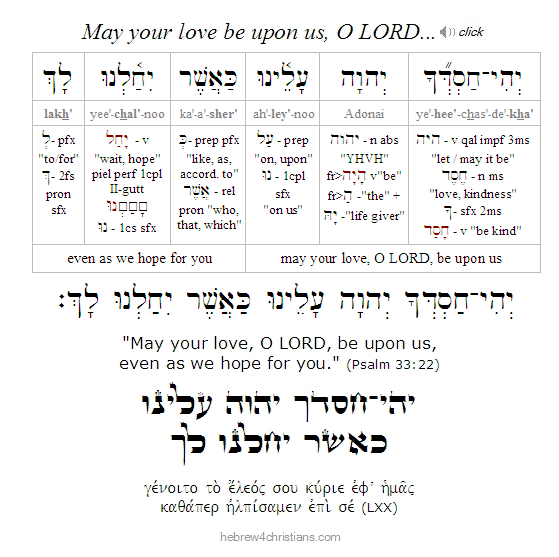 |
Trust in Affliction...
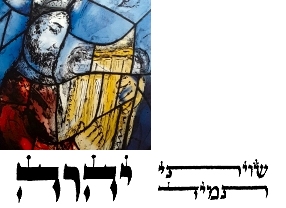
03.05.24 (I Adar 25, 5784) Some of us seek "mountain top" experiences of God, but more often than not we learn "down in the valley," where the daily cares of life encroach upon our ideals and visions. Yet it is precisely there, in the "desert of the everyday," in the "testing of the tedious," in the "hazards of hopelessness," that we are enabled to elevate our consciousness to realize that God is "ezra ve'tzarot nimtza me'od" (עֶזְרָה בְצָרוֹת נִמְצָא מְאד) - a "very present help in our troubles" (Psalm 46:1).
Amen, God is aware of our frustration, our lowliness, our fear, our suffering... When God delivered his people by the miracle of splitting the sea (קריעת ים סוף), he closed off any way of escape apart from his direct intervention. The Egyptian army was behind them, the mountains hemmed them in, and the vast horizon of the sea loomed before their way. The only way of deliverance was from above, in the midst of our struggle, by God's own hand. Trust in God's healing and deliverance is the first step... The LORD is the Rock and all his ways are perfect (Deut. 32:4), and this must be affirmed especially if we cannot fathom the testing of our present circumstances...
Hebrew Lesson
Psalm 46:1 reading (click):
Remembering the Future...
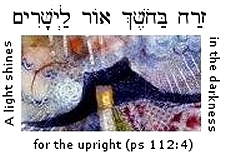
03.05.24 (I Adar 25, 5784) When we experience troubles and sorrows in our lives, we must "remember the future," for our salvation and destiny is bound up in the truth of hope (Rom. 8:24; Heb. 11:1). We must call to mind the great promises of God and believe that there is indeed a blessed time of healing and deliverance awaiting us, even if we must abide in the shadow of its substance for a bit longer: "For behold, the Day is coming (הַיּוֹם בָּא), burning like an oven, when all the arrogant and all evildoers will be stubble. The Day that is coming shall set them ablaze, says the LORD of hosts, so that it will leave them neither root nor branch. But for you who fear my Name, the Sun of Righteousness (שֶׁמֶשׁ צְדָקָה) shall rise with healing in its wings. You shall go out skipping like calves released from the stall. And you shall tread down the wicked, for they will be ashes under the soles of your feet, on the day when I act, says the LORD of hosts" (Mal. 4:1-3).
The "Sun of Righteousness," Shemesh Tzaddik (שֶׁמֶשׁ צְדָקָה), is Yeshua the son of David, the ascended life-giving Healer of God. Of Him it is said, "The LORD God is a sun and a shield" (Psalm 84:11) and "the LORD shall be to thee an everlasting Light (אוֹר עוֹלָם), and thy God thy glory; thy sun shall no more go down, for the Lord shall be thine everlasting light" (Isa. 60:19-20). The Divine Light will shine on those who receive God's righteousness, that is, on those who put their trust in the One who said, 'I am the Light of the world' (John 8:12).
Yeshua is melech ha-kavod (מֶלֶךְ הַכָּבוֹד), "the King of Glory" -- and no one can stand before the blinding power of His countenance (Psalm 27:4; Rev. 1:8-19). His is the "Fountain of Light" for all of creation, the Source and End of all life: "For by Him all things were created, in heaven and on earth, visible and invisible, whether thrones or dominions or rulers or authorities -- all things were created through Him and for Him. And he is before all things, and in him all things hold together... that in everything He might be preeminent" (Col. 1:16-18). Yeshua will come "with healing in his wings" -- that is, in healing radiance, with rays and beams, which metaphorically describe His influence over the hearts of men... Note that the word for "wings" used in this passage (i.e., kanaf: כָּנָף) pictures the image of a heavenly tallit (טַלִּית), or the heavenly firmament (רָקִיעַ) of the LORD's sheltering Presence.
So "remember your future," chaverim, the day draws near! Let us not grow weary. Let us renew our hearts and confess the truth of God's blessing in our hearts. "Now it is being decided whether, in the day of your supreme sorrow or temptation, you shall miserably fail or gloriously conquer. Character cannot be made except by a steady, long-continued process" (Phillips Brooks). Amen. Let us continue to trust in the One who has promised never to leave nor forsake us, the One who gives us the strength to persevere amidst the trials of life, who gives us the victory over the powers of hell and death for the sake of His great Name.
Hebrew Lesson
Isaiah 60:20b Hebrew reading:
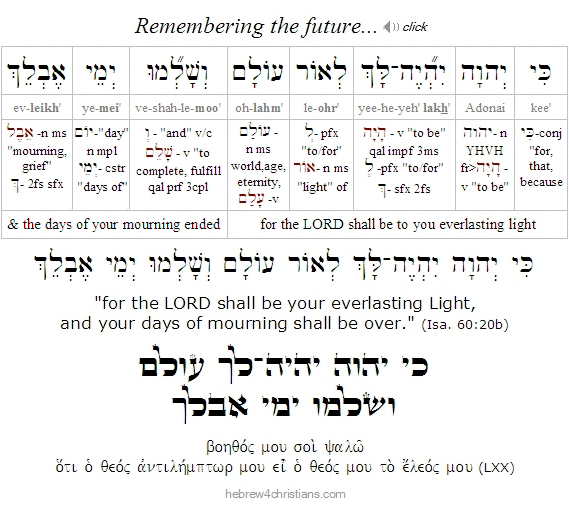 |
Wisdom of the Heart...
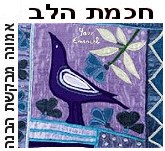
03.04.24 (I Adar 24, 5784) From our Torah portion this week (i.e., Vayakhel) we read: "Let every wise-hearted (חֲכַם־לֵב) among you come and make all that the LORD has commanded" (Exod. 35:10). The sages comment that none of the people actually had the skills to fashion the detailed furnishings and accouterments of the desert sanctuary, but they had something even better – a passionate desire to do God's will, and this enabled them to access God's help to do what was needed. The purpose of the commandment was to involve the heart, to refine the character: "And everyone whose heart moved him brought what was needed..." (Exod. 35:22). God could have created the sanctuary "yesh me'ayin," simply out of nothing, but he wanted the heart of his people to express their desire for his presence in their midst. The same is true for the inner sanctuary of our hearts...
Just as God creates the world in chesed (עוֹלָם חֶסֶד יִבָּנֶה), so the wise of heart are able to build up the sanctuary of God. "Love builds up." Being "wise of heart" (חֲכַם־לֵב) means having emotional maturity, humility, and rightly ordered affections. Such heart wisdom does not depend on how smart you are or what sort of education you might have, but rather whether you are able to emotionally comprehend a situation, whether you are willing to allow the heart to discern the inner meaning of a message. The wise of heart are those who "build up" God's kingdom and help provide sanctuary for others...
The beginning of wisdom is the awe of the LORD (Psalm 111:10), that is, relating to reality with reverence and learning to distinguish what is sacred. Note that God does not build the mishkan directly, but He wants us to bring our hearts and creativity to the task. Practically speaking being chacham-lev (חֲכַם־לֵב), "wise of heart," means knowing what you must do to help reveal divine beauty within your experience of life.
After Moses saw all the work that was done for the building of the Tabernacle, he blessed the people saying, "May it be the will of God that His Presence dwells within the work of your hands" (Exod. 39:33-43; Psalm 90:17). Rashi notes that even if a person feels entirely inadequate for the task, the Torah affirms that he should nevertheless do his or her part. "Every assembly for the sake of heaven must in the end stand" (Avot 4:11). When we apply our hearts to serve God, the Lord will give us the Spirit to empower our way; if we make ourselves his willing vessel, He will fill us to the full.
"Do your best, pray that it's blessed, and God will take care of the rest..." As any good cook knows, the "secret ingredient" for the tastiest food is the love that goes into making it. Likewise in "making a place for God" the most important factor is heartfelt willingness to be present before the Lord -- to show up and say, Hineini Adonai -- "Here I am, O Lord!" We first take the step of faith and then the sea will split and we will be able to walk on through.
Hebrew Lesson
Psalm 90:17 reading (click):
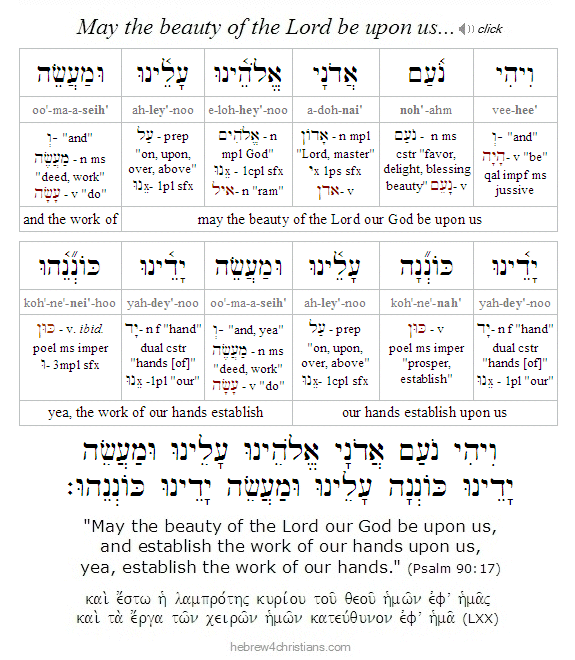 |
Constructing the Tabernacle
Parashat Vayakel...
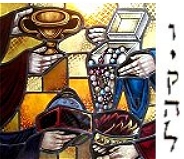
[ The following is related to this week's Torah reading, parashat Vayakhel... ]
03.03.24 (I Adar 23, 5784) According to tradition, Moses descended from Sinai (with the second set of tablets) on Yom Kippur (Tishri 10), and on the following morning he assembled (וַיַּקְהֵל) the people together to explain God's instructions regarding building the Mishkan (i.e., Tabernacle). First, however, Moses reminded the people to observe the Sabbath as a day of rest, and then he asked for contributions of gold, silver, bronze, and other materials for the construction of the sanctuary and its furnishings. Each contribution was to be a "free-will offering" (i.e., nedivah zevach: נְדָבָה זֶבַח) made by those "whose heart so moved him." As a sign of their complete teshuvah (repentance) for the sin of the Golden Calf, the people gave with such generosity that Moses finally had to ask them to stop giving!
Betzalel ben Uril and Oholiav were appointed to be the chief artisans of the Mishkan, and they led a team of others that created the roof coverings, frame, wall panels, and foundation sockets for the tent. They also created the parochet (veil) that separated the Holy Place (ha'kodesh) from the Holy of Holies (kodesh ha'kodeshim). Both the roof and the veil were designed with embroidered cherubim (winged angelic beings). Betzalel then created the mysterious Ark of the Covenant and its cover called the mercy seat (kapporet), which was the sole object that would occupy the innermost chamber of the Holy of Holies. Betzalel also made the three sacred furnishings for the Holy Place – the Table of Bread (shulchan), the lamp (menorah), and the Altar of Incense (mizbe'ach ha'katoret) – as well as the anointing oil that would consecrate these furnishings.
Betzalel then created the Copper Altar for burnt offerings (along with its implements) and the Copper Basin from the mirrors of women who ministered in the entrance of the tent of meeting. He then formed the courtyard by installing the hangings, posts and foundation sockets, and created the three-colored gate that was used to access the courtyard.
Shabbat Shekalim (שבת שקלים)
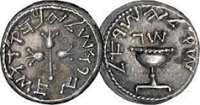
03.03.24 (I Adar 23, 5784) Four special Sabbaths occur just before the start of spring: two before Purim and two before Passover. Collectively, these Sabbaths are called "The Four Shabbatot" (ארבע השבתות) and four additional Torah readings (called Arba Parashiyot, or the "four portions") are read on each of these Sabbaths in preparation for the holidays. The names of these four Sabbaths are Shekalim, Zakhor, Parah, and HaChodesh, respectively.
The first of the four Sabbaths is called Shabbat Shekalim (שבת שקלים), "the Sabbath of the Shekels," which occurs just before the month of Adar begins (or Adar II during leap years). An additional reading (Exod. 30:11-16) is appended to the regular Torah reading that describes the contribution of a half-shekel (i.e., chatzi shekel: חצי שקל) for the construction and upkeep of the Mishkan (Tabernacle). According to various midrashim (i.e., Bavli, Shekalim 1) as well as some classical commentators, the half-shekel is said to represent a "fiery coin" that the LORD brought from underneath the Throne of His Glory to symbolically "atone" for the sin of the Golden Calf. Since every Jew was required to give this "widow's mite," repentance is accepted for all who come in true humility before the LORD. For us, it might be a time to remember those who make personal sacrifices so we might draw closer to God.
Hebrew Lesson
Exodus 30:13a reading:
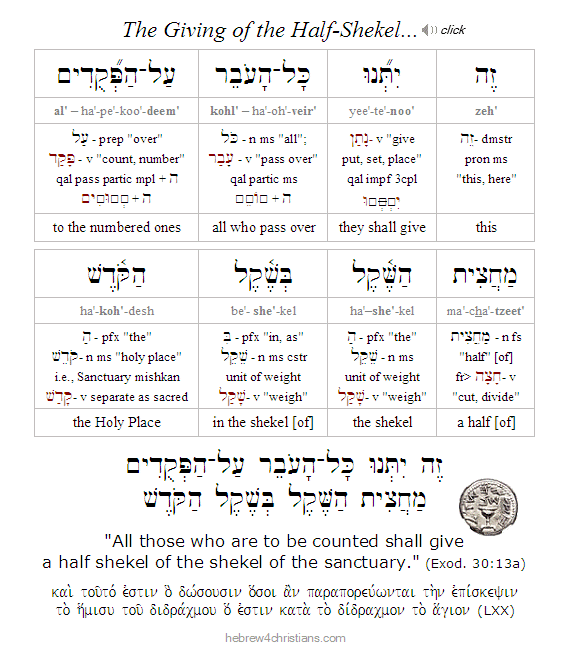 |
Note also that Saturday, March 9th at nightfall marks Rosh Chodesh Adar II (חודש אדר), that is, the "thirteenth" month of the Jewish calendar (counting from the month of Nisan). During Jewish "leap years" an additional month is inserted into the Jewish calendar, and the month of Adar is appended by an additional month called Adar Sheni (or Adar II). From the point of view of the holidays, Adar II is considered the "twelfth month," so the holiday of Purim, for instance, is always celebrated during Adar II during Jewish leap years:
The "Passion" of Moses
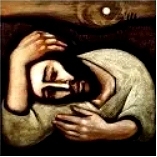
03.01.24 (I Adar 21, 5784) In the solitude of his tent Moses was deeply troubled, even distraught. Undoubtedly he pondered everything in his life that had brought him to this difficult place... Alas, in light of the recent disaster at Sinai, Moses realized he was now at an utter impasse. Would God continue His redemptive plan or was this the end of the great dream? He prayed, he fasted, and he waited for many days and nights...
After languishing some time before the LORD he poignantly appealed to God in hope: "If I have found favor (grace) in your eyes, let me know your ways, that I may know you and continue in your favor" (Exod. 33:13). God responded by reassuring Moses that His Presence would be with him (alone) and that he (alone) would "enter His rest." But Moses protested: "Unless You go in the lead, do not make us leave this place. For how shall it be known that I have found favor in your sight -- I and your people? Is it not in your going with us, so that we are distinct, I and your people, from every other people on the face of the earth?" And the LORD said to Moses, "This very thing that you have spoken I will do, for you have found favor in my sight, and I know you by name" (Exod. 33:15-17). Moses' poignant intercession touched God's heart, causing Him to change from a mode of strict judgment (middat ha-din) to one of mercy and forgiveness (middat ha-rachamim). This was the "gospel" moment at Sinai....
Upon hearing God's words of comfort, Moses was so overcome with joy that he exclaimed: "Oh, let me behold Your Presence!" (Exod. 33:18), whereupon God answered, "I will make all My goodness pass before you, and I will proclaim before you the name LORD (יהוה), and I will be gracious to whom I will be gracious, and will show mercy on whom I will show mercy" (Exod. 33:19, cp. Rom. 9:15). Note that Moses would receive the revelation of the Name when he "stands upon the Rock" (Exod. 33:21).
The LORD then instructed Moses to carve a new set of tablets and to meet him again at the place (i.e., makom: מָקוֹם) on the top of Sinai, where He would descend in the cloud to "declare His Name" (Exod. 33:17-34:7). This dramatic experience of revelation was later called middot ha-rachamim (מדות הרחמים) or the revelation of the attributes (or "measures") of God's mercy, and was considered a divine "addendum" to the original covenant terms. Rabbinic tradition later incorporated the recitation of middot ha-rachamim into the Yom Kippur service.
Hebrew Lesson
Exodus 34:6 reading (click for audio):
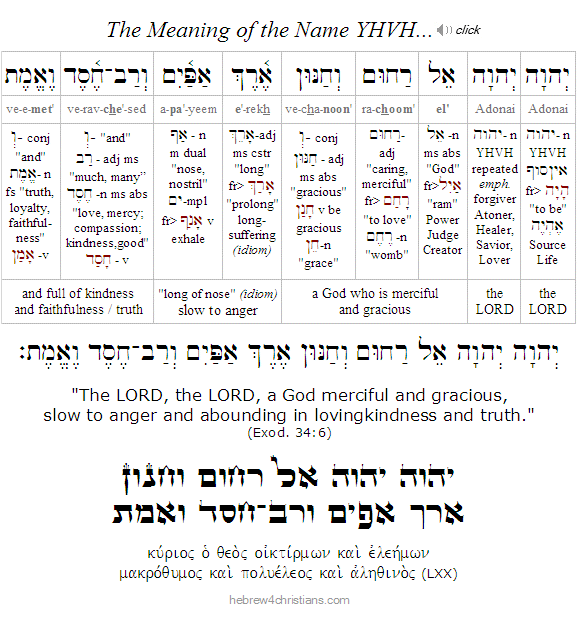 |
So what are some of these attributes? Note first that the LORD calls himself rachum v'chanun (רַחוּם וְחַנּוּן), often translated "merciful and gracious." The noun rechem (רֶחֶם) means "womb" in Hebrew, indicating that God's compassion is like a mother's deep love for her child. The word chanun (חַנּוּן) comes from the word for grace or favor (i.e., chen: חֵן), and indicates that God is a graceful giver who is favorably disposed to help those in need. The LORD is compassionate to those who call upon Him.
The phrase erekh apayim (אֶרֶךְ אַפַּיִם) literally means "long of nose," an idiom used to describe someone who is patient and slow to anger, i.e., "longsuffering" (Prov. 14:29), one who inhales slowly and with equanimity. The word chesed (חֶסֶד), is often translated as "lovingkindess" or "steadfast love," and implies devotion and fidelity. God describes Himself as rav chesed v'emet (רַב־חֶסֶד וֶאֱמֶת), that is abundant in His kindness and faithful love.
It is fascinating to see that this revelation prefigures the New Covenant (הברית החדשה) that was given to Israel. Just as the first set of tablets, based as they were on the justice and holiness of God, were broken, so a second set was given based on the middot (attributes) of the LORD's mercy and grace. Indeed, Yeshua was broken on behalf of the law but was raised again so that all who trust in Him can truly understand that God is "merciful and gracious, slow to anger and abounding in steadfast love and truth" (Exod. 34:6, Psalm 86:15, 103:8).
It can be readily argued that the revelation of the Name YHVH (Exod. 34:5-7) was a "gospel" moment for Israel. The episode of the Golden Calf revealed that the Jews were unable to keep the law, even though they personally experienced the power of God's deliverance from Egypt and His ongoing care on the way to Sinai. Despite the judgments brought upon Egypt, despite the overthrow of Pharaoh and his armies in the sea, despite the bitter waters made sweet, despite the manna from heaven, despite the miraculous well of Miriam, despite the awesome revelation at Sinai, and despite the pledge of the Israelites: kol asher diber Adonai na'aseh v'nishma, "All that the LORD has spoken we will do, and we will be obedient" (Exod. 19:8; 24:7), the Sin of the Golden Calf revealed that something more was needed, and that the law itself was insufficient to change the inner heart of man (Rom. 3:20). The intercession of Moses on behalf of Israel - his willingness to die on behalf of the people - revealed the heart of the New Covenant (בְּרִית חֲדָשָׁה) of the LORD, the deeper revelation of the God's character of mercy and grace. Apart from God's gracious love and compassion, the law by itself rendered only the righteous verdict of death for Israel...
For more, see "God's Stubborn Love: Further thoughts on Parashat Ki Tisa."
Shabbat shalom and love and blessings be upon you, friend...
The Cleft of the Rock...
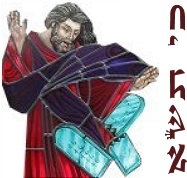
03.01.24 (I Adar 21, 5784) When Moses asked the LORD, hareini na et-kevodekha - "Please show me your glory" (Exod. 33:18), the sages said he wanted to reconcile God's supreme power and goodness despite the prevalence of evil in the world. God answered, "I will make all my goodness pass before you, and I will proclaim before you my name the LORD (יְהוָה)... but," he said, "you cannot see my face, for man shall not see me and live" (Exod. 33:19-20).
The early sages interpreted God's answer to mean that once we encounter God's goodness and love (defined by the essential name י־ה־ו־ה), we must trust that what is beyond our understanding nevertheless works for our ultimate good, even if its purpose may be unknown to us at the present time (Rom. 8:28). The LORD said both: "I will make my goodness manifest to you," and "you cannot see me and live," which means that we "see through a glass darkly" as we sojourn through this world (1 Cor. 13:12). God manifests yet still we can't fully see...
In this life you may stand near God in the "cleft of the rock," on the very mountaintop of revelation, but you will still be in a cloud of unknowing (Exod. 33:22-23). Nevertheless God promises to "shelter you with his hand"; he will provide you a place of refuge and the strength to keep trusting despite incomprehensible times of testing...
Hebrew Lesson
Exodus 33:22b reading (click for audio):
There is an opinion in the Talmud that says Moses was the author of the Book of Job, the ancient story that investigates why the righteous suffer (Bava Batra 15a). At the end of the book, God answers Job from the midst of a whirlwind, reminding him that while people can't comprehend His ways, he is the nevertheless the Source of all goodness and truth in the universe. After Job hears God speak, he says, "Behold, I am of small account; what shall I answer you? I lay my hand on my mouth... I know that you can do all things, and that no purpose of yours can be thwarted. I have uttered what I did not understand, things too wonderful for me, which I did not know. I had heard of you by the hearing of the ear, but now my eye sees you; therefore I despise myself, and repent in dust and ashes" (Job 40:4, 42:2-3,5-6). Both Job and Moses realized that trusting in the love of God is the key to accepting all other experiences that might befall him...
Note that God said that "no man can see My face and live" (Exod. 33:20), and yet Moses spoke with God "face to face" (Deut. 34:10). We reconcile this by understanding "face to face" (פָּנִים אֶל־פָּנִים) to be an idiom that means "intimately," or "personally," that is, without the use of mediators or outside agents. Nevertheless the "face of God" was disclosed in the advent of Yeshua, as it is written: "No one has ever seen God; the only begotten God (μονογενὴς θεὸς), the One who is in the heart of the Father (ὁ ὢν εἰς τὸν κόλπον τοῦ πατρὸς), has made him known" (John 1:18). Yeshua is the "image of the invisible God" (εἰκὼν τοῦ θεοῦ τοῦ ἀοράτου) who reveals the meaning of the Father (John 14:9). As it is written, "God who said, "Let light shine out of darkness," has shone in our hearts to give the light of the knowledge of the glory of God in the face of Yeshua the Messiah" (2 Cor. 4:6). Our Savior is "the radiance of the glory of God and the representation of his essence (χαρακτὴρ τῆς ὑποστάσεως αὐτοῦ), the One who upholds the universe by the word of his power" (Heb. 1:3). All this is very mysterious, of course: the Infinite enters the realm of the finite; God is revealed yet concealed; he is made known yet beyond our understanding. Indeed, the very One who entered the "leper colony of the world" and willingly died on the cross for our meanness and sin is none other than "the blessed and only Sovereign, the King of kings and Lord of lords, who alone has immortality, who dwells in unapproachable light (φῶς οἰκῶν ἀπρόσιτον), whom no one has ever seen or can see" (1 Tim. 6:15-16).
That Yeshua dwells in "unapproachable light" recalls the story of the Roman emperor who once asked Rabbi Joshua if the universe had a ruler. The sage answered, indeed, the LORD is the Creator of all things, as it is written, "In the beginning, God created the heavens and the earth." The emperor then asked, "Why is God not like the emperor of Rome, who is seen twice a year so that people may know and worship him?" Rabbi Joshua said that unlike human kings, the LORD was too powerful for people to see; as it is written in the Torah: "No person shall see Me and live." The emperor was skeptical, however, and insisted that unless he could see God, he would be unable to believe. Joshua then pointed to the sun high in the sky: "Look into the sun and you will see God." The emperor tried to look into the sun, but was forced to cover his eyes to keep them from burning: "I cannot look into the sun," he said. Joshua then replied: "Listen to yourself: If you cannot look into the sun which is but one of God's creations, how can you expect to look at God?" (Sefer HaAggadah).
It is interesting to compare this story with another... Lev Tolstoy tells the parable of an old cobbler who despaired of life and yearned to finally see God. In a dream one night a heavenly voice told that he would see God's face the very next day. The cobbler began the day on the alert, hoping to catch a glimpse of God, but he was distracted when he encountered a needy family. They were cold and desperate, so he took them in and cared for them. The day passed and as he finally laid down to sleep, the cobbler realized he had completely forgotten to look for God. He apologized to God and once again asked to die... As he fell asleep he dreamed that he saw the family he had helped walking by when the heavenly voice then said, "Rest assured: you saw God today in the faces of those you helped." "Truly, as you did it to one of the least of these, you did it to me" (Matt. 25:40).
 |
|









































